
Cash Passport™ Platinum Mastercard® – The smarter way to travel
Order now Quick reload

Cash Passport Platinum Mastercard
11 currencies, locked in rates~.
Lock in exchange rates each time you load and reload. Load up to 11 different currencies on one card: USD, EUR, GBP, NZD, THB, CAD, HKD, SGD, JPY, AED and AUD.
No load fees
$0 initial load fee and $0 card issue fee. Travel fluently with no fees when ordering your Cash Passport Platinum.
Accepted at millions of locations
Use your card anywhere Mastercard is accepted, worldwide – in-store, online, or to withdraw local currency at ATMs
24/7 Global Assistance+
Help is only a call away, whenever and wherever you are. If your card is lost, stolen or damaged, we can replace it quickly or provide you with emergency cash.
Today's exchange rates*
Running low on travel money.
Cash Passport Platinum is reloadable, allowing you to top-up any of your currencies, anywhere, anytime.
You can reload online in three ways:
- Transfer funds from Debit Card (instant)
- Bank transfer (1 business day)
- BPAY (up to 2 business days)
If you purchase your card in-store, you can reload in-person at your original place of purchase.
Keep track of your travel money
You can use your mobile, tablet, laptop or PC to login to 'My Account' and stay in control of your travel money.
Register for 'My Account', so you can:
- Track your spending
- Reload your card
- Transfer between currencies
- Retrieve your PIN number
- Suspend your card temporarily
- Cash out your remaining balance
You can also download the Cash Passport mobile app, available for iOS and Android devices.
Stop lining up, start experiencing more
Enjoy the freedom of ultra-fast contactless payments, with Tap & Go at retail stores, restaurants, convenience stores and more.
Wherever you see the universal contactless symbol, your Cash Passport Platinum is ready to go .
Traveling to London? You can even use your Cash Passport Platinum to tap on and off the London Tube, never having to line up again.
Travel with confidence
Spend securely as your Cash Passport Platinum is protected by CHIP and PIN.
Cash Passport Platinum is secured by Mastercard Zero Liability protecting you against unauthorised and fraudulent transactions, should your card ever be reported lost or stolen.
We're here to help
We're only a call or email away at all times. Our global assistance team will help you if your card is lost, stolen or damaged.
We can replace your card quickly or provide you with access to emergency cash, so you can keep enjoying your holiday.
Need further help?
View our frequently asked questions or feel free to contact us .

Platinum benefits
- Register a flight – Go to Flight Delay Pass to register with your name, flight details, email and mobile number. The flight registration must take place no later than the flight's scheduled departure time
- Flight monitoring – Mastercard tracks flight status and sends you an email and SMS with your lounge passes when a flight is delayed more than 2 hours
- Redeem lounge visit – Simply flash the lounge pass sent by Mastercard Flight Delay Pass to gain lounge access
Get your Cash Passport (fast!)
Order online.
Select your currencies and verify your identity using your Australian driver’s license or Australian passport.
Make payment
Pay for your initial load instantly with Debit Card. Don’t have a debit card? We also accept BPAY.
Get your card
Upon receiving your load, your card will be immediately dispatched to your home address within 3 business days.
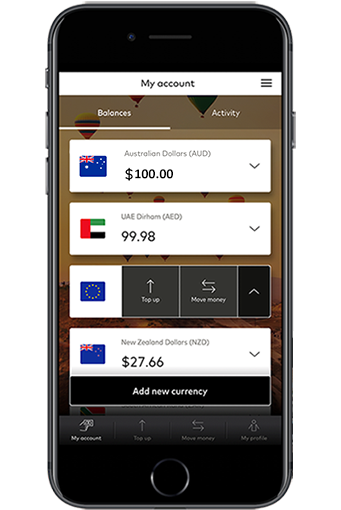
Cash Passport™ app
The Cash Passport app makes managing your travel money faster, easier and even more secure.
Get fast and easy access to your Cash Passport app by using Touch ID. The new fingerprint recognition feature operates using highly secure biometrics and is an easy alternative to using your online password. Even lock or unlock a misplaced card for added protection.
Be smart about your money. Monitor all of your activity, whether you’re reloading or transferring funds, it’s all accounted for here in one simple, secure place allowing you to stay up to date with transactions and card spending. Plus includes integrated support screen for frequently asked questions.
Move money between your currencies with just a couple of taps – it’s that simple! Quickly move money between 11 currencies, including EUR, USD, SGD, CAD and GBP and spend more time enjoying your holiday.
Eco certified cards
Concerned about your environmental impact?
The Cash Passport Platinum card is made from 100% recycled PVC. You’ll know your helping to reduce the environmental impact of your wallet when you see the Card Eco Certification imprint on your Cash Passport card.
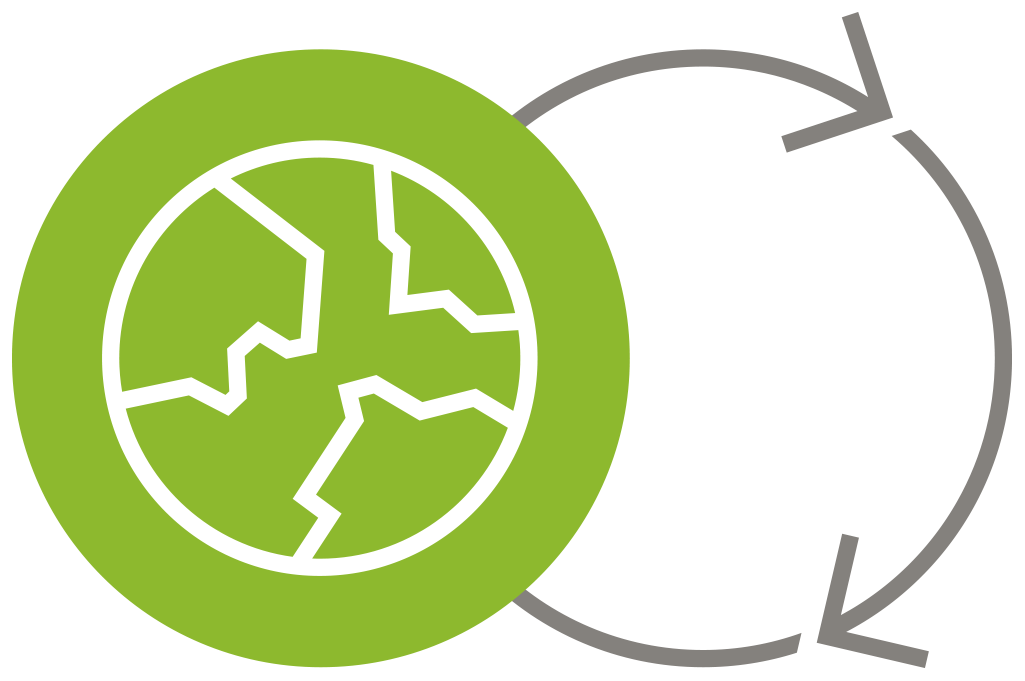
Mastercard established its sustainability efforts more than a decade ago, and continues to develop programs that help consumers contribute to the future of the planet, such as the Priceless Planet Coalition
Mastercard Prepaid Management Services Australia Pty Ltd (ABN 47 145 452 044, AFSL 386 837) arranges for the issue of the Multi-currency Cash Passport™ (“Cash Passport”) and Cash Passport™ Platinum Mastercard® (“Cash Passport Platinum”) in conjunction with the issuer, EML Payment Solutions Limited ('EML') ABN 30 131 436 532 , AFSL 404131 . You should consider the Product Disclosure Statement for the relevant Cash Passport facility available at www.cashpassport.com.au before deciding to acquire the products. Any advice does not take into account your personal needs, financial circumstances or objectives and you should consider if it is appropriate for you.
Mastercard and the circles design are registered trademarks of Mastercard International Incorporated.
~ Lock in your exchange rates means the exchange rate is locked in for the initial load only. The exchange rates for subsequent reloads will be set at the prevailing exchange rate at the time of the transaction.
*The prevailing exchange rate is locked in for the initial load value only. Subsequent card reloads will be processed at the then prevailing exchange rate on the day of the reload transaction, and will be locked in at that rate. The exchange rates set out in this website apply to reload transactions that are booked on this website only and that are settled within four hours. Different exchange rates will apply to cards which have not been purchased on this website and initial card load and reload transactions in our partner branch locations. We will provide you with settlement instructions and the applicable exchange rate at the time you book a reload transaction. Different exchange rates will also apply to reload transactions that are conducted directly via Bank Transfer or BPAY (i.e. without booking an online transaction). For more information on how we set exchange rates please see the Product Disclosure Statement .
+ T&Cs apply. Customer must contact Customer service to report lost or stolen card. Emergency cash can be arranged up to the balance on your Cash Passport, subject to availability of funds at the approved agent location.
# Flight Delay Pass is provided to you on the basis you are not in breach of Cash Passport MasterCard® Product Disclosure Statement and Terms & Conditions and your card remains open. It must not be sold in any way and Mastercard reserves the right to cancel the pass that are in breach of this policy. Access may not be available if the applicable lounge is full or near capacity at the full discretion of lounge staff. Access and use of the lounges is subject to its own terms and conditions. Mastercard reserves its right to amend or withdraw the Flight Delay Pass at any time and where possible, provide prior notice to you. Visit here for Terms and Conditions
Today’s exchange rates*
- Join CHOICE
Travel money cards with the lowest fees
We look at seven travel money cards from the big banks and airlines..
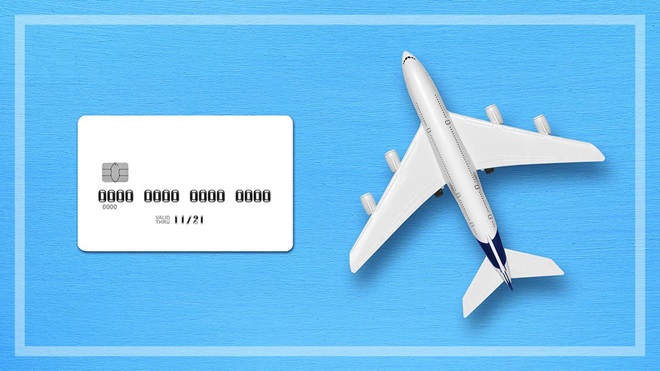
Prepaid travel money cards are offered by major banks, airlines and foreign exchange retailers like Travelex. Before travelling overseas, you load money into the card account, which locks in the exchange rate for foreign currencies at that time.
You can then use the card for purchases and cash withdrawals just like a debit or credit card, usually wherever Visa and Mastercard are accepted.
You can reload money on-the-go via an app or website, and if the card is lost or stolen, it can be replaced (usually at no cost to you).
Prepaid travel money cards also give you assurance that you're not handing the details of your everyday banking account to merchants you're not familiar with, and they provide easy access to cash when you want some, says Peter Marshall, head of research at money comparison website Mozo .
CHOICE tip: Travel money cards are best for longer trips. They're usually not worth your while if you're only taking a short trip, as some have closure, cash out and inactivity fees.
Travel money card fees
A major difference between prepaid travel cards and debit or credit cards is their fees. Some costs aren't immediately apparent, such as hefty margins built into the exchange rates.
And although fees have come down since we looked at these cards two years ago, you still need to watch out for:
- fees to load the card – either a percentage of the total or a flat fee
- ATM withdrawal fees
- a cross currency fee or margin when you use the card in a currency you haven't preloaded
- further fees if you close the account or haven't used the card for a period of time.
Travel money card with the lowest fees and best exchange rate
Westpac worldwide wallet.
Westpac closed its Global Currency Card in July 2021 and offers its new card in partnership with Mastercard. It's also available from Bank of Melbourne and BankSA.
Currencies: AUD, USD, NZD, EUR, GBP, SGD, THB, JPY, HKD, CAD, ZAR.
Key features:
- No loading, reloading, closing or inactivity fees.
- Free to use it in network ATMs in Australia and partner ATMs overseas in a range of countries including the UK, US and New Zealand.
- A charge applies at non-Westpac and non-partner ATMs in Australia and overseas.
- Best exchange rates for the US dollar, the Euro and GBP in our comparison.*
- The only card that lets you preload the South African rand.
Other travel money cards
Next to the Westpac Worldwide Wallet, there are six other travel money cards available.
Australia Post Travel Platinum Mastercard
Available online or at post offices.
Currencies : AUD, USD, NZD, EUR, GBP, SGD, THB, JPY, HKD, CAD, AED.
- Fee to reload the card via BPay, debit card or instore, but free via online bank transfer.
- Closure fee.
- Fees for ATM withdrawals in Australia and overseas.
Cash Passport Platinum Mastercard
It's issued by Heritage Bank and is available online and from a number of smaller banks and credit unions (like Bendigo Bank and Bank of Queensland) as well as travel agents.
- Fee to reload with a debit card or instore, but free via BPay.
CommBank Travel Money Card
CommBank Travel Money Card (Visa)
As NAB and ANZ have closed their travel money cards, this is the only other travel money card available from a major bank. This card has the largest variety of currencies that can be preloaded.
Currencies : AUD, USD, NZD, EUR, GBP, SGD, THB, JPY, HKD, CAD, AED, VND, CNY.
- Fee if you make a purchase with currencies not preloaded.
- Fee for withdrawals at overseas ATMs.
Qantas Travel Money Card
Qantas Travel Money Card (Mastercard)
The only travel money card offering from an airline. It can be added as a feature to your Qantas Frequent Flyer card, so you don't need a dedicated card, and you can earn points using it.
- Free to reload via bank transfer or BPay, but there's a reload fee if using debit card.
Travelex Money Card
Travelex Money Card (Mastercard)
Travelex is an international foreign exchange retailer. In Australia, it operates more than 140 stores at major airports and shopping centres, across CBDs and in the suburbs. It was the card with the best exchange rate for New Zealand dollars.*
Currencies : AUD, USD, NZD, EUR, GBP, SGD, THB, JPY, HKD, CAD.
Fees :
- Load fee instore, but free via Travelex website or app.
- Reload fee instore or via BPay, but free via Travelex website or app.
- Closure fee and monthly inactivity fee (if not used for 12 months).
Travel Money Oz Currency Pass
Travel Money Oz Currency Pass (Mastercard)
The Travel Money Group is owned by Flight Centre and is a foreign exchange retailer.
- Reloading the card via an online bank transfer or instore is free, but there's a fee if you reload via BPay, debit card or credit card.
- Cash out (closure) fee.
Travel money card tips
- Make sure the card allows the currencies you'll need, and also consider stopovers. For example, the South African rand is only supported by the Westpac card.
- Try to load your card with the right currencies and amounts on days with good exchange rates.
- Make sure you know how to reload your card if you run out of funds while overseas.
- It may be more convenient to choose a card that has an app that can be linked to your bank account.
- Avoid loading more money than you'll need as there may be fees and exchange rate margins to get the unused money back.
- Remember to cancel the card once you're finished your trip, especially if it has inactivity fees.
- Be mindful that you still may need a credit card, as travel money cards may not be accepted as security for hotels and car rental agencies.
Stock images: Getty, unless otherwise stated.
Join the conversation
To share your thoughts or ask a question, visit the CHOICE Community forum.
- United States
- United Kingdom
In this guide
- Our verdict
Product details
Eligibility, how to apply, card benefits.
- Rates & fees
Your reviews
Ask a question, macquarie platinum credit card.
Offers no foreign transaction fees, complimentary travel insurance and a 24/7 concierge service, with a $99 p.a. annual fee.
- 0% international transaction fees
- Up to 55 days interest-free on purchases
- Up to 4 additional cardholders at no extra cost
- Relatively high purchase rate of 20.7% p.a.
The Macquarie Platinum Credit Card offers up to 55 days interest-free on purchases if you repay the total amount listed on your statement by the due date. Otherwise, a 20.7% p.a. interest rate applies to purchases.
Macquarie Bank credit cards are currently only available as part of a Macquarie home loan package or for Macquarie Private Bank or Business Bank clients that meet certain criteria. You'll also need to meet the following eligibility requirements and have all the required documents and details to complete your application.
Eligibility criteria
- Minimum income. You must have a taxable income of at least $50,000 p.a.
- Residency. You must be an Australian citizen or permanent resident.
- Credit rating. You must have a good credit rating.
- Age. You must be at least 18 years old to apply.
Required documents
- Personal details. This includes your full name, date of birth, email address, phone number, residential address, marital status and number of dependents. You also need to provide a valid form of ID, such as your driver's licence number.
- Employment details. This includes your salary, job title, length of employment, your employer's contact details. You may also need to provide supporting documentation, such as recent payslips.
- Financial details. As well as any other forms of income, you need to provide details of your assets, such as savings, as well as existing credit cards, loans and other debts. You also need to give an estimate of your share of regular household expenses, including rent or mortgage payments, utility bills and groceries.
- 0% foreign transaction fees. The Macquarie Platinum credit card can save you money with 0% foreign transaction fees on overseas and online purchases made in a foreign currency.
- Macquarie Rewards program. This card offers 1.25 points per $1 on eligible purchases for spending of up to $200,000 per year. Eligible transactions cover most everyday transactions including groceries, petrol, dining, travel bookings and retail purchases. Transactions that don't earn points include cash advances and BPAY payments. The Macquarie Reward points you earn can be redeemed for eGift cards or cashback via the Macquarie Mobile Banking app or Macquarie online.
- Complimentary overseas travel insurance. Get access to comprehensive overseas travel insurance for you, your spouse and any eligible dependents travelling with you when you pay for your return travel tickets with the Macquarie Platinum and/or through Macquarie Reward redemptions. You'll also be eligible for complimentary transit accident insurance on overseas trips when you meet these requirements.
- Complimentary interstate flight inconvenience insurance. This card offers complimentary cover for domestic flight cancellations when you use it to book eligible return flights.
- Complimentary insurance for purchases. Eligible purchases made with this card get up to 90 days cover against theft, loss or damage. You can also get buyer's advantage cover for up to 12 months on eligible items.
- 24/7 concierge service. Get professional assistance with a range of tasks, such as making restaurant reservations, travel planning or even finding the perfect gift for a loved one.
- Security. This account offers 24/7 security monitoring and Visa's Zero Liability policy for fraudulent transactions.
- Visa Offers + Perks. Get access to exclusive travel, shopping, dining and entertainment offers around the world by visiting the Visa Australia website.
- Mobile payments. Make payments straight from your compatible phone or device by adding this card to your Apple Pay , Google Pay , Fitbit Pay or Garmin Pay accounts.
Rates & fees
- Annual fee. This card charges an annual fee of $99 p.a.
- Purchase rate. The 20.7% p.a. interest rate on this card is similar to the purchase rates of other rewards cards .
- Interest-free days. Receive up to 55 interest-free days on purchases when you repay your balance in full by the due date on your statement.
- Cash advances. If you use this card to make cash advance transactions, an interest rate of 20.7% p.a. will apply from the date of the transaction. A cash advance fee of $5 or 3% of the value of the transaction (whichever is greater) also applies to each cash advance you make.
- Additional cardholders. You can add up to 4 additional cards at no extra cost.
- Macquarie Platinum Credit Card information PDF
- Macquarie Platinum Credit Card TMD
To ask a question simply log in via your email or create an account .
Hi there, looking for more information? Ask us a question.
Error label
You are about to post a question on finder.com.au :
- Do not enter personal information (eg. surname, phone number, bank details) as your question will be made public
- finder.com.au is a financial comparison and information service, not a bank or product provider
- We cannot provide you with personal advice or recommendations
- Your answer might already be waiting – check previous questions below to see if yours has already been asked
Finder only provides general advice and factual information, so consider your own circumstances, or seek advice before you decide to act on our content. By submitting a question, you're accepting our 1. Terms Of Service and 6. Finder Group Privacy & Cookies Policy .
This site is protected by reCAPTCHA and the Privacy Policy and Terms of Service apply.
October 25, 2016
Is there a cap on points per month or year? Which airlines can points be transferred to? How many visits to airport lounges per year and which lounge is available for use?
Anndy Lou Finder
October 27, 2016
Thanks for your questions.
For Macquarie Platinum Card, there is a yearly cap of 250,000 rewards points.
Unfortunately, the Macquarie Platinum Card does not offer complimentary airport lounge access. The points also can’t be transferred to any frequent flyer program.
Cheers, Anndy
September 20, 2016
Am I able to balance transfer from a card not under my name? I also used to have a jetstar card from last year is the balance transfer offer still available to me?
Arra Salas Finder
Thanks for your inquiry.
To answer your first question, balance transfer between two people’s names is allowed by Macquarie Bank according to our balance transfer criteria guide .
However, please take note that balance transfer is not possible between any account issued by Macquarie Bank and your account. It has to come from another bank or financial institution for the transfer to be accepted.
For your next question, yes, the balance transfer offer is still available. However, the application for the Macquarie Platinum credit card is currently not available on our site. Should you wish to proceed with the application, you’ll need to visit the Macquarie Bank’s website.
I hope this has helped.
Cheers, Arra
December 27, 2015
Does the new Macqaurie Bank Black card offer airport lounge access passes
December 28, 2015
The Macquarie Bank Black Card does not offer complimentary airport lounge access.
We have a range of credit cards with free airport lounge access to compare. You can press the “Go to site” button of your preferred credit card to proceed with your application. You can also contact the provider if you have specific inquiries.
A gentle reminder, please ensure to read through the relevant product disclosure statement and terms and conditions to ensure that you got everything covered before you apply for the credit card.
I hope this helps.
Cheers, Ysa
January 30, 2015
Can I deposit money into my credit card to make payment into the card account
Jonathan Finder
Thanks for your inquiry!
Deposits into the account are available by the following methods; BPAY, Cheque, Direct Debit, Phone banking, Internet banking transfers, In branch and mail.
I hope this helps!
February 05, 2012
how to apply this credit cad
Jeremy Finder
March 08, 2012
This card is currently not available for application. Thanks.
Cheers, Jeremy

Amy Bradney-George
Amy Bradney-George was the senior writer for credit cards at Finder, and editorial lead for Finder Green. She has over 16 years of editorial experience and has been featured in publications including ABC News, Money Magazine and The Sydney Morning Herald. See full profile
- Best Credit Cards
- Balance Transfer Cards
- Rewards Credit Cards
- Cashback Offers
- Low Interest Rate
- No Annual Fee
- 0% Foreign Fees
- Student Credit Cards
- Credit Union Credit Cards
- Introductory Offers
- American Express
- Bank Australia
- Bank of Melbourne
- Bank of Queensland
- Bendigo Bank
- Great Southern Bank
- Heritage Bank
- Kogan Money
- Australian Military Bank
- Community First
- Latitude Financial Services
- Macquarie Bank
- Newcastle Permanent
- Qantas Frequent Flyer
- Qantas Money
- Suncorp Bank
- Virgin Money
- View all providers
How likely would you be to recommend finder to a friend or colleague?
Our goal is to create the best possible product, and your thoughts, ideas and suggestions play a major role in helping us identify opportunities to improve.
Important information about this website
Advertiser disclosure.
finder.com.au is one of Australia's leading comparison websites. We are committed to our readers and stands by our editorial principles
We try to take an open and transparent approach and provide a broad-based comparison service. However, you should be aware that while we are an independently owned service, our comparison service does not include all providers or all products available in the market.
Some product issuers may provide products or offer services through multiple brands, associated companies or different labeling arrangements. This can make it difficult for consumers to compare alternatives or identify the companies behind the products. However, we aim to provide information to enable consumers to understand these issues.
How we make money
We make money by featuring products on our site. Compensation received from the providers featured on our site can influence which products we write about as well as where and how products appear on our page, but the order or placement of these products does not influence our assessment or opinions of them, nor is it an endorsement or recommendation for them.
Products marked as 'Top Pick', 'Promoted' or 'Advertisement' are prominently displayed either as a result of a commercial advertising arrangement or to highlight a particular product, provider or feature. Finder may receive remuneration from the Provider if you click on the related link, purchase or enquire about the product. Finder's decision to show a 'promoted' product is neither a recommendation that the product is appropriate for you nor an indication that the product is the best in its category. We encourage you to use the tools and information we provide to compare your options.
Where our site links to particular products or displays 'Go to site' buttons, we may receive a commission, referral fee or payment when you click on those buttons or apply for a product. You can learn more about how we make money .
Sorting and Ranking Products
When products are grouped in a table or list, the order in which they are initially sorted may be influenced by a range of factors including price, fees and discounts; commercial partnerships; product features; and brand popularity. We provide tools so you can sort and filter these lists to highlight features that matter to you.
Terms of Service and Privacy Policy
Please read our website terms of use and privacy policy for more information about our services and our approach to privacy.

based on 407 Macquarie product reviews as rated by Mozo community
Macquarie debit cards
Macquarie debit cards offer a range of features for different needs - from everyday use in Australia to your next overseas holiday. Macquarie were even recognised in the 2023 Mozo Experts Choice Awards for Travel Money Cards , taking out multiple awards in four categories.
Check out our range of debit cards for an overview of interest rates, fees and more. Or you can compare with our debit card comparison tools.
Macquarie offers the following debit cards
Who we are and how we get paid.
Our goal at Mozo is to help you make smart financial decisions and our award-winning comparison tools and services are provided free of charge. As a marketplace business, we do earn money from advertising and this page features products with Go To Site links and/or other paid links where the provider pays us a fee if you go to their site from ours, or you take out a product with them. You do not pay any extra for using our service.
We are proud of the tools and information we provide and unlike some other comparison sites, we also include the option to search all the products in our database, regardless of whether we have a commercial relationship with the providers of those products or not.
'Sponsored', 'Hot deal' and 'Featured Product' labels denote products where the provider has paid to advertise more prominently.
'Mozo sort order' refers to the initial sort order and is not intended in any way to imply that particular products are better than others. You can easily change the sort order of the products displayed on the page.
We don't have any reviews of Macquarie, be the first to write one
There are no ratings yet for Macquarie debit cards.
Debit card quick links
- Compare more debit cards
- Debit card guides
- Student debit cards
Important information on terms, conditions and sub-limits
Terms, conditions, exclusions, limits and sub-limits may apply to any of the insurance products shown on the Mozo website. These terms, conditions, exclusions, limits and sub-limits could affect the level of benefits and cover available under any of the insurance products shown on the Mozo website. Please refer to the relevant Product Disclosure Statement and the Target Market Determination on the provider's website for further information before making any decisions about an insurance product.
The Best Travel Debit Cards for Australians In 2024
Tom Goward | 27/03/2024
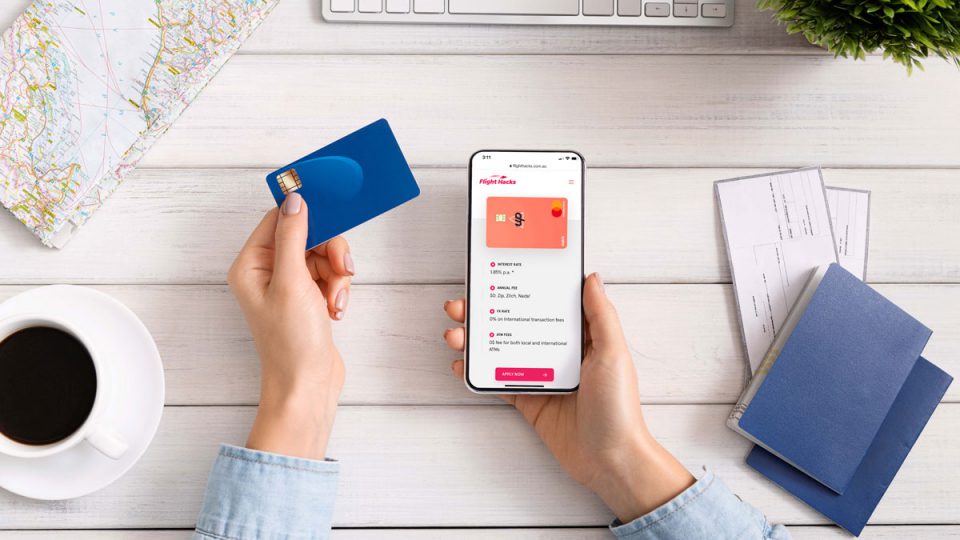
TLDR ; our experts rated Up ($15 free bonus), Ubank ($10 free on with code C7N1TAZ ) & Revolut (Free $15 exclusive Flight Hacks bonus) as the best travel debit cards for 2024.
No matter where you’re going or for how long, making use of a good travel debit card is one of the easiest ways to save money overseas. The problem is that amidst the excitement, the importance of selecting the best travel debit card often slips the minds of many Australians until the eleventh hour. Most novice travellers fail to realise their mistake until arriving home with an overstuffed suitcase and card fees that could’ve been easily avoided.
The harsh reality is that banks and airport currency exchange services will often rip you off, despite their claims of ‘zero fees’ or ‘0% commission’. Think about it, how can an exchange booth afford the insane airport rent if they don’t make a cent from running their business?!
The good news is that Australians have a few brilliant options when it comes time to select a travel money card. While the array of choices can be overwhelming, with a little research and planning, you can save a considerable sum just by using the right card!
WATCH: our video comparing 11 of the most popular travel cards in Australia!
In this post:
What About Prepaid Travel-Branded Cards?
Foreign exchange rates: visa vs mastercard, making a €500 card purchase, withdrawing €500 from an atm, up debit card, ubank debit card, revolut australia, macquarie transaction account, hsbc everyday global account, wise multi-currency account, honourable mentions – best travel debit card, qantas travel money, commbank travel money, travelex money card, nab visa debit, anz plus transaction account, westpac travel money, ing orange everyday, summing up: our expert tips, travel debit cards faqs, global spending: travel debit card 101.
Many amateur travellers will use their day-to-day debit card overseas, simply because it’s easy to use a card that already has your money loaded and ready to go. But before tapping away, it’s important to understand the fees you’ll be in for.
When making international purchases, there are three main fees you should understand;
- International Transaction Rate: Charged when you make a purchase with an overseas merchant, often as a percentage of the total transaction. In Australia, many banks charge a foreign transaction fee of 3% or higher.
- Overseas ATM Withdrawal Fee: Charged for the privilege of withdrawing your own money at an overseas ATM, typically a fixed dollar amount per withdrawal. Sometimes the ATM operator will charge an additional fee for using their ATM. How fun!
- Foreign Exchange Markup: This is where banks are especially sneaky. While you might think you’re getting the real exchange rate, like you’d see searching Google or XE, banks will make up their own rate which includes a hidden fee on top. Of course, you will only be shown the ‘final price’ to hide the fee applied to the real rate.
If you’ve been looking for the perfect card to use overseas, you would have seen big banks and loyalty schemes offering travel money cards. But just because your day-to-day bank offers a dedicated travel card, it doesn’t mean you should get one. In fact, if a card has the word “travel” as part of its name, RUN AWAY while you still can. That is, unless you like being shafted by some of the richest companies in Australia.
Prepaid options like the Commbank Travel Money Card and Qantas Travel Money Card typically offer a portal where you can preload a foreign currency, before arriving at your destination. While it might sound logical to have your money in the correct currency before payment, the fees involved can be astronomical. Despite the promise of “fee-free load options”, there’s almost always a huge foreign exchange markup when you send Australian Dollars to a prepaid card.
The other downside is that you’re forced to lock-in the exchange rate when loading Australian Dollars. While this is marketed as a perk, it’s also a potential disaster if the exchange rate moves against you, after you’ve transferred your entire spending money across. So, unless you have a crystal ball that predicts when the exchange rate is best, I wouldn’t see it as a benefit myself.
Although Visa and Mastercard don’t offer cards themselves, they do have a say in determining the foreign exchange rate you’ll get. While prepaid cards devise their own inflated rates, the best cards, which we will share below, utilise the Visa or Mastercard exchange rate without applying a markup. The difference between the two is almost non-existent, so there is no point in selecting your card based on the payment network.
The table below shows how much Visa and Mastercard offered for 1 AUD as of 27th March 2024. As you can see, the rates are identical, except for JPY where the difference is minuscule anyway.
How Much Can I Save By Using A Good Card?
How much you can save will depend on the fees associated with your day-to-day card, how much you spend and where you spend it. Let’s compare transactions if you were to use the Commbank Travel Money, Qantas Travel Money or Up Debit cards.
The Commbank Travel Money card charges a flat 3% fee for currency conversion on purchases and withdrawals. Qantas Travel Money claims to have “no fee” for purchases in their marketing material, but their foreign exchange rate adds an insane markup.
As an example, say you paid your 500 Euro hotel bill using one of these cards. Based on our testing (on 27th March 2024), Commbank would charge a $24.92 fee, while Qantas slaps a disgusting $47.13 or 5.67% markup on top of the real exchange rate. Remember – the Qantas card has access to Mastercard’s foreign exchange rates, and if they so pleased, could offer the same true fee-free rate as Up’s Mastercard option.
The Commbank Travel Money card charges $3.5 for ATM withdrawals, charged in the currency from which you’re making the withdrawal. Qantas charges a different rate depending on which currency you’re withdrawing, but for Euros, it’s €1.5. Of course, Up doesn’t charge a fee.
As an example, say you need to withdraw 500 Euros from an ATM. The conversion fees are the same as above, but you’d need to pay an additional fee for using the ATM. Keep in mind that the ATM you use could charge its own fee, but this will apply to most cards so it’s the same across the board.
Our Picks: Best Travel Debit Cards In 2024
Now that you understand how critical it is to utilise a good debit card overseas, it’s time to explore the best options for Australian travellers. Not all banks provide the same features, so be sure to shop around and find a good fit for you. We’d also recommend packing at least one backup card in the event your main card becomes lost or stolen.
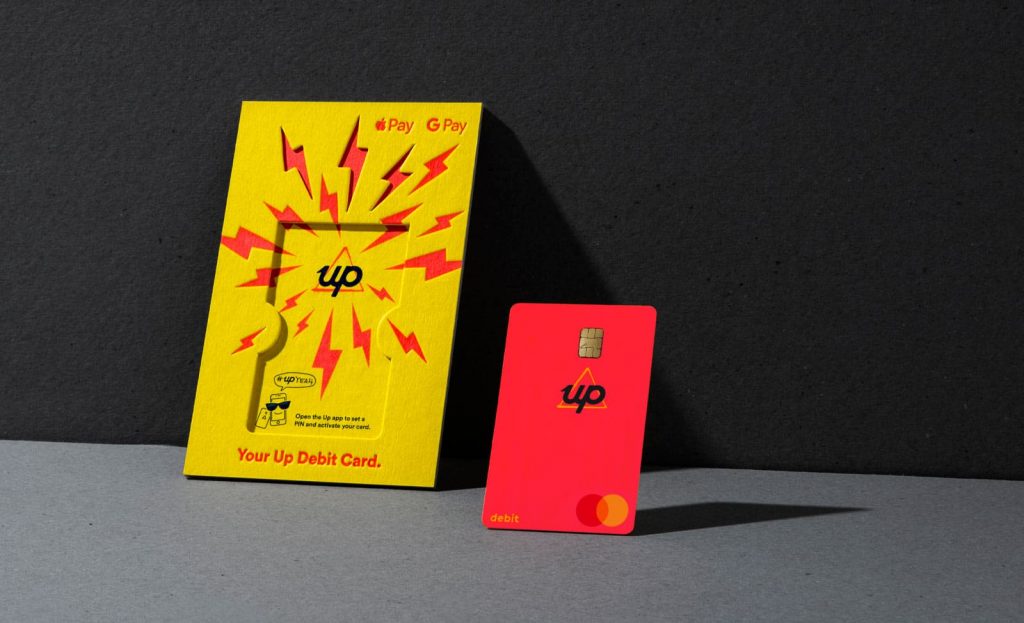
- Payment Network: Mastercard
- International Transaction Rate: 0%
- Overseas ATM Fee: $0
- Account Fee: $0
Sign-Up Bonus: $15 – For a limited time, you can receive a $10 welcome bonus for becoming an Upsider! Join using our Up Bank invite code to score $15 after joining.
Up is a digital bank (owned by Bendigo & Adelaide Bank) that proves it’s possible to love your bank. Setup is a breeze, and of course, Up charges absolutely nothing when you use an Up Debit card overseas. As a neobank, Up doesn’t have any physical branches, with everything easily handled from within the best banking app I’ve ever used. It’s super clean by design and packed full of useful features like payment splitting, the ability to detect recurring charges, easy payments to friends by name and detailed spending insights.
Want the full story? Check out our detailed Up Debit Card Review !
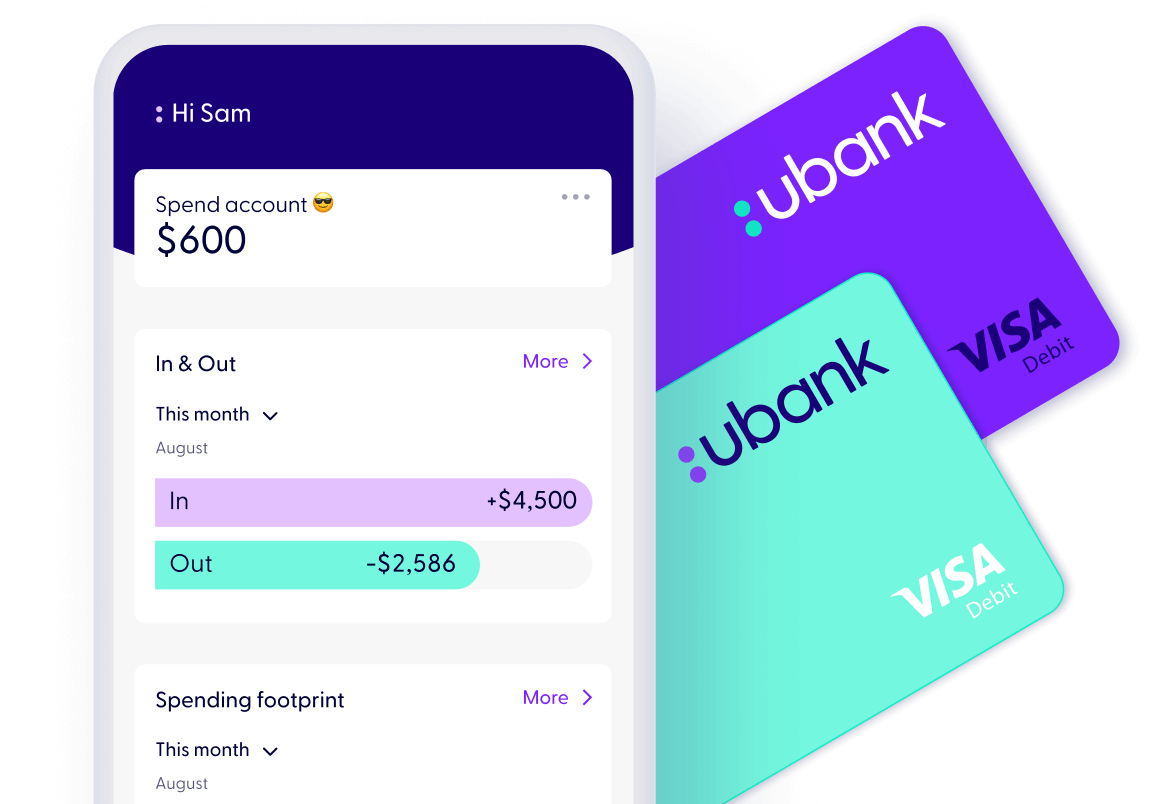
- Payment Network: Visa
Sign-Up Bonus: $10 – For a limited time, you can use our Ubank referral code C7N1TAZ to score $10 in your new Ubank account after making 5 purchases within 30 days of signup.
Ubank is another digital bank with zero fees for using your connected debit card overseas. While the app isn’t quite as fantastic as Up’s offering, Ubank is still a great option. The upside is that Ubank also offers savings accounts that have consistently given some of the highest interest rates in Australia. Not to mention joining takes just a few minutes and they offer a joint account option.
After more info? Read out our complete Ubank Debit Card Review !
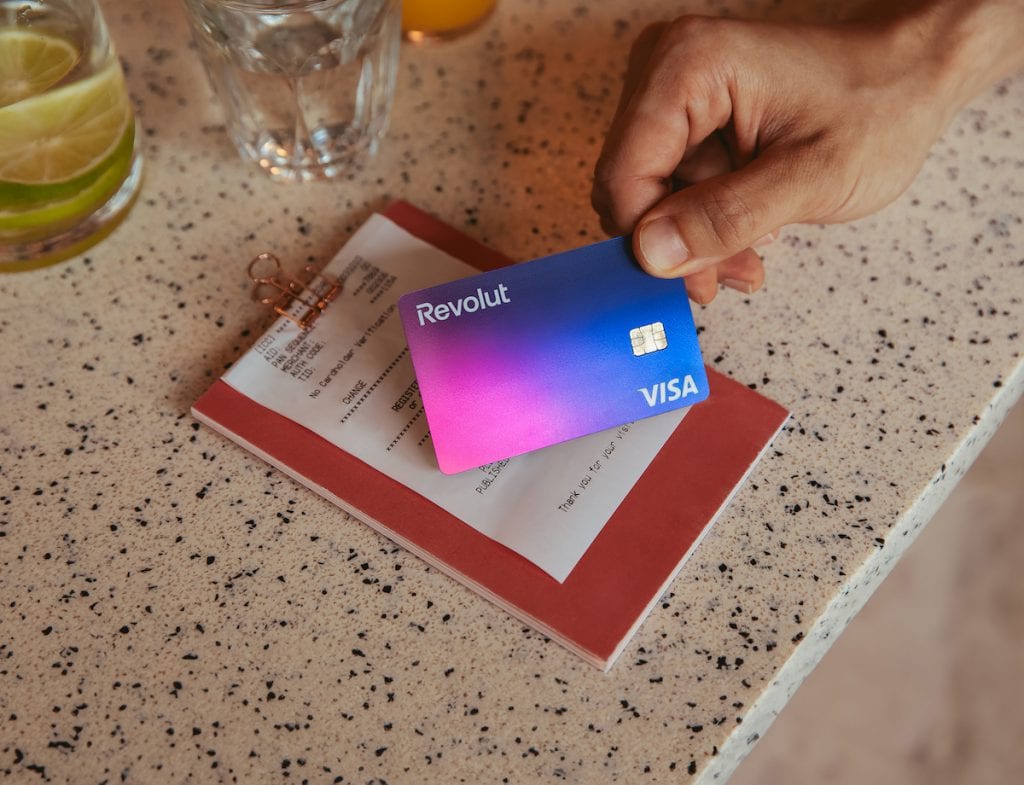
- Overseas ATM Fee: $0 ($350-$1400/m fee-free limit based on plan)
- Account Fee: $0-$24.99/month (based on plan)
Sign-Up Bonus: We’ve partnered with Revolut to offer Flight Hacks readers an exclusive $15 in their new account. Join via this link to score $15 after making 1 transaction within 14 days.
Everything money is accessible with Revolut, from spending on your debit card to investing in stocks and EFTs, crypto, gold and silver. From a travel perspective, Revolut offers minimal fees and the ability to preload your card with one of several currencies or spend using AUD at the current exchange rate. SmartDelay also offers complimentary airport lounge passes for you and up to 3 friends when your flight is delayed by more than an hour.
Revolut is also great for those travelling with anyone aged 6 to 17, thanks to the option for parents and legal guardians to create a linked account for their children. The main account holder gains access to a bunch of insights and controls, while under 18’s can spend their own funds with the same money-saving perks as the main account holder.
In Australia, Revolut offers users a free Standard plan, in addition to increased perks on a Premium ($9.99/month) or Metal ($24.99/month) membership. While also including a solid reinforced steel card, the Metal option offers monthly benefits like three fee-free international payments, unlimited fee-free weekday currency exchange and fee-free ATM withdrawals up to $1,400. Not willing to pay for a full year? You can always upgrade for your trip and cancel the plan once you return home.
Ready to learn more? View our Revolut Australia guide !
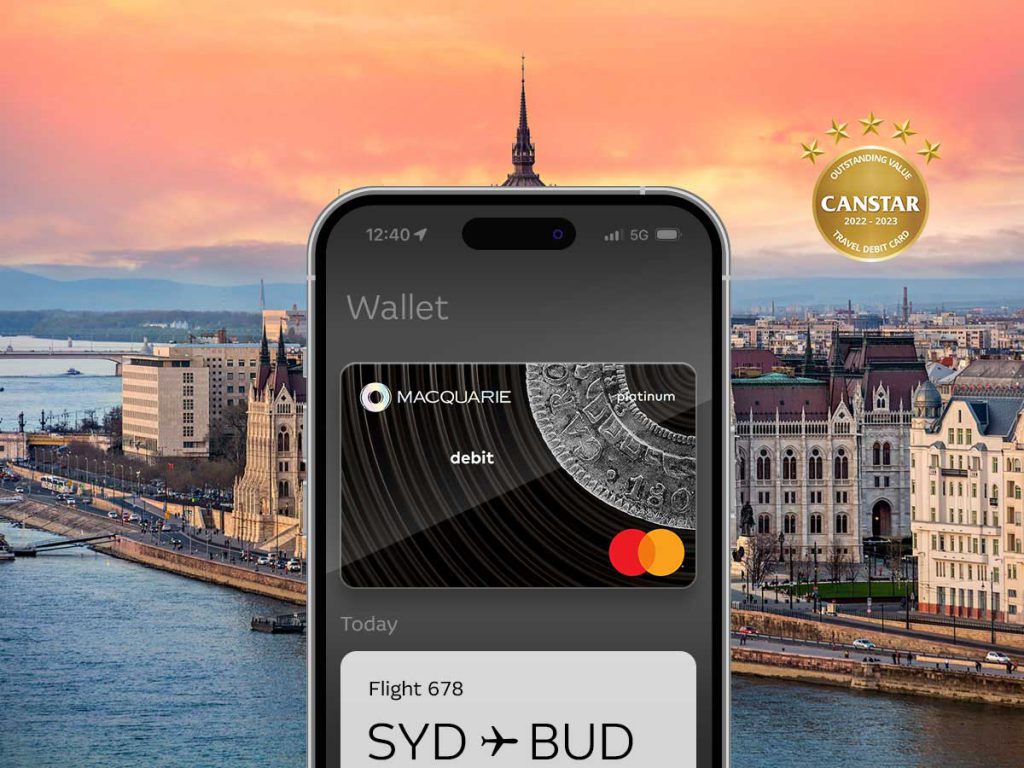
- I nternational Transaction Rate: 0%
If you’re after a debit card for travel from a big bank, but not quite big enough to rip you off, Macquarie has you covered. Although the app and online banking portal are in desperate need of an update, the product itself is hard to fault.
Macquarie also offers a few perks like a luggage return service that will pester the airline on your behalf, if they mishandle your checked baggage. There is a small service fee for this, but if your bag is not returned within 96 hours, you’ll receive a $100 payout per lost bag. In addition, cardholders have access to a concierge service, card purchase cover and wallet guard cover. Considering this is just a debit card, those are some nice benefits to have up your sleeve.
Deposits made on a Macquarie Transaction Account can also earn interest, up to 4.75% p.a (as of March 2024).
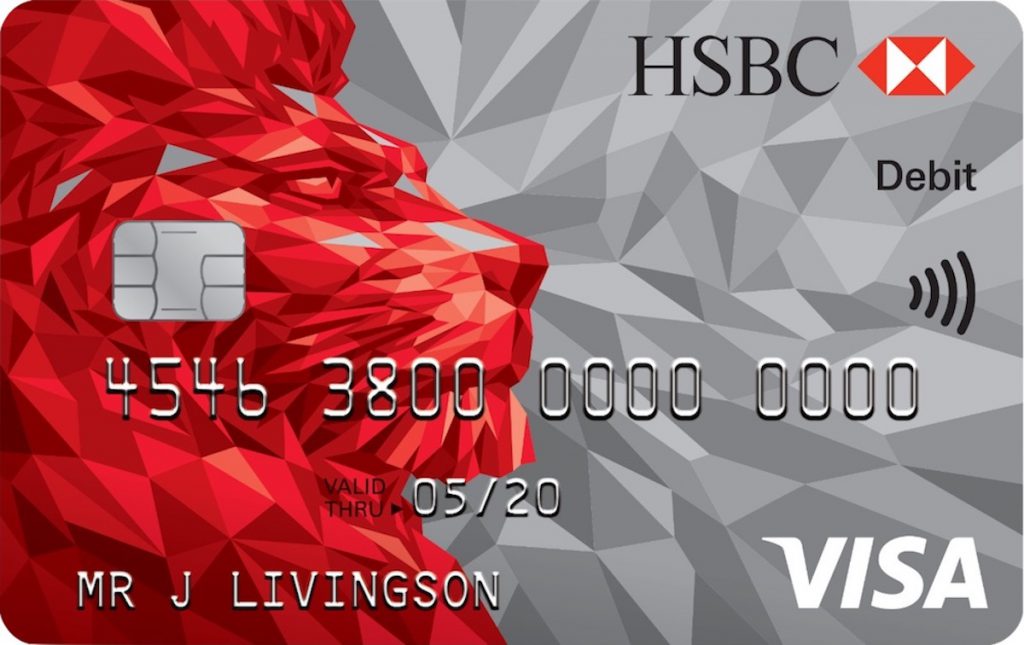
HSBC’s worldwide reach makes its Everyday Global Account an attractive offering. If you need to make an ATM withdrawal, you can visit a HSBC ATM to guarantee zero withdrawal fees around the world! The exception is in Argentina, France, Greece, Mexico, Malta and Turkey where there is a small fee.
There’s an option to buy and transfer between ten currencies (AUD, USD, GBP, EUR, HKD, CAD, JPY, NZD, SGD, CNY), although HSBC does hide a foreign markup here by using their own HSBC Daily Exchange Rate. For the best rate, simply load AUD onto the debit card before spending overseas, where the Visa exchange rate will apply with zero markup.
Plus, if you deposit at least $2,000 into your Everyday Global Account before the last business day of each calendar month, you can earn 2% cashback up to $50 per month. You’ll earn cashback on eligible purchases with Australian merchants under $100, when you spend via payWave, Apple Pay or Google Pay. There are a few transactions that won’t be eligible, including public transport, car parking and vending machines.
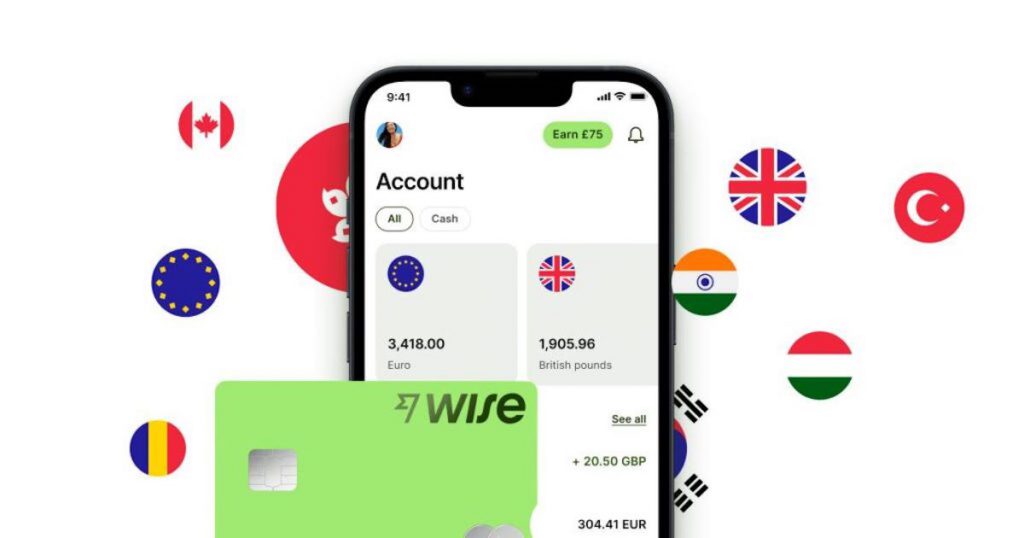
- Overseas ATM Fee up to 350 AUD/month: $0
- Overseas ATM Fee over 350 AUD/month: $1.50 ($1.50+1.75% for 3+ withdrawals)
- Card Load Fee: 0% to 2% depending on currency
- Physical Card Fee: $10
Wise (previously Transferwise) used to offer one of the best cards out there, until moving to an overly complex fee structure that feels very ‘banky’. That includes a $10 fee if you’d like a physical debit card, and high fees for withdrawing money overseas, once you go over the small monthly allowance. We do appreciate that those fees aren’t hidden, and you’ll see the exact exchange rate and the Wise fee applied before completing a transfer.
Because they still offer a real mid-market rate and are one of the best options for transferring foreign currency between friends, Wise still makes our list. They also offer a cool virtual card feature, that can be useful for pesky subscriptions or transactions where you want to cancel your card afterwards, without the consequences.
All up, Wise is a solid option if you need to make a bunch of transfers, but one to avoid if you plan on using overseas ATMs.
Keen on Wise? Why not read our Wise Australia review !
We’d be here all day if we reviewed every Aussie debit card with zero foreign transaction fees and fee-free overseas ATM withdrawals. Our guide above covers the best options for most travellers, but there are a few cards that deserve an honourable mention.
- Bankwest Easy Transaction Account
- ME Bank SpendME Transaction Account
- Suncorp Everyday Options Account
Australia’s Worst Travel Debit Cards Revealed
Many big banks and frequent flyer schemes market travel money cards, but often, these come packed with hidden fees that make them completely useless. Unless you enjoy giving away your money (in which case you should send it directly to us), here are some popular options to avoid;
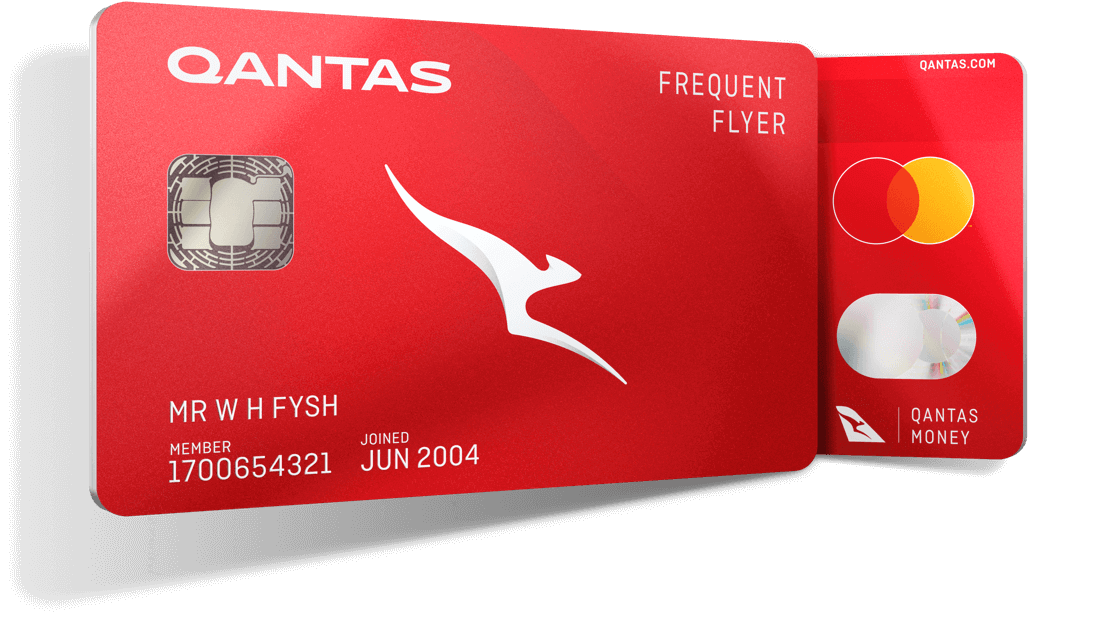
- International Transaction Rate: “free” with hidden markup
- Overseas ATM Fee : approx. $1.95 – $3.00 (varies with currency)
- Card Load Fee: 0.5%
Qantas Travel Money is possibly the worst travel card out there. While advertising zero exchange fees, the ridiculously expensive “Qantas Travel Money Daily Rate” is used when you transfer funds between currencies or make a purchase. For example, in our €500 spend test above, using the Qantas Travel Money would cost a whopping $47.13 more than using a fee-free Up debit card. That’s a hidden markup of 5.67% – and Qantas will still charge an ATM fee!
For international purchases, you can earn 1.5 Qantas Points for every $1 equivalent spent in foreign currency. Even though we love Qantas Points, the insane nearly 6% markup is a complete ripoff and not worth paying to earn points.
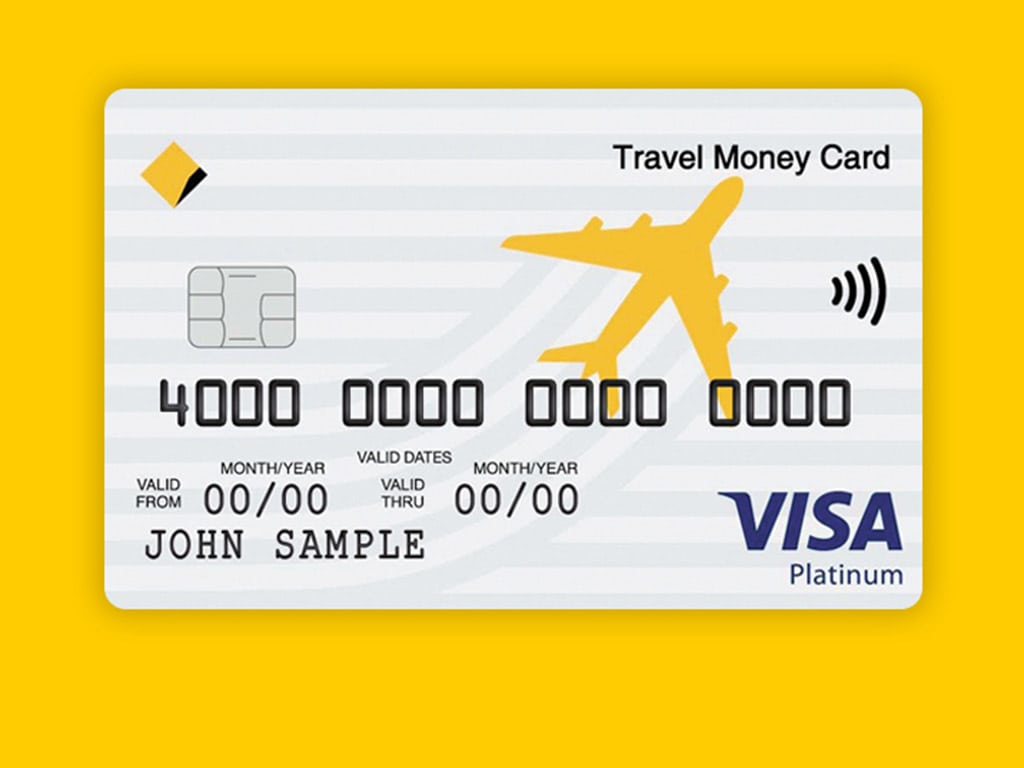
- Foreign Exchange Rate: 3%
- Overseas ATM Fee: A$3.50
- Card Load Fee: “free” with hidden markup
Despite its widespread usage, the Commbank Travel Money Card is another terrible option for overseas spending. That popularity comes from Commbank’s extensive customer base within Australia, with many travellers sticking with the one bank, instead of exploring better alternatives. But the thing is, each of the no-fee options listed above can be funded instantly from your existing Commbank account, so there is no upside to using Commbank Travel Money.
While the card itself is free to hold, there’s a 3% conversion fee applied with each transaction made in a different currency. Additionally, you’ll pay $3.50 for every overseas ATM withdrawal. Commbamk becomes an even worse option once you realise how misleading their advertising of “no reload fees” is. While technically true, Commbank makes up its own exchange rate for card loads, which is approximately 4.4% worse than the Visa rate (at the time of writing). Essentially, this translates to a 4.4% fee when loading foreign currency onto the Commbank Travel Money Card.
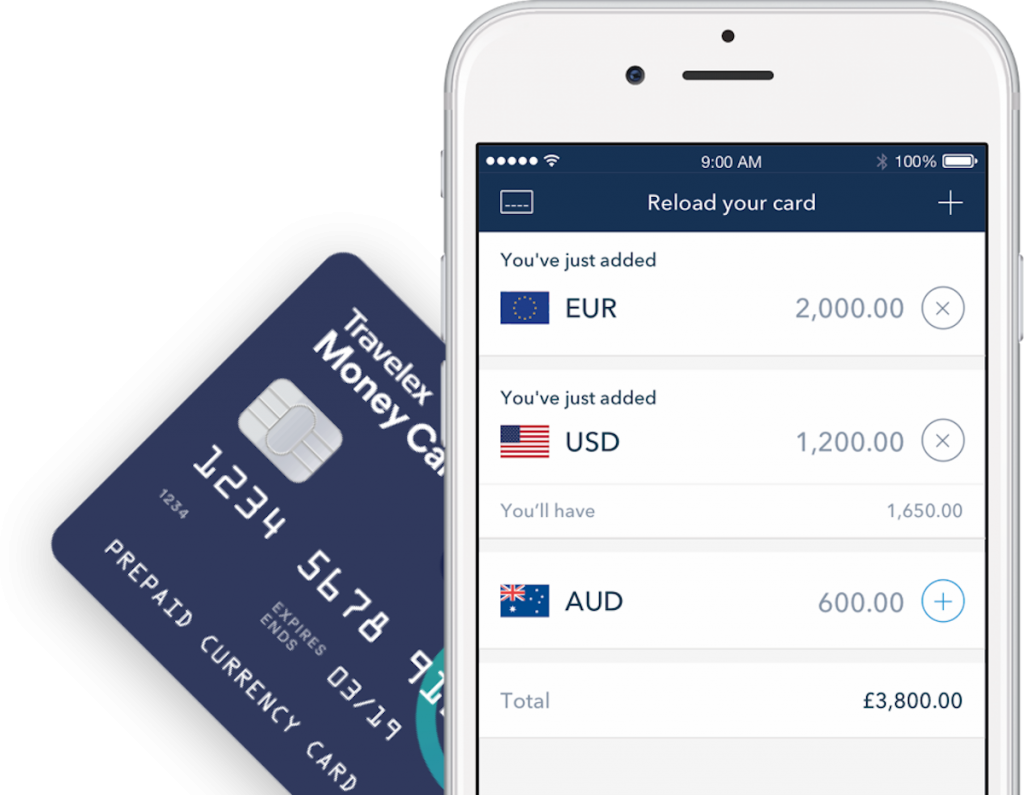
- Overseas ATM Fee: $5
- In-Store Load Fee: 1.1% or $15 (whichever is higher)
- Online Load Fee: $0
- Inactivity Fee: $4 monthly (once your card is inactive for 12 months)
- Closure Fee: $10
You only have to read the endless list of fees to realise the Travelex Money Card is about as deceptive as it gets. Travelex does offer unlimited fee-free overseas ATM withdrawals, which is nice, but once you realise the other fees that are adding up and decide to close your account – oh wait, there’s a fee for that! You’ll also need to pay Travelex a monthly fee for the privilege of NOT using your card, once it becomes inactive for 12 months.
Travelex’s PDS says their foreign exchange rate is “set and determined by Mastercard”. What they don’t openly admit is that there is a hidden markup, which is easily spotted when you compare the Travelex exchange rate to that offered by Mastercard.
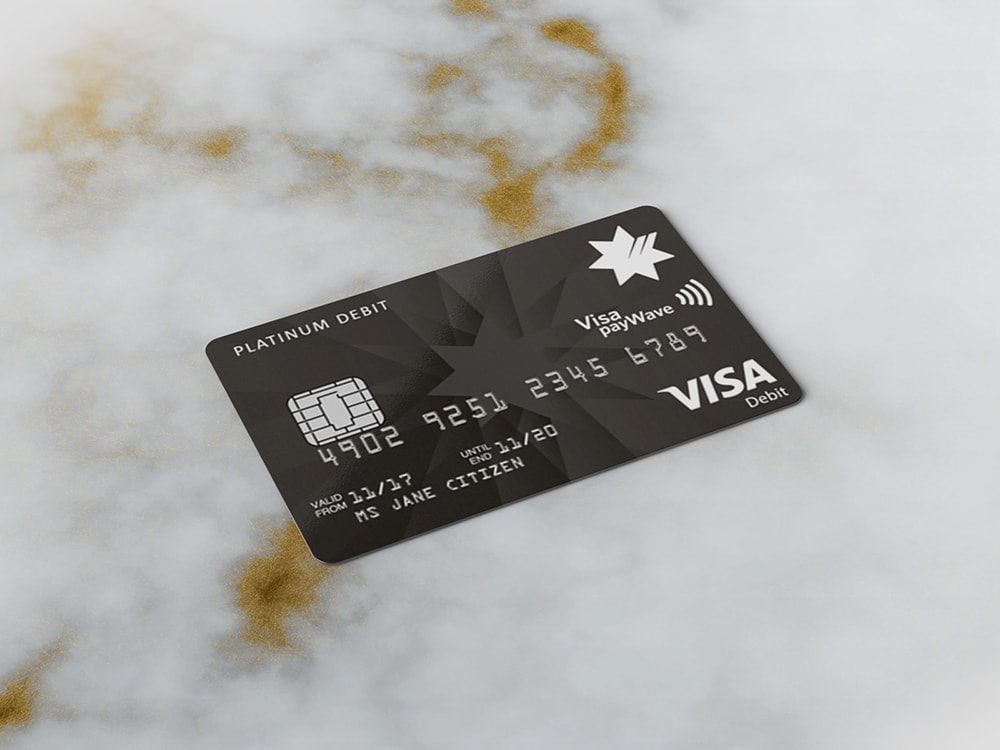
- International Transaction Rate: 3%
When NAB acquired Citibank in Australia, they removed one of the best big-bank travel cards available (the Citibank Saver Plus) and directed new customers to the NAB Visa Debit Card. As far as international spending, this new option is an absolute waste of plastic.
Instead of guaranteed free transitions at Citibank’s enormous overseas ATM network, you’ll get charged $5 at every single overseas ATM – yay! There’s also a juicy 3% international transaction rate, so you’ll pay a fee regardless of how you spend your money overseas.
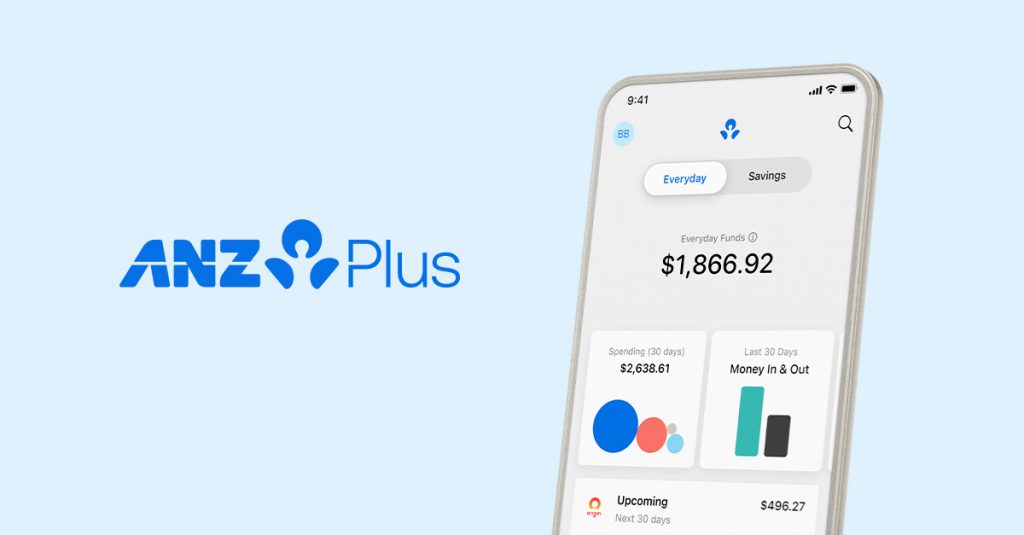
ANZ Plus is ANZ’s new digital banking service that comes with a transaction account and a linked savings account. ANZ and ANZ Plus are like two peas in a pod, except one pea decided to get a snazzy makeover and call itself ‘Plus’. It’s as if ANZ woke up one day and thought, ‘You know what this bank needs? Another version of itself that’s slightly better but nearly identical’.
In all honesty, ANZ Plus is a solid product to use within Australia, with a cool banking app, competitive interest rate and useful insights to help you save money. But the good news stops there, with ANZ’s better version of itself keeping the fees for international use. You’ll pay $5 for overseas ATM withdrawals and a 3% fee on foreign transactions.
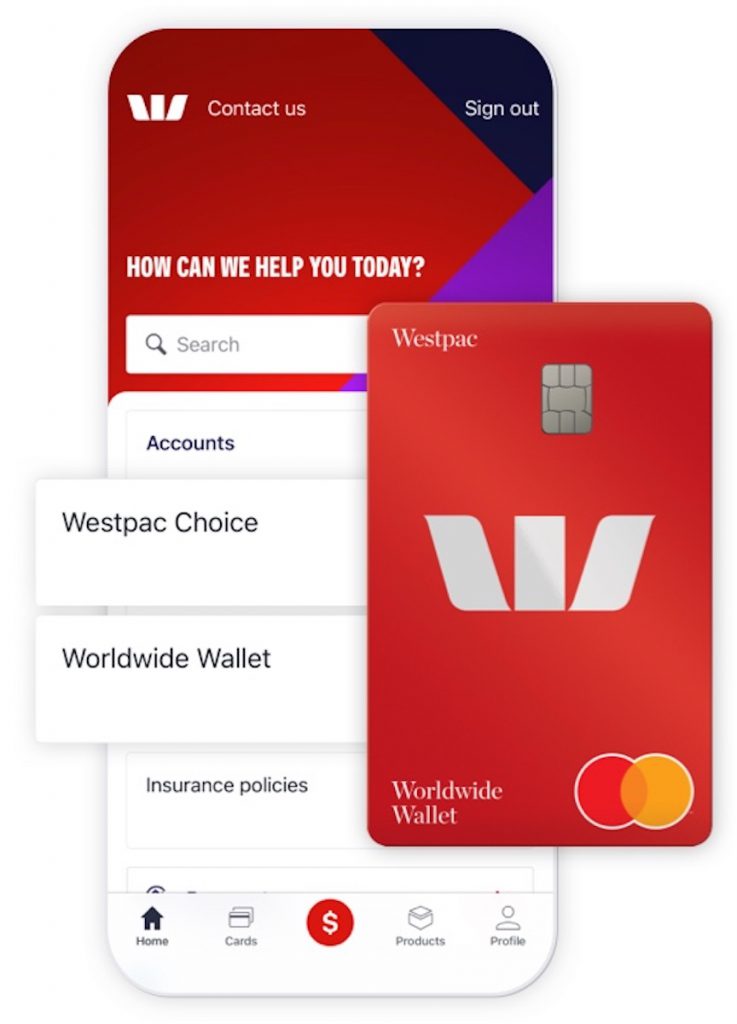
- Foreign Exchange Rate: 0%
- Overseas ATM Fee: approx. $1.50-$3.50 (varies with currency)
As far as big-bank travel cards go, Westpac’s Travel Money Card (also known as the Westpac Worldwide Wallett) isn’t quite as terrible as the rest. Although there are still hidden fees when you load your card, as well as when you withdraw money from an overseas ATM. The only reason we say Westpac’s travel card isn’t as awful is that they use the Mastercard rate when spending in currencies you don’t have loaded, without a markup. But overall, this is still one to avoid.
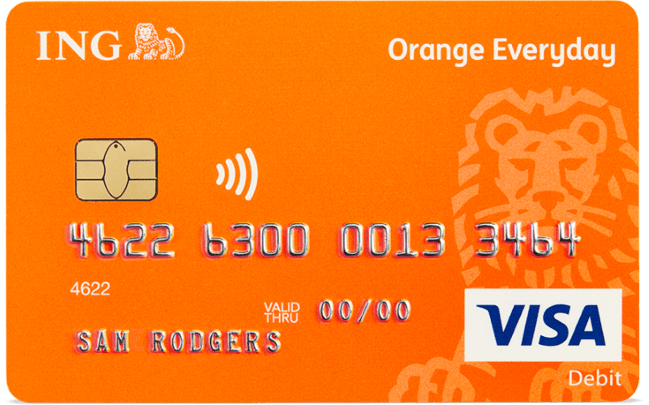
We used to love ING’s Orange Everyday card for overseas spending. But as the card became more and more popular, ING decided to capitalise by introducing international transaction fees, and then raise them even higher.
You can get all international transaction fees rebated, but you’ll need to make at least 5 eligible purchases and deposit at least $1,000 to one of your personal ING accounts every month. The same can be said for overseas ATM withdrawals, of which the first five fees can be rebated provided you make at least 5 eligible purchases and deposit at least $2,000 to one of your personal ING accounts every month.
Because of this unnecessary step to qualify for zero fees, we no longer recommend the ING Orange Everyday for travel.
With so many fee-free travel debit cards available, there’s no reason why you should pay banks every time you need to spend money overseas. With a little research into a travel debit card that suits you, it’s pretty easy to save thousands in bank fees.
Alongside a fee-free card, be sure to employ these tips when spending overseas;
- Never pay in Australian Dollars: It’s one of the biggest travel card scams out there as merchants will make up their own terrible foreign exchange rate, and then charge a fee on top, to convert the local price to Australian dollars. You’ve probably paid with an EFTPOS machine or used an ATM that asks if you want to pay in AUD instead of the local currency. While it might sound like you’re getting a better deal with Australian dollars, this is almost never the case. Be sure to pay in the local currency, using a fee-free card above.
- Check for fees applied by the ATM: While any good debit card will offer zero ATM fees, that doesn’t stop ATM operators from charging their own fees. The machine should tell you before charging a fee.
- Be prepared with multiple card options: In case your card stops working, is stolen or becomes lost it’s a good idea to have a backup card.
- Use your travel debit card for online purchases: Avoid foreign transaction fees when shopping online with overseas merchants by using your card for travel.
I am going to visit [insert destination] – which card should I use?
The cards we recommend above are great for spending overseas. Be sure to consider the features important to you (eg. no ATM fees) when selecting a card for travel.
Which card uses the best currency conversion rates?
We have compared Visa and Mastercard’s spot rates above – there is little difference. Be sure to use a card that uses these spot rates, without applying a markup.
Can I use any Australian debit card overseas?
Nearly all Australian debit cards with a Visa or Mastercard symbol will work around the globe. There are a few exceptions, for example, many cards are currently blocked within Russia and other regions of conflict.
Should I tell my bank where I’m going?
It’s not something we regularly do, but it doesn’t hurt to notify your bank that you’ll be travelling overseas to avoid international purchases being mistaken for suspicious activity.
Why shouldn’t I transfer a bunch of AUD to the currency I will be spending?
It’s a bad idea to convert money ahead of your trip unless you have a crystal ball and know which way the exchange rate will move. If the exchange rate changes in your favour, you could lose out big time. The most accurate rate is achieved with a fee-free card loaded with AUD, using the payment provider’s spot rate
Can I use any frequent flyer credit card overseas?
While your Australian credit card will work overseas, most will charge a 3% fee when spending in a foreign currency. If your card earns a high number of points per dollar, that fee could be worth paying. It just depends how many points you’re going to get, and what fee you’ll be charged.
Which travel debit card is best for international travel?
The best travel debit card is going to have low or no international transaction fees, as well as the features that best suit you. Be sure to check out the best cards listed in this guide.

Chief Operating Officer & Aviation Nerd at Flight Hacks
Off to Singapore and KL in October, got the BankSA Worldide Wallet card. Unsure whether I’d be better off using a card like the Up debit card instead.
Seems like an “ok” product but they charge for ATM withdrawal, in Europe 2 euros per transaction, 2USD in the US and 1.5GBP in the UK unless you use one of their partner ATMs. I’d say use UP if you’re unsure about whether the ATM you’re about to use is affiliated with Bank SA to save on the fee.
Hi Emmanuel, with the up debit card an u bank card , can you load the money from central america on there to take out? and or can you use the card over there anyway?
No, you can’t. If you want to load a foreign currency, I’d use Revolut or Wise.
Re: unbanked & up – both are digital banks so when I go overseas to Europe how do I notify these digital ‘banking institutions’ of my overseas travel dates so they don’t block my cards?
Hi Jefr, digital bank only means they don’t have a physical branch you can walk into. Personally, I can’t recall the last time I went into a physical bank. As for letting them know you’re travelling, I’ve never done this with either Ubank and Up and have had zero problems. When it comes to fraud, 99% of happens online so they do have a function where you can turn on or off international payments within the app. When you’re traveling and shopping, most of the banks now are smart enough to detect genuine transactions and don’t block you.
I have the Citibank one, it’s fantastic I find. Good rate which I locked in before travel so I know exactly how much I have to spend, I am even in Hawaii at the moment and even though the ATM operator says it charges $4.35USD per withdrawal, my card has not charged it.
I think it’s a mistake to lock in rates before you travel unless you have a crystal ball and know which way the FX market is going to move. Personally, I prefer to convert on the spot which gets you the best rate each time.
Not sure why Wise (previously known as Transferwise) makes on the list but HSBC Everyday Global Account didn’t make the cut. They also offer $0 ATM fees (no cap on withdrawal per month) and 0% overseas transaction fee.
Hi JW, it’s definitely not a complete list and HSBC is a pretty good product as well. I’ve got an HSBC Everyday Global Account but don’t use it because the app is a pain.
how about Bankwest https://www.bankwest.com.au/personal/bank-and-save/bank-accounts/easy
Also not a bad product, does pretty much the same as Up/Ubank etc.
what do you think is the best travel card for Moldova? I know not many people go there, but being a non EU country whose currency isn’t in much demand, I think we get stung when withdrawing from an atm. I’m using the QANTAS travel card. It was many currency wallets, but no Moldovan Leu. In Chisinau, Moldova seems to default to taking US dollars. I get the feeling we are double converting. AUD to USD and then to Leu. Ouch!
Do you know any other alternative?
Hi Ben, one of the debit cards listed here will work just as well. You should never convert money beforehand unless you have a crystal ball and know which way the FX markets will move 😀 The Qantas travel debit card isn’t a great product as they take a much too large percentage on every transaction or conversion you make. I would just use a debit card (or credit card) that doesn’t charge FX and let your bank do the conversion on the spot, much easier.
Thanks for a very interesting article about these attractive products. However, a doubt remains – how do these cards make money out of you? That is, what they do not take with one hand, must be taken by the other.
Hi Tom, most products listed above are not advertised as a “travel card”; why is that you may ask? It’s because the features they offer don’t make them much money, sure they might get a cut from the Mastercard or Visa spot rate but that’s not their main breadwinner. These products offer these specific features in the hope that you will move away from your traditional bank (think Westpac, Commbank, ANZ) and do all your everyday banking with them.
What do you think is better the citibank card, ubank or travelwise? 🙂 Tossing between those 3.
I’d go with Ubank since they are an actual Australian bank and the limits of Transferwise are somewhat limiting (no pun intended). Citi is also good but the app and website are not user friendly IMO. Bonus of Ubank is that they give you $20!
Could you please elaborate more on what the limits are for the Transferwise?
No limits for card payments but there is a very restrictive limit for ATM withdrawals which is $350 a month with max 2 cash out transactions. After that, they charge a fee.
JEN, Citi have withdrawn from the multi currency markets since they where purchased BY NAB. SAD, they were a great card
I have been researching some of the reviews on the cards, some adamantly say don’t use ING because of poor customer support when something goes wrong. Do you know of any that standout as having a good track record for customer support?
I’ve used ING in the past, and didn’t have a bad experience. That said, I’ve never been in a situation where I would need real customer support. For what it’s worth, Up bank has a chat feature within the app so that’s handy when you need a replacement card or something.
Can confirm support is not great, had several issues lately. Call centre times 20-30+ minute wait minimum, which especially sucks while overseas. Need to use Skype, etc or request a call back which can take days. Trying to resolve via messages is useless, appears they are unable to authorise anything this way.
On the plus side only ones that refund ATM fees so unfortunately still recommend them, have saved me a significant amount. Make sure you have several backups, to be honest have all the cards recommended – no fees and no stress if issues occur.
Hey Immanuel, Which is the better of Ubank and Up and why, especially considering you say Mastercard gives better rates than Visa? Thanks in advance!
Also between those and Travelex which I keep reading about?
Maybe times have changed but Travelex offers the worst travel cards/services IMO. As a general rule it’s safe to avoid anything that has the word travel in its name.
I found out that Travelex have competitive rates on their card – and the fees are $0 from our point of view. We can’t protect ourselves from the other side, but at least we can protect ourselves from the Australian point of view.
Plus, you can talk to a physical person in store about it. You can’t do that with the others – I’ve tried wise – and you do a chat – which i hate. I prefer the customer in person approach – especially if things go wrong – you can talk to a person in person and over the phone – and they have toll free numbers around the world for help.
Rates and fees are one thing – BUT HELP AND SUPPORT is a big factor for me when using a Travel card overseas.
Hi Miguel, I would argue the opposite. Travelex makes some of the worst products on the market, that said they do offer convenience (exchange money at the airport). For this, you’re paying a conversion fee of 3.65% (based on the Visa spot rate AUD-USD calculated today), this might not sound like a lot but it’s a rip-off in my book. Up, Ubank, Revolut, Citi Bank, ING etc. offer far superior products with full support (they have a banking license) and best of all they don’t charge fees, on top of that they’re just everyday bank accounts which is an added bonus. The physical people you talk to at Travelex are just salespeople, I’m not sure what sort of support you would need/expect from them? Personally, I carry multiple (free) cards with me so if one gets blocked for whatever reason (which has never happened) I just switch to the other one. Cheers, Immanuel.
Both are pretty much the same, bonus is that you get $20 with Ubank. For rate difference between Visa and MasterCard to matter much you would need to spend a lot of $$, instead, I would prioritise ease of use.
Going to US in 2 weeks. Just wanted to check your advice please. You mentioned “You should never convert money beforehand unless you have a crystal ball and know which way the FX markets will move”. Does this mean I should load up a Ubank Card with AUD and use this for both direct purchases and ATM withdrawals & rely on spot rates? It seems from the discussions above that foreign exchange occur at the UBank end. Is this a correct understanding?
Hi Geoff, your understanding is spot on. Converting currency in advance, hoping you will get a good deal is the equivalent of gambling, nothing wrong with it but the chances you get it right are just as good as the chance of getting it wrong. Ubank is just like any other Australian bank account, free to have money in your account and once you pay with your card it will be converted on the spot by Ubank.
Is there a conversion fee when you buy on the spot with a Ubank or Up card? Also can i book accommodation here in Australia and then just pay at the hotel using the Ubank card and it will just convert with no transaction or conversion fees?
Ubank is an Australian bank, they issue a free debit card (just like any other bank in Australia). You can’t have any currency other than AU$ on it so yes, your account will always have AU$ and it will be converted on the spot to pay for any transaction in any currency that’s supported by Visa, as per our article there’s 0% conversion fee imposed by Ubank (that’s why we like it). The card and bank account have no fees so of course you wouldn’t be charged a fee for booking accommodation using this card either.
Thanks for the article. Do the recommended cards offer travel insurance?
Hi Raymond, for cards with travel insurance you can check out our frequent flyer credit cards here , I can’t think of any debit cards that would offer free travel insurance. Since insurance is very personal, I can’t give you a recommendation as I don’t know your circumstances. However, I can tell you which one I personally use. For me I rely on Amex Business Platinum travel insurance as it’s activated even if I don’t use the card to purchase my flights, it also covers additional card holders so anyone I have listed on my account is automatically covered.
Amex non business credit card don’t give you travel insurance unless u buy your ticket with their card. The issue is if you buy a points flight, which is only technically paying tax, not actual flight, they won’t cover you with travel insurance when u claim as haven’t actually bought a fight. Hard lesson to learn.
ANZ Black or Platinum give you 6 months travel insurance per trip ( including family traveling with you) plus 6 months income protection of $1700/month(may be more $ now, they paid that much in 2017). As long as you spend $250 of your trip eg accommodation on your ANZ card and have a return ticket which can be a points bought one before leaving Australia. Also any auxiliary card holders are entitled to this insurance cover if travelling independently from you. Both my adult children used this to cover them on international trips at great savings. Also earn the most points / $ spend with ANZ black of any credit card except maybe business AMEX card. I never paid for travel insurance and have saved heaps over the years with this. Non cover you for extreme sports though or riding motor bikes if don’t have a bike licence in Australia or illegal to in the country you are riding eg Vietnam. Also can get a certificate prior to leaving saying they are covering you in certain countries of travel if needed.
Hi Immanuel I have a 15 year old daughter going on a 3 month student exchange to Italy at the end of this month. A number of travel websites recommend paying in cash in Italy so regular ATM use will be expected. She will be staying in a smalll village in Tuscany so may not have access to some of the “international/fee-free” ATMs. She will likely be spending around $600 per month (which exceeds some of the monthly fee-free ATM limits). A lot of the recommended debit cards have restrictions for under 18s. What do you recommend for her? Thanks
Hi Stephen, I believe all of these products have an age limit of 16 or older, not sure why but no doubt has something to do with government legislation. What I would do is open an account in your name and just give her the card to use and app login to manage her money. Paying by card is much more popular in Europe now than it ever was and it’s especially usefull when adding the card to a mobile wallet such as iPhone/Samsung etc. Ubank and Up are both very much geared towards young people so I think those would be good options to try out.
Great discussions. Thanks all. How about these cards Westpac – http://www.westpac.com.au/international-travel/travel-money-card/ Commbank Travle money card – https://www.commbank.com.au/travel/travel-money-card.html?ei=prod_TMC
Please advise. Thanks once again.
Westpac is alright but they charge ATM fees so I’d pass for that reason alone. Commbank, avoid unless you want to pay 3% on your transactions. The problem with these cards is that they want you to load it up with foreign currency, however, unless you’re a successful FX trader by profession, the chance of you timing the markets is slim. So essentially you’re gambling on the idea of currency either going up or down, if you were to just let your card convert it on the spot, you would always pay the market price which would then average out over time.
Thanks Immanuel, great discussions. How about wise card and what’s your opinion about it.
Also good but the limits are somewhat prohibitting.
Do you know if you need to convert currency with the Westpac worldwide wallet? I’m travelling to Vietnam and it’s not a listed currency. I would like to withdraw cash.
Hey Mae. Yes, Westpac Worldwide Wallet would require you to convert AUD before using the card, essentially gambling on the exchange rate. While that could work in your favour if the exchange rate worsens, you could also lose out big time. Westpac Worldwide Wallet does not currently support VND. Because of this and the extra fees Westpac charges, you might prefer the UBank or Up cards as mentioned above. Happy travels, Tom.
What is the best travel card for ATM withdrawals. We intend to pay for most things such as meals, taxifares and public transport by cash in the UK and Ireland. Is this the most cost effective method or are we better off just presenting our card when paying for goods and services. TIA
Hi David, Ubank and Up both don’t charge ATM fees so that would be my pick. When paying, it might be easier by card as then you don’t have to convert any leftover currency back but it depends where you go. Small towns in Europe for example sometimes don’t have card facilities so it’s just easier to pay in cash.
Hi Immanuel.
Just confirming, is the link below the ‘travel’ card for UBank, as it is coming up as a ‘transaction’ account rather than ‘travel’ card, so I want to make sure it is the right one?
https://www.ubank.com.au/banking/transaction-account
Any other advice regarding using this card (if the correct one) or UBank’s travel card (please send link) would be greatly appreciated.
Kind regards
Hi Joe, they only have 1 type of account as far as I’m aware. The product isn’t advertised as a “travel card” because they don’t really make money from it. That said, it makes an excellent travel card because it doesn’t charge fees, it’s easy to manage, free and they give you $20 for joining. As previously mentioned, by warry when a product brands itself as “travel” related; there are usually fees associated.
Hi, I was just wondering with up bank do I have to create another account with wise. Just a bit confused. Thanks
Hi, no you don’t unless you plan to send money to family/friends via international transfer. If you just want to use the debit card to pay for stuff and take money out of the ATM, you don’t need to do anything.
Hi Immanuel, Do you know which card would be best to take to Bali? My son will be taking AUD cash as well to change over there for a more favourable rate but lots of cash is a risk.I’ve also heard that ATM’s charge their own fee (randomly) and when making purchases using a credit or debit card a 3% fee is charged. Can you confirm or deny? 🙂 Thanks
Hi Jenny, I wouldn’t take cash, the rate you would get from a vendor will most certainly be worse than what you can get at an ATM. The debit cards listed above such as Up, Ubank etc don’t charge any fees. If an ATM charges you fees, it will always disclose this before you proceed with the transaction, most often it’s a fixed amount. Always use reputable bank ATMs and you will be fine 🙂
Hi Immanuel, thanks for the advice above.
Which is the best card for us?
My partner is heading of the the USA, Canada. Then we are flying across to meet her in Netherlands, then Scotland followed by a trip to Italy for a holiday.
She likes the Wise Travel, I like the Macquarie. I think the limit on withdrawals from atms is a pain in the wise one. She thinks the Wise one has a better currency conversion rate since Macquarie uses Mastercard rate.
What are your thoughts? It’s hard to find detail on ubank and what their currency conversion rate is.
If you plan to use the ATM a lot, I’d stay clear from Wise as they are very limited on withdrawals. If the cards are free, get both that way you always have a backup. Personally, I take an Up debit card and Ubank debit card, if one gets blocked or I lose it somehow I have a backup and it takes seconds to transfer funds from one account to another.
Hi. Just trying to understand how you transfer money if one card has been lost/ stolen, wouldn’t every transaction be blocked ??
You can just lock the card it self. This means you can still use the account.
I just wanted to come here to say thank you Immanuel, so much information – exactly what I wanted to know and have been agonising over! The fact you are still answering the questions a few months after the article was written!
Hey Chantelle, thanks for the kind words! We’re actually planning to add more products to this article soon to expand the comparison for people.
Ditto from me – your info has been really helpful to me to choose the right card for travelling o/s. Just got word from Citibank that they will be closing down their travel card that I have used for last 10 years, so I am in the market for a new one. This article and the follow up discussions have been invaluable. I’m tossing up between UBank & Up Bank. Thanks again for a very informative article and more importantly, the follow up discussions.
Thanks Lisa! Both Ubank and Up are pretty much identical when it comes to real world use. It will come down to which app you find easiest to use. Try them both, it’s free after all 🙂
Totally agree!! How often do we find a site with an article and ability to comment…only to never hear from the author…way too often!
I travel internationally on occasion (Australia bound next month) and I think this discussion is incredibly valuable!! I’ll be getting both Up and Ubank as there is really only an upside to both.
Thanks for the feedback Bryan! When readers take time to comment, we take time to respond. It’s also very useful for others reading this article as it adds information that might not have been clear or mentioned in the main content.
Hi After reading all this I’m still not too sure. I’m traveling to UK and USA in December 22 and have applied for a Revolut card, what do you think? Regards Elly
Hey Elly, Revolut is also really good. You might even want to consider switching to their premium product for the duration of your travel as it might be worth it 🙂
Hi, Interesting article on paying for things overseas! One question/comment. I think it is necessary to advise the bank that your card will being used overseas? Otherwise the bank may put a stop on the account in case it is being used illegally.
Hi Neil, I personally don’t advise them and haven’t experienced any issues (with debit cards that is)
Hi Immanuel, we are travelling to Thailand next year. My sister uses Latitude 28 Degrees Global Platinum Mastercard. Is this any good? Otherwise, I’ll go with the Ubank card. Thanks for some great advice. Regards, Melissa
Yes, it’s good, no FX fees but it’s a credit card so not good if you want to take cash out. Ubank is a debit card/bank account so it’s perfect for taking cash out of ATMs etc.
Hi Just want to which debit card is best for Switzerland? I am traveling from Australia
Hi Ali. Any of the six cards we have listed above will suit your travel to Switzerland.
Im going to europe this year, ill be using card a lot, dont think i need to use atm much. Im considering either UP, wise or NAB platnium. I have considered the NAB platnium because they offer free travel insurance. Do you have any more advice, which would be best for me. Thank you.
Hi Karla, if you plan to use the card a lot it should work out ok since they charge $10 a month account-keeping fee which can be offset by the cashback rebate of up to $10 per month. Just make sure you read the T&C of the insurance to make sure it’d adequate for you.
Hi Immanuel going to Bali and if I get the UBank card do I just put aud in it, and when I pay at restaurants does it just convert to IDR then or do I have to change my Aud to idr.
Hi Chrissie. Good choice! Just load your UBank card with AUD and when you pay it will convert to IDR automatically. Blue skies, Tom.
Hi, thanks for providing such great information it’s really helped narrow down the search for the best debit card to use for our honeymoon. We are travelling to Cancun Mexico and considering either Citibank Plus or HSBC Global account. Do you think we will be fine with these cards?
Hey Adele. HSBC is a good product, although the app needs some serious work. Citi will serve you well along with the other cards listed here. Happy travels, Tom.
Am going on a six month trip – 3 months total in Morocco and Tanzania, and then 3 months in Europe. Am agonising over how to do the money thing – don’t want to carry wads of cash and don’t want to pay loads of fees if I pay by card or make frequent atm withdrawals. Would the Ucard be a good option for me if I just load it up with AUD before I go?
Ubank, Up, Revolut… all good options and will do exactly what you need.
Choosing a card is really hard as the reviews are not that great with any of them. Want to get a card which offers security for my money and easy access to it. I am planning to go to Europe and am worried I wont be able to use my card because its blocked or funds have disappeared (comments in a few google threads). Are all these cards covered by the government guarantee? Are these cards supported by large banks with good customer support should something go wrong?
Many thanks
Hi Diane. We have listed the best cards for travel above, you may wish to consider these for your trip to Europe. Under the Financial Claims Scheme (FCS), deposits of up to $250,000 are protected at licenced banks in Australia. As for the neobanks cards above, Up is backed by Bendigo Bank and UBank by NAB. In my experience, their customer support is fantastic. Cheers, Tom.
Hi Diane. We have compared Visa and Mastercard currency conversion rates above – there is little difference here. As long as you are using a card with zero foreign transaction fees, these are the rates that will apply. Cheers, Tom.
Thank you for the article. My concern is how long will it take for money to be transferred from another bank account onto these Travel Cards so that funds are available? Are you better off getting a travel card from your current bank to get the instant transfer?
Hey Poppy. If your current bank and the the card you will use for travel both support Osko, deposits will be instant. You can check what banks support Osko by clicking here . Cheers, Tom.
Surely ING is worth a mention? As far as I know they’re the only one that offers ATM fee rebates. Unfortunately they’ve recently limited this to 5 per month (whether domestic or international), but depending on the country this could still be worth ~$50. If you only withdraw cash once a week or so while travelling this really isn’t an issue. It’s saved me 100s of dollars in the past while travelling so I’m happy to deal with some sub par support!
Hey Jordan. We did have the ING Orange Everyday card listed when putting this guide together a few years ago. ING was since removed after the benefits became slightly more restrictive, although it’s still a worthy contender for travel. Blue skies, Tom.
We’re going to Argentina in January, which is a money minefield! – with the official dollar rate via banks vs the blue dollar that is worth nearly twice as much when exchanged for USD cash. Apparently the govt is in the process of introducing blue dollar (or better) rates for tourists using foreign cards, so that makes taking a debit card instead of wads of USD cash much more feasible. Are you aware of this? Do you have any advice at all? If not, we’ll take a chance on one of your recommended cards and hope that it works over there. Thank you!
Hi Diane, yes Argentina isn’t your typical country haha the “blue dollar” is the black market exchange rate for USD to the native peso and indeed, you will be much better off bringing USD (make sure you get the newer bills) as everyone in the country wants them. You will still be able to use a debit card at ATMs but when doing so you will convert at the official rate which as you stated is far from favorable. Are you transiting via the USA before getting to Argentina? In this case, I would get USD cash from US ATMs using an Australian debit card, this way you will get the best exchange rate, then take the cash to Argentina and exchange it to Peso on the black market.
Thanks so much for your reply and advice Immanuel. We are flying direct from Sydney to Santiago and from there to Buenos Aires, so no opportunity to use a US ATM I’m afraid. We’ll continue to watch the situation (with a sceptical eye) and assume that USD cash is still the way to go. Sigh.
Hi Diane, if you use Western Union they give you the Blue $ exchange rate. Initially I thought this was only with US $ but according to a discussion on Travel Advisor, it works for other currencies as well. By setting up an account and have Argentina as your home, you can apparently transfer au $ to Pesos while you are in Argentina. Although sometimes hard to find a WU office that hasn’t run out of $, and not always an instant transfer. Apparently you can play around on the WU site to check your exchange rate before doing this. If you already have USD in $100 bills, all very new and clean, you can go to an Arbollito on Florida St and exchange. Remembering the Blue rate does fluctuate.
Cheers Annmarie
link to recent TA conversation if you want to read info https://www.tripadvisor.com.au/ShowTopic-g294266-i977-k13815837-o30-How_to_get_dollar_blue_exchange_rates_through_Western_Union-Argentina.html
Hi there, I am travelling to the UK and Europe for 4 weeks and tossing up between two options which I can’t choose from. Is it better to use a fee free card overseas (Up in particular) and convert on the spot and cop the varying exchange rate, or preload a travel card so I have converted funds, but risk the fees from ATMs and conversion fees when I need to do so? Cheers
Hi Michael. Check out our section on travel-branded cards above. It is just as likely to lock in a bad exchange rate as it is to lock in a good one. It’s up to you, but seeing I don’t hold a crystal ball I avoid gambling on the exchange rate. Once you pay in foreign currency using Up it will be converted to AUD at the current rate with no fees or markup. Cheers, Tom.
Thanks mate, I’ve made the decision to use Up and even going to change my regular banking there cause I love it! Thanks again
Signed up for the U Bank card, used the code – it appears that actually the referrer gets the $20 credit, not the new signed up customer. I used the code C7N1TAZ as mentioned above.
Hey Dinny. To score the $20 you will need to be a brand-new UBank member and make three card purchases. Cheers, Tom.
Hi! Im travelling to the UK and Europe for a month is December and would prefer to use a travel card as opposed to cash. I’ve looked at all of these options but the reviews are a little worrying. Have you used any personally? What would you suggest? Im ideally trying to not spend a whole heap on fees and things and I dont plan on taking much out at an ATM if at all. Also looking for a card that wont cost be a fortune to put the left over money back into my bank account once ive returned. I was originally going to get a qantas card but once again reviews arent very good. Thanks
Hi Hunta. We have tested and would recommend any of the above. Up or UBank might be your easiest option. Cheers, Tom.
Hi there! How about the Macquarie debit card? seems as good as Ubank!
Yes just as good but you don’t get free money for signing up haha! Also, I’m not sure if their application process is as straightforward. Both Up and Ubank instantly activate your digital wallet while you wait for a physical card.
Thanks for the detailed articles team, I’ve always used cash when I travelled in the past but after reading this article I’ll use debit card instead.
Quick question though, would you recommend using Australian credit card overseas? I understand there’re fees (1-5%) but it earn points in return. Still tossing if points are worth the additional fees.
Hi Daniela, most Australian credit cards will charge you a 3% fee on each converted amount. It’s pretty high but if you earn points it can somewhat offset the cost. There are some credit cards that have no fees and earn points but the earn rate is generally pretty bad + they also have annual fees which might outweigh the benefit of saving 3% Macquarie Platinum Qantas, ANZ Travel Adventures, and Bankwest are a few you can look into.
Hi Immanuel, My 15 year old daughter is going to Japan on exchange for a year. I am a bit worried about sending her with a card in my name in case she is questioned (why she has a card in another person’s name). Other kids are going with CommBank as kids 14 and over can use it but I don’t like the sound of their fees. Any suggestions? Thanks
hey Elizabeth, to play it safe you can always have a Commbank account as a backup. Transferring money from Australian banks is instant via Osko so in theory you could give your daughter a card in your name (to take advantage of the low fees) and have a Commbank card as back up if it should be required. That said, you can also use mobile wallets to store Up, Ubank etc for contactless payments, this way the name on the card isn’t shared or displayed.
If I already have a Ubank account (for savings), will this suffice for using on overseas trip? Don’t have a card attached to it, but daresay I could apply for one. Travelling in the new year to UK and France. Thanks
Hi Denise, yes the Up savings account you got now is what you can use overseas. If you don’t have a physical card, you can order it via the app. It usually takes a week or so.
Which is the best card for recieving overseas payments like the japanese yen, etc. ?
Hi Zara. Any of the above cards can receive overseas payments, but Wise was designed especially with regular international payments in mind. Cheers, Tom.
Hi Zara – this is an excellent site and your advice much appreciated. My 19 year old son is going to Japan for working ski holiday next week for 7 weeks. He will need to use cash Yen in most places and hence, a number of ATM withdrawals. From what I read above, he would probably be best off just using his existing Bendigo Bank debit Mastercard – as he can use for payments as well as ATM withdrawals. Do you agree? Thanks in advance – Ian
Hi Ian, Bendigo bank charges 3% on each converted transaction overseas (that’s very high). Since your son is 19, he would be much better off switching to a bank that doesn’t charge those fees. Up bank, Ubank, Revolut, ING etc all offer better banking features and no fees.
Hi Immanuel, I plan to use Macquarie debit card for my upcoming overseas travel. How does Macquarie debit card compare to Citibank? And would Aud convert to other currencies automatically when I pay with my debit card?
Hey Linh. Your Australian Dollars will convert automatically for all cards listed above. Both Macquarie and Citibank offer good products with zero fees, although I’m not a fan of their mobile apps. At least Citi has a worldwide presence. Cheers, Tom.
Hi, I’m travelling to Vietnam, I have the 28 degree MasterCard but need a debit card to withdraw cash. What are your thoughts on Westpac worldwide wallet? I don’t want to lock in a currency.
Hey Mae. I wouldn’t recommend the Westpac Worldwide Wallet as you will pay extra fees compared to any of the cards we have listed above, for no reason. You would also need to lock in the currency, plus the card does not support VND. The 28-degree MasterCard is also one I would avoid, as you can’t make fee-free withdrawals and they apply a markup to overseas transactions. You might prefer the UBank or Up cards as mentioned above. Happy travels, Tom.
Just fyi – ubank is no allowing joint accounts at the moment. Very annoying as all their marketing says they do, but you get to the “new account” section and get a weird error message. Only after 50mins on hold to the call centre did it all become clear.
The argument is that they are being used for phishing which seems odd/unlikely – each of the joint owners need to give over ID but after Optus etc who knows.
I’ll be checking out some of the others – thanks for the tips!
Interesting, I didn’t know! Any benefit to having a joint account?
I’m hoping to take advantage of the exchange rate for japAn before it drops, I have a trip booked in April.
Can you please advise which travel card would be best. I want to transfer $2000 across as a piggy bank. And then continue to use my up account for purchases once this $2000 is gone.
Would it be better to do this or go to a cash exchange in Australia and change money before I leave as a lot of purchases will be in cash?
How do you know the Aussie will drop against the JPY? If you know for sure, why only bet $2,000? Jokes aside, Revolut would be my #1 choice for converting currency.
I feel that when you recommend these cards you take customer service into account. UBank has been in the news of late for poor service and I wouldn’t have believed it unless I experienced this myself. My daughter is in Rome with a UBank card, that we got for her because we read this review. They did an upgrade last night during the early hours of the morning AEDT but that was peak time in Europe. She was not able to use her card and then when they came back online, she still can’t use the card. I was in a queue for over two hours, which is minimum for them, no chat option, which is terrible for a bank. I spoke to someone and they assured me they would fix it and they still haven’t. Luckily her friends are with her and they are paying for her items, but this is a terrible bank it really is. Please factor this into your reviews and don’t worry about the referral fees, think about the people this affects.
Hi Bill. Sorry to hear about your daughter’s poor experience. I have never had an issue using my UBank card overseas, including getting through on the phone. In my experience their customer service is fantastic, but perhaps following the NAB takeover this is no longer the case. Of course, we would always recommend having a few good travel debit cards at hand, in the event that one card is stolen or stops working. Limiting yourself to a single card is undoubtedly risky, hence why we have listed several above. All the best, Tom.
Hi, I’ll be traveling to Germany and Denmark at the start of next year, all of these cards look viable. Is there a specific one that you would recommend…maybe location-wise? Thanks
Hi David. I am a fan of Up Bank for their outstanding customer support and ideal app layout. But yes, all of the above could work for your travels. Cheers, Tom.
Hey Tom, just opened both an Up Bank and Wise account for my Europe trip , thanks for your help there. If I understood correctly, if I tap and buy something with the Up Bank card, it converts the Australian dollar I have in my account at the Mastercard rate and if I tap and buy something using the Wise card, it converts using the Wise Transfer rate? (assuming I haven’t preloaded the Wise card with Euros already)
Hi Tom So is this correct? I miss my choice if card(atm between Up, UBank & Wise) with AUD and use it to pay for things OS (Canada). Therefore I won’t be charged any fees and the money is converted to CAD at the time of transaction? If I choose to withdraw actual cash OS then I may incur a fee of over $350 is withdrawn for the month?
Hi Jo, each card is different: Up, Ubank don’t have withdrawal limits, Wise & Revolut do have limits on free withdrawal, go over and you will incur a fee. Hope that helps?
Hi Immanuel Yes thanks so if I’m mainly using the card as a debit card and not to withdraw cash, then any of those 4 would be ok? If I want to withdraw cash – more than $350 a month- (I’m assuming it’s withdrawn as CAD) then Up & Ubank are best? Is this correct?
Hi, Im going to Europe for 2 months next year which would be the best travel card with the lowest fees? as i will only be using euros and pounds for the trip. My last pre- covid trip I used an ANZ travel card but they dont offer them anymore.
I would go for either Ubank or Up if you want unlimited ATM use with no fees. If you won’t take out much cash but prefer to pay via card, go with Revolut .
Hi Immanual, I’m travelling to Mexico and Hawaii in feb for the whole month and I’m stuck on which card to get. I’m unsure if I should get a prepaid or a debit card. Do you have any tips? I assume in Hawaii I’ll be using eftpos (transaction) more, whereas Mexico I think cash. But I’m really not sure, I’m just going off what people have said in travel blogs. Thanks!
Hi Ava, the answer to your question is in the article, but in short: pre-paid travel cards suck. Get a debit card or if you want to convert currency before your trip, get Revolut. Pro tip: get 2 accounts, that way you have a backup in case you lose a card or it gets blocked.
Can you sign up to revolut as an Australian? I was looking into Up too. What would be better?
I’ve got HSBC, Revolut, Wise and Qantas. Don’t know why people criticise the HSBC website and app, I’ve never had any issues. Exchange rates are pretty good and there’s 2% cashback on paywave purchases under AUD$100 (not sure if this applies OS). Revolut and Wise have the best exchange rates. Revolut Metal plan offers more ATM withdrawals. Lounge access is nothing special (slightly below normal fee unless there’s a +1 hour delay). Wise has no subscription fee. Qantas exchange rates are terrible, points bonus kicks in for overseas spending. I think Wise is the best all-round option if you don’t need many ATM withdrawals.
Hey John. I find the HSBC app outdated and clunky, but if it works for you that’s great. The HSBC 2% cashback will only apply to purchases made in AUD. Personally, I feel Wise and Revolut are far superior as above. Cheers, Tom.
Hi Emmanuel Travelling overseas first time to Europe for five and half weeks. Spain, France, Italy and Greece. I’m looking at both of these, Up Mastercard Debit card and UBank Visa Debit card, as you said have a back up. 1- I have a westpac bank account, how do I transfer money onto these cards from westpac, will I be charged any fees for transferring? 2- For security is it best to have a seperate westpac account with x amount $ in it that is for transferring onto these two debit cards while over seas? 3- Reason I ask about seperate westpac account, if scammed or the debit card is hacked can the scammers get into my main westpac accounts? 4- Do I transfer onto both cards or just one at a time? 5- Would I only have one as back up with no funds on it, and if needed can I transfer while in Europe? 6- As you mentioned, if the card I’m using eg: Up Mastercard Debit card is stolen, lost or blocked can I automatically transfer the funds on that card to my back up card eg: UBank Visa Debit card? Or because it’s compromised I wont be able to transfer those funds to my back up Debit card? 7- If that happens are my funds gone/ lost. Or will the banks that back these cards reinburst me for funds lost? 8- Is Up Mastercard Debit card backed by Bendigo Bank and UBank Visa Debit card backed by NAB bank? 9- With any funds left on these two cards once back in Australia can all the funds be transferred back into my westpac accounts, is there fees to do this? Thanking you in advance for your reply to all my questions.
1 – You can make a bank transfer the same way as any other bank account/debit card. 2 – Personally I don’t worry about this. 3 – No they are separate banks in the same way Westpac and Commbank are separate. 4 – Up to you, but it can be nice to have a backup. 5 – It is good to have a backup loaded with enough cash to get you out of trouble, but it is very easy to transfer in a pinch. 6 – Yes you can transfer funds and lock the card. 7 – It depends but you might be protected under the FCS. 8 – Yes. 9 – Yes you can transfer AUD back with no fees.
Cheers, Tom.
Hi my grand daughter is travelling to the U.S.A, For sport competition, what would be the best travelcard for her as she is a minor.
Hi, the Revolut card will be the best option as you can set up a free sub-account for a minor. See our full review for more details on this feature: https://flighthacks.com.au/revolut-australia-review/
Hi Immanuel I’m travelling for the fist time overseas to the Pacific Islands of Fiji for a 2 week holiday with family and kids. What card would best suit me? I do have accounts with Commonwealth and ANZ if it matters? Regards Mick
Hi Mick. Any of the cards we have covered in this article could work well for your trip. Enjoy Fiji! Blue skies, Tom.
I’m off to Nepal and Bhutan shortly. What is your opinion on the NAB Platinum Visa Debit Card? I believe it’s targeted at o/s travel but I wonder why it hasn’t made your recommendation list. Cheers
Hi Simone. We haven’t included the NAB Platinum Visa Debit as there are better cards out there (eg. Up Bank, UBank and Revolut). NAB charges a $10 monthly card fee, $5 per overseas ATM withdrawal and $1 per overseas ATM balance enquiry (in addition to what the ATM itself charges). You might be better off with one of the cards mentioned in this article, as many won’t charge these fees. Cheers, Tom.
Hi Tom, We are going to the Maldives in Feb and Europe in June/July, it looks like UP or Revolut are our best options. We are with HSBC which doesnt have OSKO. Would we be best to open an account with these other banks for easy transfer. Do you know if you can get multiple cards for the one account with UP & Revolut?
Hi Heidi, I find that transfers from HSBC usually take 1 business day so while it’s not instant like it is with Australian-based banks, it’s also not that slow. You can only get 1 card for your Up/Revolut account but both options also allow you to generate digital cards which you can generate as often as you want.
Hi – I am curious about the markup fees on these cards. Upbank clearly states they don’t do forex markup fees, but I cannot find information on the others. HSBC Everyday Global Rewards does have a forex mark up fee for the currencies you can load into the card for example. What about Ubank?
Hi Alee, HSBC charges a markup if you exchange money within your account; there’s no fee if you exchange it using the spot rate by paying or using your card in a foreign country. As I’ve said many times in these comments: there’s no benefit in exchanging money beforehand UNLESS you have a crystal ball and know what a currency will be worth at the time that you need it. So I never exchange money, all the cards we listed here do that automatically when you pay or use an ATM and do so without any fees.Ubank doesn’t have any exchange fees for the fact that it doesn’t have the option to convert currencies ahead of time, it simply converts based on the best spot rate as stated above.
Hey! Firstly this is the greatest thread regarding travel cards! Thanks for the replies!
I am travelling to Europe in June with my partner, we are heading to Denmark, UK, Greece, Croatia, Albania, UAE, Italy, France, Macedonia and Lebanon (just over 3 months).
I was originally considering Wise, however I see your point on withdrawal caps without fee.
Tossing between the Citibank plus, Wise, HSBC global and now the UP and UBank (open to others)
What would be your best recommendation for no fees and best exchange rate for these countries?
Could I get 4 best card recommendations for;
1/ Exchange rate and fees? 2/ Exchange rate, fees and atm withdrawal 3/ Atm withdrawal 4/ A extra card to carry to withdraw USD dollars to take to Lebanon (don’t want to be carrying a large amount of cash that I need for my last destination)
Thank you in advance! 🙂
Hi Faydi, personally, I use Revolut, Up and Ubank. Mostly because I like the apps they have; my issue with Citi and HSBC is that the mobile applications are somewhat clunky and not as user-friendly. When it comes to rates, all the cards we’ve listed here either use Visa or Mastercard spot rates (these are the best you can access as a consumer), all the cards listed above have no fees. In any case, I would made sure to have at least 2 debit cards (they are free anyway) so you can transfer money between if one stops working for whatever reason or if you lose a card. With Lebanon, from what I hear, it’s best to avoid ATMs because they will exchange your money at the official rate, since the people there want USD, there is a “black market” rate which is much more favourable but this would mean you have to carry some USD with you.
Hi Emmanuel,
Regarding withdrawing USD to use in Lebanon, my plan was to withdraw the USD in a different country (possibly from Macedonia) so I’m not carrying the cash for 2 months around Europe.
Any cards that are best for withdrawing money from ATM’S?
There’s also ING Orange everyday card? Similar product/benifets?
Thank you for taking the time to hear me out. What would be your best recommendation as I am trying to do a lot of research on what would be the best debit card to use for overseas this year. Travelling through to Italy, Spain, Portugal, Greece, Malta, London and Dubai. Would probably mainly try to use the debit card mostly for purchases if that’s what would be best recommended and do minimal cash withdrawals from the ATM. What would be best for saving money on 0 fees and also what would offer the best exchange rate? Secondly would you recommend to load whichever card with AUD and then spend overseas and then apparently when I go through the eftpos machine select the purchase in euro option or exchange the AUD to euro before travelling? And lastly with taking out cash in euro or gbp would you recommend to take out at an exchange rate or public ATM when overseas or exchange it in AUS before travelling ?
Hi Nicholas, in the article, we have listed all our favourite cards. These are the best you can get (in our opinion). While features and fees might vary slightly, it’s negligible. If you plan to mostly pay using the card, I’d go for Revolut as the app is my favourite. As a backup, take Up or Ubank. You can’t go wrong. As for loading money: ALWAYS load AUD. Unless you like to be ripped off. Your card will do the conversion for you at the ATM or eftpos machines. And yes, always chose to pay in local currency overseas, never let the machine offer you a converted AUD rate. As for ATM, again, always take out cash at your destination if you can. This way, you will avoid the fees.
Hi. In regard to using an ATM with an Australian account, do I press the debit or credit option using a debit card??
Debit card because that’s what it is 🙂
Hi there. You mention… many of our top picks use either Visa or Mastercard’s exchange rates, without applying any markup. which ones are these?
All the cards we mention in this article 😀
Between Wise and Revolut which one do you think is better? and why?
Revolut, as they have no fees and the app is better/more functionality.
Hi Immanuel, What a great article! Thank you so much. Can I ask how you think the Mastercard rate compares to the mid-market rate offered by Wise? Thank you.
Wise has a variable fee of 0.44, so the Mastercard spot rate is still better. I’m planning a real-life comparison between all the cards so that should interesting 😀
Hi there. I’m slightly confused with all these options. I have been flying to EU in past and using INg.. would UBank compare? What do I go for? Thank you.
Hi Irena, nothing wrong with ING; it’s actually a really good travel card. The only reason we haven’t listed it is because in order to get the benefits out of ING it takes a lot of requirements to maintain. In our opinion, it’s too annoying to keep track of. Ie: in order to get the fees waived you need to make 5 purchases a month and deposit $1000. This is ok if you use it all the time but it’s too much work if you casually use it as a travel card.
How would you compare the Qantas Frequent Flyer Card thet can be loaded with dollars and used overseas
We have a whole section in the article dedicated to this product and even compared it with the spot rates, did you read it?
hello , we are travelling from AUS to US and staying in multiple hotels and conscious of the Hotel pre-auth holds whilst using Debit cards – could you recommend the best travel credit card for first time users
Hi Ren, there are a few credit cards that don’t charge 3% on top of each converted transaction but the downside is that they have poor points earn rates, and usually they also have high annual fees. Personally, I have Amex Platinum but also use Macquarie Qantas Platinum Visa (only because I get this product fee free). Key ones to look at are Bankwest Platinum & World Mastercard, ANZ Adventures Visa, and Commbank Ultimate Mastercard. There are probably some others I’ve missed but these are the main ones that earn points. I avoid credit cards that don’t offer rewards as they have no purpose other than to create debt. One exception might be 28 Degrees as they have a fee-free card with no annual fee.
Thank you for your reply , totally on your same page about not wanting to get a credit card either but unsure on other options when hotels will take large holds which can take some time to be released , have you used debit cards previously ?
Regarding withdrawing USD to use in Lebanon, my plan is to withdraw the USD in a different country (possibly from Macedonia) so I’m not carrying the cash for 2 months around Europe. Any cards that are best for withdrawing money from ATM’S? Thanks! 🙂
Hey Great article! I am travelling to Japan and Mexico in a month and was wondering what cards I should use while travelling and why. I have the following transaction accounts/cards already Up, Ubank, ING and Commbank debit. I also have a Westpac altitude black credit card. Thanks
Hi Wade. Glad you enjoyed the article. Check out our six cards listed above as we have outlined what you should use while travelling. Cheers, Tom.
Hi thank you this article was very useful for me as I was planning on using a travel money card with preloaded converted currency. I will be travelling to Europe soon, I currently have a Bankwest Easy Transaction account. They do not charge international transaction fees or ATM withdrawal fees. However I don’t know whether they charge any hidden foreign exchange markup fees. Would you recommend this card for travelling.
Hi Fiona, the Bankwest debit card is actually another good one! They also use Mastercard spot rates, so it will be comparable to the likes of Ubank/Up. They have no hidden fees from what I can see. One thing I didn’t like about BW in the past is their somewhat clunky mobile app, but maybe this has been updated since? In any case, make sure you have a backup card of some sort; transferring money from a Bankwest to another OSKO-supported account such as Up, Ubank etc, would be instant.
Thanks for this article, it is really helpful as we try and narrow down our best option. Do you happen to know if the UBank one lets you have a joint account for the times my partner and I are not together ? I will control the app (not his forte) but I would prefer we both have a card we can load to Apple Pay so we can go our own ways at times.
Hey Karen! Yes, they do offer a shared account, you can choose this option during the sign-up process. It will also give you 2 debit cards (one purple and one aqua) to keep it simple to manage. Both of you will need to download the app to verify your identity etc.
Great article – I got the Ubank card without fuss and it has worked without hassle – at a good exchange rate too (way better than i could get cash pre departure).
Only concert is in Apple Wallet you have to choose between Visa, eftpos Savings, eftpos Cheque. Neither of the first 2 worked, i didn’t try Cheque, but the physical card worked. Don’t know why this would be
Hey Alex, thanks for the kind words! As for Apple pay, sounds odd? Which country did you experience the issue? I’ve got Ubank added to apple pay but never had an issue.
Hi Great advice. I am travelling to America, England and Switzerland this year. I will mainly use a card for tap and go purchases what would you suggest. With the CHF is it costing me twice as it appears most options is Euro and not CHF. Thank you
Hi Sarah, both CHF and EUR are very much on par at the moment. Nor sure why it would cost you double? If you don’t take out much cash, I would go with Revolut.
Hello. What would be the best card to use in New Zealand (I am in Australia).
Thanks in advance.
Hi Chris, all the cards we mention here are our favourites. You can’t go wrong with any of them. Personally I use Ubank, Up and Revolut.
Hi! Great article! Have planned a trip to Japan and Korea for March and this is exactly what I needed do THANKS. I’m thinking of getting the Citibank and the UBank cards — thoughts on these for Japan and Korea? I’d be interested in hearing your thoughts on the Citibank card since they have been acquired by NAB. Or do you have any other recommendations on top of the previous ones in the article?
Additionally, along with my current NAB debit card (for emergency, if the previous two cards fail), would you recommend bringing a credit card as well? Thanks again!!
Hi! Yes, Citi is now part of NAB, but NAB also owns Ubank. The key difference would be in the user-friendly side of the apps. Personally, I’m not a big fan of the clunky Citi mobile app. Also, Ubank gives new members $30 with zero strings attached… might as well have a free beer in Japan at their expense 😉
Hi, I’m travelling to Hawaii in a few months and need a new travel card. I’ve always used the Virgin one which was great, but it’s now closed. I’ve been looking at the Westpac Worldwide Wallet, just keen to here your thoughts? They seem to have no fees and the best conversion rate at the moment. The downside it seems is I have to be a Westpac customer. I’ve had poor customer service with uBank before so I want to steer clear of them.
Hi Sam, it’s an “OK” product; however, they do charge ATM fees which we’re not a huge fan of. In Hawaii, you’d be stung US$2 each time you take out cash. As for the exchange rate, it’s a MasterCard, so the spot rate will be identical to Up & Ubank (owned by NAB) and all other debit cards that use Mastercard for their product.
Hi, is it true that Wise has one distinct benefit for travel….it allows purchase verification codes via the app….not SMS? This would be a game changer for me when using o/s sim in phone.
Hi Gary, yes both Wise and Revolut use the app for the verification of payments (usually happens when you make a purchase online)
Hi Immanuel,
I’m travelling to Europe and with NAB – and they don’t seem to have a free option! I’ve clicked the link to Up included in your article. I just followed the prompts and now have a digital card – am I now free to use the digital card on my phone in Europe and incur no fees? Thanks so much for this article by the way!
Hi Micaela, yes that’s correct! You can use the digital card with your phone to tap and pay without fees. Make sure to always pay in the currency of the country you’re in. Sometimes (actually most of the time) the machine will prompt you to choose between Euro or Australian dollar. Always chose Euro as otherwise, you’ll pay 5% for no reason. Up should get you a free physical card within a few days as well though.
Is the westpac worlwide wallet able to be used in unsupported countries such as Denmark? Will it just convert the aud in the account at the time of a purchase?
It will just convert at time of purchase using Mastercard spot rate with no markup. The card is ok but we don’t rate it highly since they charge ATM fees for taking out cash overseas.
Thank you for the article and recommendations. I have been leaning towards the Citi Debit Card to use alongside the Latitude 28 degrees credit card for my 6 weeks overseas trip to Italy in May. This was because the Citi Debit Card has essentially no fees and a worldwide presence (although I am concerned about the constant reference to non user-friendly app). I have just read that NAB will cease sign up to new Citi accounts from May 20th 2023 but will still support active Citi accounts which were opened prior to that date (I’m guessing they are trying to move customers to their UBank product???). Sounds to me that there would be extra risk going abroad with a Citi debit card and it seems from posts by your readers, that there is some question surrounding recent customer service with UBank. I plan to use the Latitude card for most of my purchases and the Debit card for incidentals and ATM withdrawals where necessary. This will be my first foray into the world of internet banking and as such I’m still uncomfortable with the idea of a ‘digital bank’. I will therefore hold my savings in my regular bank account and transfer money from there to my ‘travel debit card’ and my Latitude 28Degrees account. I am thinking to get another debit card as a backup for my Citi card and to cover bases am thinking to go with a Visa network card. I have read your article in Flighthacks re: Revolut Premium. I note that the Standard card does not have 24/7 customer support and I am not keen on paying the monthly account keeping fees when I return to Australia. Could you suggest a pair of Debit cards that can team with my Latitude card to see me comfortably through my travel?
Hi G, digital bank just means they don’t have a physical branch, apart from that they have to comply with all the regulations like any other bank. For example Ubank is just a brand from NAB but geared to a younger audience which means everything can be done via their mobile app. I can’t recall the last time I visited a bank branch. As for support, I have all of these cards and travel frequently. Not once have I had to get support, so for me, it’s not a priority. As always, when it comes to feedback regarding banking support, you will be able to find negative comments on every bank… it’s simply because people don’t complain when everything works as it should. For me the priority for a travel debit card is that it A) has no fees and B) user user friendly app where I can check balances, make transfers and do things efficiently on to go. As for Citi, nothing wrong with it but it’s pretty much the same as all the other products we mentioned with the key difference being an outdated app that will probably lose updates and supports going forward as NAB attempts to integrate these into their own ecosystem. In any case, it’s always smart to have 2 debit cards (since they are free) incase something happens with one you can transfer money to the other one.
I have read most of the comments and will go with one of your suggestions for sure. Only question I have is that I have a few grands of EURO in cash from my last trip and I don’t want to carry it on with myself to spend it. Is there anyway that I load that money to one of the above cards so that I can use it in Europe?
Hi Sam, no you can’t. There’s no way to load Euro to an Australian account without converting it twice. If you were to deposit it, it’s always going to get converted to AUD first. I’d just keep it in cash, alternatively lose a few % and convert it back to AUD at a currency exchange.
Hi there, we have Citi and 28 degrees and have always found them to have the best exchange rates when paying local currencies overseas. Has this changed at all in the last 3 years since we’ve travelled? I did notice on Citi with the new feature to add a global wallet, the exchange rate to lock in a transfer now seems quite a bit lower than the wholesale rate. Is this the new rate that Citi uses even for on the spot transactions overseas?
Citi just uses the Mastercard spot rates so it’s the same as all the other ones that use Mastercard. Exchanging currency within a wallet is always a bad idea, the spot rate will give the best rate on the date as no one can predict FX movements.
Hi Can you tell me if there is a daily withdrawal limit for both Up & Ubank cards.
It’s $1000 for Up and $2000 for Ubank
UBank and Up Bank have appalling review on ‘Product Review’ website, mostly related to customer support and account accessibility. I had personally experienced that with UBank when trying to open a term deposit account and ended up giving up. If one has difficulty, stress, time pressure and frustration getting customer support at home in your comfort zone, imagine what you will experience if you need customer support while overseas. I am sure it will spoil your holidays or might end your holidays with a fatal heart attack. Very afraid and concern about given UBank anothergo and Up Bank ago. I believe online and/or neobanks have less than satisfactory and acceptable customer support. One may also say that customer support by most business are substandard and not meeting consumer expectations and neeeds.
From what I read and understand, Up Bank is not actually a ‘bank’ and not listed as an ADI by APRA but a brand of Bendigo and Adelaide Bank Limited covered by it.
Relating to the above mentioned, do you have any comments or advice regarding other products mentioned in your article or any others not mentioned such as Bankwest, HSBC or Suncorp? Are you aware of any credible and sizable database review by real people using these or any cards while travellig overseas particularly in Europe and ASIA?
Finally, I complement Flighhacks for a well presented article on the topic and so glad that I came across it. Your ongoing discussions and support to readers via this forum is highly commmendable. The fact that I joined the discussion group speaks for itself because I rarely do so. It has been tremendous help and I thank you. I am sure my appreciation is shared by all your readers. Keep up the good work. If banks and businesses are as good and committed as you guys, the world would be different.
Hi Bill, I do my business banking with Commbank. Normally I can do everything online but the other day I got locked out after entering a wrong password. After being on the phone for 2h waiting for “Australian support” the guy told me he couldn’t help because they were also doing a system upgrade. Annoying… yes. Will I run off to “product review” to leave a negative review, probably not but a lot of people would. In any case, my point is that whatever bank you use… sometimes you will run into a less-than-ideal experience. It’s wort noting that Product Review is full of people who are pissed off and want to vent their frustration, people that are happy don’t tend to bother writing reviews about these kinda services so take it with a grain of salt as reviews are skewed to the negative side. I’ve been with Up (Yes they are owned by Bendigo Bank) for 3 years and 10 months. Never had an issue. Customer support is done via their app chat system which for me is super convenient. The only time I’ve hat to reach out was to request a new debit card after mine was stolen. Apart from that it just works… I’m not sure what your issue was opening a Ubank account but I’ve also been using them and had no issues. Bankwest, HSBC, Suncorp also offer similar products. I’ve actually just signed up to Suncorpt to test out their debit card as it has no atm fees and no FX markup which is good for what’s a bigger bank.
Are there any advantages of Ubank over Citibank??
From a fee perspective, no. The only difference: you get $30 for signing up for a free account + the app is lightyears ahead of Citi so it’s just more user friendly.
Hi there. I’m off to Japan in May and I’m considering using the Westpac Worldwide Wallet. I’ve seen your comments about not recommending this option because of ATM withdrawal fees but according to the Westpac website there are no ATM withdrawal fees. Just wondering if I’ve read it wrong.
Hi Tom, Westpac only allows free ATM use when you use a “Global Alliance”. There are no such ATM’s in Japan, so you will be paying the fee. While you did read it correctly on their product page, you should also read the fine print as that’s where they tell you about all the fees.
Hi there, I’m 18 and going to be travelling around europe for 2 months. I’ve read all the comments and it seems like Up or Ubank is the way to go… is there much difference between them which could help me decide what to pick? Would getting both cards be a good idea incase one has issues (lost, not working, etc)? Thanks heaps
Not a huge difference. I think Up is easier to deal with because you can message them in the app. But otherwise just as good, both are free and offer a welcome bonus to sign up 🙂
Im heading to Europe for 2 months and will be in countries that use the pound and euro. What would be my best option regarding what would be the best travel card to take, I’ve been looking online and there is so many options that its kind of confusing me (wise/revolout/aus post/travelex just to name a few) and are travel cards the best option to take?
Just wondering what your opinion would be for the best options, thanks!
Hi Ash, all the products we’ve listed in this article are very good and will suit your purpose. Avoid Aus Post and Travelex unless you want to pay fees for no reason. As I’ve mentioned a few times, personally I use Revolut, Up and Ubank.
Hi Tom, I am going to Europe for 7 months. I have got the basic Revolut plan with the cards. I have already put some Aud and Euro on the card. I have added the Revolut card as my payment card on booking.com and Airbnb. If I choose to pay this accommodation now using this card will they take the money out in Euros or Aud( as I have both on my card?) Also, for a longer stay trip like this should I upgrade my plan? Thankyou for all your advice Leanne
Hi Leanne, it depends on what currency AirBnb is going to charge you in. For example, if AirBnb says AUD$100, you will be charged in Australian Dollars so long as you have enough of that currency in your account. If you had AUD$0 and EUR$200 on your card, you would be charged in EUR as it is the only currency loaded to your Revolut card. As far as upgrading your plan I can’t provide financial advice but can suggest you work out how much you plan to spend, and then compare the fees on a Basic and Metal account. Hope this helps, Tom.
I will be doing some travel in Europe (Malta, Greece, Spain, France etc) before living and working in the UK for a couple of years, paid in GBP. Do you think I should open a local UK bank account to get paid or will one of these travel debit cards work for me as a good allrounder? If yes, which would work best. Just looking to keep it simple.
Hi David. If you are looking to keep it simple and will be in Europe for several years, you might as well open a UK account. You can also get a travel card for when you travel. Cheers, Tom.
Great article / recommendations 🙂
I’m travelling from OZ to the UK, stopping at potentially some European countries (for a few days) I have a bank acc in the UK so can transfer money there (and use UK card in UK where I’ll spend the majority of my time) I’ll probably use the travel card to pay for all bills if possible (rather that use cash)
I’m tossing up between UP card / U Bank?
Any advice from yourself on a preference, and can I get an additional card linked for my partner or do I have to get a separate card?
Thanks in advance for your help 🙂
Hi Matt. Both are good options but I think the Up app is superior, plus the customer service is better and you can message them directly from the app. Both are free and offer a welcome bonus to sign up. Cheers, Tom.
We are a family of 4 (2+2) going to be travelling in India for 1.5 months. Just wanted to get your thoughts on what’s the best card to carry to cover our expenses in India (ATM withdrawal, paying for restaurant/shopping etc.).
Hi Alap. Please read the article for a list of the best travel debit cards. Any of these would work in India. For ATM withdrawals and general spending, I like my Up Debit Card. Cheers, Tom.
Hi I’m travelling to Europe in June for a month with my husband and I’m wondering if wise or Revolut would be best to use? Not sure which one is better but they seem to be very similar, or do you have any recommendations on any other cards Thanks!
Hi Rebecca. Both Wise and Revolut offer a cheap way to spend overseas and you are right in saying they are very similar. The major difference is when you go to make an ATM withdrawal. Both offer AU$350 equivalent of fee-free ATM withdrawals per month before Wise charges 1.75% plus AU$1.50 where Reolut charges 2%. If you subscribe to Revolut Metal for AU$24.99 per month (cancel anytime), you can withdraw AU$1,400 every month before that same fee kicks in (remember the ATM itself might charge a fee). Personally, I like the Wise app more, and use my Up card for unlimited fee-free withdrawals. Safe travels, Tom.
Hi there Thanks so much for this article , it was so helpful I opened a Citibank currency card but they are now closing . I’ve got an Ing orange everyday card which I’ve used before I’ve traveled to japan. Apart from the other comments saying about the bad customer service If you needed to call . And keeping in mind the 5 withdrawals fee free . Do you think it’s on the same level as one u bank ? Much of a muchness ? I won’t be missing out on much if I just take my ing card for convenience sake ? Thanks again
Hi Kath. My preference is UBank has a superior app and more features. Cheers, Tom.
Im travelling Europe later in the year and was wondering with the UP bank card do you convert AUD currency into (euro/pound) or is it payed in AUD? so would you just transfer AUD currency to the card and it withdraws from that?
Hi Jessica, the card automatically converts the money for you using the spot rate. If you use a product that allows you to convert currencies, you’re essentially betting on FX rates going either up or down. Unless you can predict the future, it’s probably smarter to average your FX rates at the time of transaction.
Hi im traveling to Malta soon .Im i better off to use u bank or Up .
Same same really. I use both 🙂
Hi Immanuel, Thanks for the great article and all the chat.
We’re going to France for 10 weeks in late June. We’ll want to be able to pay for some things by card and also withdraw cash. I note you recommend Revolut for paying by card and Up or Ubank for withdrawing cash from ATMs. Is it not possible to pay for things using a debit card? For example, could I pay for hotel accommodation, or some clothing using an Up debit card for example?
We’ve not had a Debit card before, always just had one credit card (NAB Platinum). When travelling in the past we used a NAB travel card and if necessary we used our credit card and accepted any fees that applied. A couple of questions:
1. If we open an Up or Ubank account should we just open it as an individual account for one of us rather than a joint account?
2. You suggest having more than one debit card. Would it be worth getting both an Up and a Ubank debit card or would we be better to get a Revolut card, and either an Up or Ubank debit card?
As we are in WA we might also look into a Bankwest account with a debit card. Thanks.
Hi Michelle, Revolut is a debit card as well. I just like the app interface and they have some extended functionality. It’s definitely possible to pay for things with a debit card. If you have a bank account in Australia, you also have a debit card. Joint or personal… it’s up to you. It would depend on how you like to manage your money. You can try both Up and Ubank and see which one you like the best. The difference would come down to how easy you find the app to use, apart from that they are pretty much the same. As for Bankwest, their debit cards are also pretty good. Just avoid Travelex and Commbank Travel Money card and you’ll be fine 🙂
Thanks for responding Immanuel. I got an Up in my name and my husband got a UBank in his. We haven’t got the physical cards as yet and we haven’t tried the Apps yet so not sure which one we will find the best to use. I think two debit cards will be sufficient so I probably won’t worry about Bankwest. It seems easy to transfer funds from our NAB account to the cards so it should work well overseas. We now just need to decide how to manage internet access whilst out and about in France! Any hacks on best e-sims for data when travelling in Europe?
Hi Michelle, perfect! Yes, you’ll have no issues funding either account from NAB as it’s all instant using the OSKO protocol. For eSim I’ve used Airalo in the past, they are one of the biggest providers. We actually partner with them and we have a discount code for 10% off all their plans with code “HACKS10”. If you do sign up, consider using our affiliate link 🙂
- https://flighthacks.com.au/recommends/airalo/
I am wanting to go overseas and currently have a 28Degrees, Up and Citi account.
With the recent cyber attacks on Latitude would you still use the card while overseas? Would you recommend getting another card together with the Up and Citi or will these two cards be enough.
Also with Citi not taking new customers from May 23 am concerned there will be issues with this card as well.
I am worried as I do not want to be without access to funds should I go overseas?
Appreciate any suggestions you may have.
Thanks so much.
Hi Alisha, I think the Latitude issues only revolve around them exposing your personal information (which is bad), however it shouldn’t affect their credit card product. Up has been great for me and hasn’t skipped a beat. My understanding with Citi bank is that they will be closing down account sometime in the future since NAB now owns them and they are probably not getting much money out of the debit card side of the business.
Hi, what is quickest way to get a travel card in Australia- Westpac travel card any good as believe I can pick up one in person at bank? Thanks RA
We recently did a test and the Westpac Worldwide Wallet card came out as one of the worst options, from our tests you would be 4.6% worse off compared to using the Up debit card. Most cards take about 1 week to arrive so I would go for Up, Ubank, ING, Macquarie, Revolut or Wise. I’d say from all of them my Revolut was the fastest one to get to me.
Hi Immanuel, As we are tight on time, and only travelling to NY for 10 days we would only use the Westpac card for direct purchases (ie: no ATM use as we’ll take a little cash). Would that be a feasible option? Kind regards RA
Hi Immanuel, When comparing the Ubank Visa Debit foreign exchange rate versus the Wise mid market rate + Wise exchange fee, which provides a better exchange rate usually for UK and America? Or is there a general trend, where one is just better than the other?
They are pretty much the same, on the test we did, Wise came out slightly worse. We cashed out 10k JPY, Wise converted that to AU$114.98 and Ubank converted it to AU$114.76 (all fees included). If you’re sending money overseas, the contenders would be Wise and Revolut.
Hi Immanuel, Thanks for the reply. May be a bit of a silly question, but are you saying, if I want to pay by card when overseas, Ubank is marginally better, whereas if I want to send money overseas, Ubank can’t do that, and you recommend Wise and Revolut?
Thanks so much for doing the real world comparison between wise and ubank. I read right through the entire thread to find it after you suggested you might do one. I have to say your responses are outstanding and it’s a rare thing to see an author so committed to sharing useful information.. Also I would like to commend you for your polite manner in the face of so many people asking questions that could easily be answered by actually reading the article and your previous responses. That must be very frustrating. Impressive!
Thank you! I really appreciate it : )
Hi Immanuel, thanks for your dedication to this post and the discussion thread – both insightful and incredible! I’d be grateful for your opinion on the best card for travelling through Taiwan for a couple of months. I expect to be able to pay with a card at most places in the city centres (Taipei, Taichung, etc) but many places only accept cash. So I’ll need the occasional ATM withdrawal facility, preferably with a bank that has a strong local presence in Taiwan. I’d be grateful for your recommendations. Thanks in advance Tony
Hi Tony, any of the card we’ve mentioned here will work perfectly fine for you. Visa/Mastercard are some of the most accepted worldwide and in Taiwan. In our recent test, both Ubank and Up came out on top in terms of the best rates.
What are your thoughts on the ING Everyday Debit Card for travel in The UK and Europe?
Great card, as long as you meet the minimum spend requirements and funding requirements each month. The reason we don’t list it here is because if you are a casual user, the ING Everyday debit card actually works out very expensive. FYI; you need to make 5 card purchases each month as well as deposit $1000 each month to get the benefits.
Hi Immanuel
My partner and I are travelling to Spain/Portugual/Morroco in June. We would like to usE a combination of ATMs (take out a larger sum of money) and travel cards. We also current customers of Macquarie Bank. My partner is a little hesitant in using banks/travel cards of merchants she’s not heard of. Should we contact Macquarie and use one off their Visa cards or get a travel card. Any advice would be great
Hi Scott, yes the Macquarie Platinum Debit card is just as good as Up/Ubank etc. Only difference is that it doesn’t come with free $$ to open one 😀
I was about to open up a CBA Travel Money Card (Visa) and a Westpac World Wide Wallet (Mastercard) today with foreign currencies pre-loaded, but fortunately I stumbled across your site and I’m now going to open up 2 debit cards instead because they have $0/low transaction/international fees. I do like taking both a Visa and a Mastercard overseas in case one of them is not accepted. I’ll probably be applying for an Up Bank (Mastercard) debit card and a UBank (Visa) debit card. Many thanks for your advice.
Glad to hear that David! We’re currently working on a video comparing 11 different debit cards and so far CBA came out as one of the worst options on our real-world test taking out money and spending on the card.
Hi, Great content here and advice – thank you! Quick question though – Have you evaluated the different fx rates between Wise, Ubank or Up at one point in time? Considering either one of these and leaning to Ubank or Up given no ATM withdrawal fees but are there rates worse than Wise?
Hi Adam, yes we have! I’m actually making a video about it but it’s still being edited. We tested both ATM withdrawals overseas and in-store transactions for 11 different cards. Up & Ubank both came out on top with the same rate for cash out at ATM and also the same rate for in-store purchases. Wise came out slightly worse but only by 1c ($1.34 vs $1.35). For cash-out, 10k JPY converted to $114.57 for both Up and Ubank and $114.98 for Wise. Hope that helps!
Hey, I’m off to Japan in a few weeks. Last year when I went to South Korea I got a Wise card/account which is still active. I’m also a Westpac customer and while at the bank today mentioned I’m going to Japan and they gave me a Worldwide Wallet pack with the two cards (why two cards?). What would be the better option? Sticking with Wise, or going Westpac WWC?
They give 2 cards in case you lose one or it gets eaten by an ATM machine or stolen etc. Westpac Worldwide Wallet is one of the worst products we’ve tested. I’d avoid it. Your Wise card is exponentially better.
Hi, just about to go travelling to Europe and came across your article which is very helpful – thank you. I will now be getting an Upbank and U bank debit card based on your recommendation. I was also wondering if you could recommend a good credit card for large purchases when overseas. I currently have a CW platinum Visa. TIA
Hi Colette, for credit cards the ones that don’t surcharge overseas usually have a poor earn rate for reward points. In general, I never recommend credit cards that don’t provide rewards as there’s no real benefit. For reward-earning cards with no 3% surcharge: Commank Diamond, ANZ Adventurers, Bankwest QF Platinum & World Mastercard, Macquarie Qantas Platinum Visa (that’s all i can think off top of my head).
We are travelling to USA/Canada in a few weeks & are still unsure whether to take cash & a credit card or cash & travel card (currently have Stgeorge World Wide Wallet).Any advice would be appreciated TIA
Hi Michael, why would you take cash? Just leave it in your bank account and use an ATM when you’re in the USA/Canada to take out cash when you need it using one of the travel cards we suggested. Converting your AUD to USD in Australia (or US) in an exchange is a rip-off.
Thanks Immanuel – Great advice
Thank you for this article. I am frequent visitor on your website. Always great content. Just a quick question, I have had Citibank card for decade and have enjoyed benefits while travelling overseas. Since they have been bought by NAB and they are changing product services one by one. Have their transaction account been affected as well or they still offering same benefits? Website doesn’t give clear information either.
Hi Manish, from what I understand they will be closing down the free debit card at some stage this year. Personally, I’ve switched to Up/Ubank for my ATM cash-out needs overseas and Revolut for sending money internationally as they have the best rates.
Hi Immanuel, Just wandering if there is much difference between using my standard Suncorp debit card while travelling Europe in comparison to actually getting a travel card like UP? thanky ou
I don’t think there is, I’ve been wanting to test Suncorp as they also offer no fees but I’m yet to receive my debit card after waiting a month!.
I have the Westpac worldwide wallet travel card that I have loaded money into. I was told it is fee free. So I hope that’s true. I also have the Qantas cash card, but the exchange rate is not as good as the westpac card.
Both are pretty bad. We recently did a test of 11 of the most popular debit cards in Australia and Westpac Worldwide Wallet came in 7th place. Their rates where 4.63808% higher than what Up Bank charged. Qantas Money came in 19th place…
Hi, tossing up between UBank, Up or Wise debit card? I can’t decide, which one would you go with? And, was looking at getting the BankWest Breeze Platinum Credit Card? Is this a good credit card to use when travelling in Europe? Lastly, is it best to order Euros before i travel (was going to order thru S Money) or use an ATM in Italy with my Debit card? Many thanks 🙂
Hi Mel, I’ve just posted a video today which answers all your questions. We tested 11 different debit cards to see which one came out best: https://youtu.be/5KjgrNJTe1s
Firstly let me say this site has been extremely helpful and your recent video comparing 11 cards in Japan was also very informative.
A big thank you for creating this site and spending time to make things easier for travellers who need clarity around this topic.
I am about to travel to Europe and thanks to your post have both an Up and Ubank account. I understand there are no fees from these banks to use these cards overseas however I have been told I will still be charged fees by the overseas banks when using their ATMs to make withdrawls and making overseas instore card purchases? What are these fees? Is there any way these fees can be avoided?
Ideally I dont want to pay any fees to banks while I’m overseas and would like to maximise my funds while on my holiday.
Appreciate your time and advise
Hi Dianne, there are no fees charged by Up/Ubank but the owners of the ATM you use will generally charge a fee (that’s how they make money). It varies, for example for the video we made the ATM charged us AU$1.25 for taking out cash. My tip would be to use the ATM of big brand banks as their fees will be reasonable. The fee is always displayed on the screen and the machine will prompt you to accept it or deny. If you deny, your card comes out. There’s no fee for making in-store card purchases with these cards, your AUD is converted on the spot by Mastercard or Visa which is the best rate you can get as a consumer using a card to pay.
Thanks for this awesome up to date review and the video – so helpful. I’ve been reading up the last few weeks in prep. for our next trip knowing you have to be organised well ahead.
I’ve been a UBank and ING customer for years and was planning on using ING for Cash withdrawls on our next trip but was reassessing because they dropped the ATM reimbursement.
I’ve always used 28degrees Mastercard for purchases thinking it would be a better exchange rate than UBank or ING – I don’t know whether they are or not.
Anyway, reason I’m commenting because there are many many articles online saying how good Wise is. Unfortunately, last night, before reading your article and watching the video I joined Wise and was charged $10 for the Card. I paid before reading this article and am really annoyed about it. I paid because I thought they were way ahead on exchange rate so thought overall I’d be better off. But it seems ING and UBank are as good if not better and their cards don’t cost anything.
I’m thinking of cancelling my Wise card – in principle.
What do you think ?
Did you know there was a $10 fee to get the Wise Card ?
Hi Barbara, thanks for the kind words! Your 28 Degrees credit card will use the same Mastercard spot rate used by Up for example. Therefore I’d expect the conversion to be pretty much the same. Wise is really good for sending money overseas but I feel their debit card (although it’s also one of the best) is somewhat lacking compared to the free options out there. My key concerns with them are: card fee for ordering a card as you mentioned, limitation to cash withdrawal and as per our test their conversion rates on in-person payments and ATM cashouts where beaten by Up and Ubank which are both free and have zero limitations.
The Westpac World Wide Wallet card will cost you hundreds of dollars. Westpac claim no fees, but their exchange rate is always poor and slow to change. I have already lost hundreds of dollars converting to Euros. My cousin has one, and he consistently gets a higher exchange rate than myself, because he has more money in his Australian account than I do. I complained and was blown off, my cousin’s higher exchange rate wasn’t even addressed. I wish I’d read some reviews before blindly accepting their lies. There are better cards out there, you might pay a fee, but the better exchange rate will save you a lot of money.
Absolutely! It was one of the worst cards we tested. The best cards are actually free, for our tests Up and Ubank came out on top: zero cost to get it!
So confused with debit cards, travel cards, varying reviews on which one is best and worst. Please help.
Travelling to Europe for 7 weeks in June and we already use a NAB visa credit and an AMEX card so do we need yet another card?
I understand we have fees to tap and use at places and also for atm withdrawal etc but from what i can find its not a lot of $ but guess over 7 weeks it will add up.
Should i get a NAB Ultimate or Mastercard debit card or just use our current visa amex cards? Thanks for any help in advance everyone. Thank you
Hi Chris, this article is mainly focused on debit cards which you’ll need if you want to take money out of an ATM. Credit cards are good for in-person payments but you’ll get charged cash advance fees if you use credit cards to take money out. Also, keep in mind that a lot of credit cards will charge a 3% fee on the converted amount (if you’re earning reward points this is somewhat offset by the value you get back). As for debit cards, we’ve compared 11 of them in our latest video: https://youtu.be/5KjgrNJTe1s
Thank you for the link to video and very informative. When you check out reviews of both Ubank and Up however there is more unhappy customers than happy. Again my confusion grows as to whats best and who actually tells the truth about these cards.
Currently a ING customer. Travelling to Greece,Crotia and Italy. Looking at Up & UBank any preferences on either? Will be hopefully using card most of the time. Should I look at other options? Should I get hung up on currency conversions that HSBC and Wise offer?
Thanks again for the article
Hi Grant, we compare them all in our video so you’ll see that the difference between the top cards is pretty negligible vs the worst offenders. Personally, I’d go with whichever app/website you prefer. https://youtu.be/5KjgrNJTe1s
Hi Immanuel, the Bankwest Debit card seems to offer no fees for international transactions. Is this a good option for travelling overseas, paying and also withdrawing?
AWESOME REVIEW! Just what we’re looking into right now. What do you think would be the best option for travel to the UK.
I previously used the Qantas Cash Card but that was a disaster
Hi Steven, any of the cards mentioned here or in our video will be exponentially better than the Qantas Cash one and will do the job just fine.
Hi I intend travelling to Europe late next year and want to start saving now by putting a certain amount in a card monthly now. I will probably lean toward the ubank option because of their benefits. Is it too early to apply for a card now
Hi Gordon, it’s a free bank account so there’s no such thing as too early 🙂
Hi Immanuel, your article and answers here are incredibly useful. Thank you so much! I will be touing in Morocco for 2 weeks, and of course will have to buy things!. What is best card for me to use please? I have a Wise card already. Should I get another one as well? many thanks
Hi Christina, Wise is great but they do limit how much money you can take out. From our tests Up and Ubank had the best conversion rates.
Hi Immanuel, My wife and I are travelling to Europe for 3 months and whilst we already have Cash Passport cards pre-loaded with some Euros from last year, we are considering debit cards, but need one that provides 2 cards for joint access to the one account. Any suggestions? Thanks.
Hi Kym, from our tests, Cash Passport came out as one of the worst in terms of fees and conversion rates. As for joint account, it’s probably much easier to open a new account for your other half. Up/Ubank both use OSKO which means transfers from 1 account to the other are instant. From what I know, Ubank does offer join accounts during sign up.
Hi there We are travelling to UK/France/Italy next month. Originally we were going to get the card from Travel Guides TV show LOL travelmoneyoz.com/travel-money-card – after reading the comments and your article would it be safe to say the UBank option would likely be better as i think you have to preload the currency onto the Travel Guides one?
Hi Dan, from what I can tell it’s pretty much the same as AusPost and the likes. The giveaway is in their name “travel money oz”, golden rule is to avoid any company that really advertises the travel aspect of their product as the best cards don’t really advertise or push these features (because they don’t make much money from it). You will 100% be better of with Ubank, Up, Wise, Revolut etc.
Hi, thank you for the advice above. As yet, I don’t think anyone has asked about cards for India and Nepal. Do your suggestions of Up, UBank and Revolut still the best for these countries. They do prefer cash in many places so am guessing atms will be needed regularly.
Same rule applies for all countries where mastercard/visa are accepted.
Hi, great review. The one thing I am not clear about is the difference between the VISA or MasterCard exchange rates vs the mid point rate that WISE provides. Can that be a big difference? Also not clear which rate Revolut uses
Hi, Wise uses Visa so to convert transactions on the spot, the mid point rate you refer to only applies when you’re converting money within your Wise account. However, it’s always smarter to convert on the spot. From our tests, the Mastercard spot rate is slightly better than Visa at the moment but it’s negligible. You can check out our video where we test 11 travel debit cards: https://youtu.be/5KjgrNJTe1s
Presently in Japan on vacay, and signed up for the UP BANK, thanks for the referral bonus. As a digital card in Apple Wallet it works well, except a lot of places (regardless of store size) here “no touch, insert card only.” So if coming to Japan, grab UP’s physical card as well. The SUICA travel card is also available in Apple Wallet, and is easiest topped up from your UP BANK. This reduces your need for cash. The exchange rate for UP BANK Mastercard is so much better than CommBank Visa, and am only using the Visa when paying with the phone is not accepted. UP will probably end up being my default bank when we get back.
Hi 🙂 I’m heading off to Singapore in Sept/Oct, in which you can use mostly debit but I will likely withdraw small amounts of money. I already have a ubank card (from back when they were 86 400). I am looking to grab a backup card. Do you think the Wise or Up Bank, and would you suggest 1 VISA and 1 Mastercard to cover all bases? Thanks so much, Bianca
Hi, Up Bank came out on top during our tests. Probably a good back up (no pun intended!).
My partner and I are going around Europe for a month during December and a deciding what cards to take over with us. Based off your article and the majority of the comments I have read through I am thinking the Up or Ubank will be the way to go and also easiest as we won’t have to worry about have lots of different curriences or enough of each currency like a travel card. I also have a Suncorp banking debit card that has no international conversion fees I can take as a backup.
We are just wondering about security deposits for hotels that are paid when checking in- I have read that using a debit card for these can be a disadvantage as the money is withdrawn and can take a while to come back into your account after checkout, leaving you down a few hundred dollars in the meantime. Do you think it would be beneficial to have a credit card for these type of situations? Or would all associated fees make it better to just cut the losses with the debit card and factor in that “missing money” when planning budgets.
Hi Keely, looks like you got it sorted for debit cards! Personally I try use my credit cards as much as possible in order to earn points and have added benefits of not having to touch your own funds as well as the insurance benefits etc. However, I do understand that a lot of people don’t like using credit cards for whatever reason which is one of the main reasons this article exists 🙂 I use my debit cards to take out cash mainly as doing this on a credit card would attract cash advance fees and currency conversion fees. As for credit cards, there are a few that don’t attract foreign exchange fees but their annual fees might make it a not so attractive proposition. I mainly rely on my American Express (Platinum) and Macquarie Qantas Platinum Visa for daily use. I don’t hold any cards that don’t earn points but if you’re after a fee free card that doesn’t earn points but also doesn’t charge exchange fees, 28 Degrees by Latitude is an ok option.
Hi, is one better than the other hsbc vs ubank? Looking at switching from Citibank.
HSBC uses Visa so it would be mostly a Visa vs Mastercard thing. Difference will be minimal but from our testing, Mastercard is currently slightly better. One other downside of HSBC is that they don’t participate in OSKO so if you transfer money it usually takes 1-2 days.
I am travelling to Japan in couple of weeks and interested to hear what debit card is best to use in Japan? Hoping to be able to get actual physical card within a coming week.
Appreciate all your insights, so amazing is come across this article!
Hi Dragan, we answer this exact question in our video, you can check it out here: https://youtu.be/5KjgrNJTe1s
Hi Immanuel, I’m travelling to Egypt in October, and trying to figure out how to handle my money there… This is a great article and has given lots of good info, but wondering if these recommended cards would be OK for travel in Egypt?
Hi Zelly, the same rules apply in Egypt. The Egyptian pound is what they use there and Visa/Mastercard are widely accepted so you shouldn’t have any issues taking out the local currency via an ATM.
I’m travelling in October and was researching cards and saw your site. I was sold on Ubank but not only can’t I complete registration on the App which is so frustrating , I also checked out Customer Reviews on various sites and nearly all the reviews weren’t only bad, they were horrendous. Confused but definitely no longer confident
Hi Deb, with many review sites people are usually incentivised when something goes wrong. That said, I can only speak from personal experience. Having banked with Up since 2019, I have had zero issues. What a lot of people do is just transfer money from their “everyday bank” for example, Westpac, Commbank etc. to Up, Wise, Ubank etc when they need the money for overseas use and just transfer as much as you need.
Hi Deb, we have been with UBank for a very long time with multiple accounts – including travelling overseas very recently. They have been awesome. Hopefully this gives you some confidence, cheers Barbara
I saw ‘Revolut’ on the list above and I wouldn’t touch them with a bargepole. They hold the accounts of, in particular, the Microsoft Scammers. I stupidly got scammed and wrote a VERY bad review on Trustpilot and Revolut responded with a link to address the issue and reimburse the money but the link didn’t work and I never got a refund.
If you get scammed it’s hard to put the blame on anyone other than yourself… not exactly the fault of Revolut.
Update 23 October – Singapore, Spain and Portugal
sorry, some of this might be a repeat of what you have already provided:
I’m not sure where is the best place to put this up to date information as of October 2023: Have just been to Singapore, Spain and Portugal. I hope this information is helpful. Full disclosure – I am allergic to Bank Fees.
Cash – Good News: before leaving Australia how to obtain cash in a cost effective way took a lot of effort searching the internet and I still wasn’t sure until actually travelling and testing ATMs whether we would be successful keeping fees to a minimum.
First Rule: in case you have not read this before – Do Not Use any ATMs associated with Euronet – ever! The charges are outrageous. And Euronet are everywhere, outside convenience stores, restaurants etc… so very tempting – I cringed everytime I saw someone at an Euronet.
ATM machines – Debit Cards (hopefully you know not to use your Credit Card at a ATM) UBank Debit Card & ING Card were equivalent to each other with no fees and the same fair exchange rate: ING has more rules – but I was already used to their rules and managed to do my 5 transactions at the beginning of every month to meet the requirements. If that is too difficult – UBank is awesome. I used UBank and kept ING as my back-up. You need a back-up.
ATM machines – countries Singapore – one ATM was going to charge 8SGD we walked around the corner to Maybank (yellow colour) and it was zero fee. Suggest google the nearest Maybank to your accommodation – there might even be one at Changi. I took out $20 with ING, UBank and Wise to test their exchange rates (fee free so it was a worthwhile exercise as I was travelling for 66 days). All 3 were similar. I don’l like Wise because they charge you to move your money around. UBank and ING are truly fee free.
Spain – The first banks we tried charged Euro8 or more; the 3rd bank we tried was Deutsche Bank, charged Euro3 on a withdrawl maximum of Euro300, and we went with that. I would google Deutsche Bank and go to the nearest one to your accommodation.
Portugal we used Multibanco – Caixa Geral de Depositos and got charged zero fees. Apparently all Multibancos do not charge a fee – but we stuck with the same brand after having success at Caixa Geral de Depositos in Lisbon. We found that brand everywhere in Portugal.
The maximum withdrawl at one time was Euro200. It didn’t matter because 3mins later or after someone else used the ATM or using a different card accessing the same account you can get another Euro200. We got Euro600 out at a time, (3 times) because in Portugal they appreciate cash – and some smaller businesses only accept cash – fair enough.
Note that during the process the ATM asked if we wanted to accept their exchange rate and we pressed Decline, then it asked a second time in a different way, like do you want to lock in the the exchange rate?, we pressed Decline again – then it processed the withdrawl at our banks exchange rate – which is many many Euros better than the rate offered by the ATM – for us anyway as we were using a Debit card with Australian UBank and Australian ING and both give the best exchange rates on offer.
Credit Card – Lattitude 28 degrees: for good exchange rate and no fees is still the best Credit Card for overseas travelling – in my opinion. Unless you are a points gatherer the best fee free / no points earning credit card. As a couple we have an account each and each of us has an additional card with the others account. We use one card / one account all the time – it’s easier to track our transactions using only one card – and therefore to know quickly whether there is a fraudulent transaction. We have the other card as our back-up. You need a back-up. Travelling alone I would either use my UBank Debit Card for everything and keep the 28 degrees Credit Card as back up – or the other way around.
I hope this is helpful
Thanks for sharing such a detailed report!
Thank you for all this information. I have poured over all the posts several times. For three weeks in EU countries, making ATM withdrawals where we have to pay cash (local transport costs mainly, I guess) but mainly using a card to pay for expenses, am I correct in thinking that UBank or Up would be the best options? I read that you personally use these two, but then I also saw that you recommended Revolut for card payments, with UBank or Up as backups (for ATM withdrawals, I assume). I have poured over your comments and exhaustively researched other sites, but I cannot find out why you would use Revolut as your first option for card payments. They seem to offer the same exchange rate as UBank and Wise, whilst Up seems to offer a very slightly higher rate (MasterCard rate). Would you mind telling me what would be the advantage of using Revolut (or Wise) ahead of UBank or Up as your main payment option please? I am not concerned about ATM withdrawal fees in relation to Revolut or Wise, as we would use UBank or Up for these. I am just trying to figure out whether we should open both a UBank and an Up account and nothing else, or whether we should open either a UBank or an Up account and then also get a Revolut or Wise card – two bank debit cards OR one bank debit card and one travel money card? I would really value your advice! Thank you.
Hi Julie, you can check out our video review of 11 of the most popular cards. Up and Ubank do come out on top, I have accounts with all of them (cause it’s free). I use Revolut mostly for sending money overseas (it has the best rates for that) and also as a back up. If you go for their Metal plans they do offer cash back as well overseas which can be handy.
We currently have Commbank Travel Cards, a friend said she tried the Ubank and UpBank cards and said they were good no fees, but can you load more money onto them whilst you’re away? Can the Citibank one be loaded as well.
Hello Fay. You can load money onto a debit card when you have an internet connection, reguardless of your location. Cheers, Tom.
Thank you for this article- I’ve since decided on an Up card for my travels! Out of interest have you encountered many places that only accept Visa and not MasterCard or vice versa?
I don’t think i’ve ever found a place that only accept visa or only mastercard
Went to sign up to the Ubank Debit Card and followed the link, and it says it’s $10 sign up bonus.
Is it now $10 or is it actually $20 if you enter the code?
I can confirm that the $20 bonus is no longer, it is only $10 from FlightHacks.
Money landed in my account this morning.
Citibank Plus account is gone now, except for those grandfathered in who got given a special version of the a NAB account with no forex/ATM fees.
Hasn’t been taking new applications for months, and will close for existing customers in the coming months (except for the aforementioned NAB account, which isn’t available to new customers, afaik).
Thank you for the comprehensive replies and generosity of info provided. It seems Wise & Revolut have the advantage of international money transfers over and above their use as a debit card. However there is little mention of whether fees are charged moving money in or out of these accounts?
I have a number of cards similar to your good self. I also find the Macquarie card of a high standard. Moreover they have an Authenticator app that may be useful if there are issues with a transaction and you don’t have an internet connection
Thanks again for the invaluable advice
Why is Citibank Plus still on this page? It no longer exists. Sadly.
Not to worry! We’ve got a big update to this article coming out soon 😉
Hi. Will your update be available by mid April? I am hoping so as I am off overseas from the 1st week in May.
Hi Jen, we just updated this article a few days ago 🙂
Leave a Reply Cancel reply
Your email address will not be published. Required fields are marked *
Save my name, email, and website in this browser for the next time I comment.
RELATED POSTS

Immanuel Debeer | 01/05/2024
Cheap Business Class Flights — How To Find Them, A Travel Hacker's Guide.

Tom Goward | 01/05/2024
How To Use Google Flights To Find Cheap Flights In 2024
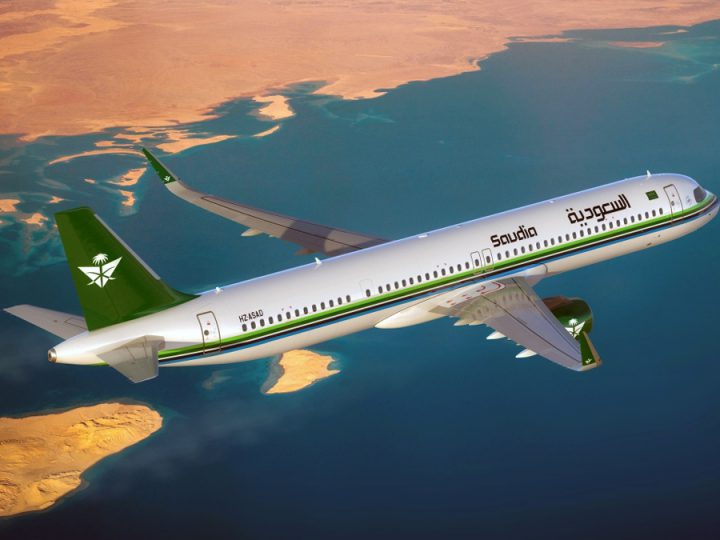
Immanuel Debeer | 14/04/2024
Saudia Stopover Program Guide: How To Get A Free Hotel & Transfer

Editorial note: We may not cover every product in this category. For more information, see our Editorial guidelines .
The top 5 travel debit cards in 2024.
Debit cards make paying easier, but which is the best debit card for travelling overseas?
Using travel money cards overseas is extremely handy for paying for shopping, taxis, corner shops and withdrawing cash at ATMs.
It's a great option as long your bank does not charge fees for foreign transactions or ATM withdrawals.
So, how do you find out where to get the best travel debit cards?
To save you time, we've compared a large number of debit cards for overseas travellers to help you make the right decision.

The Best Travel Debit Cards:
Wise travel card.
- Revolut Australia Card
Macquarie Transaction Account Debit Card
- HSBC Global Everyday Account Debit Card
ING Orange Everyday Account Debit Card
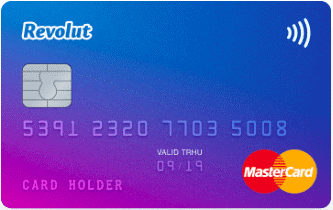
Revolut Card Offer
Sign up and get a $15 top-up . For new customers only, T&Cs apply .
Best Exchange Rate
- 40+ currencies available
- Best exchange rates globally
- One of the lowest conversion fee on the market
- No international transaction fees
- No annual or monthly fees
- Extremely low costs to send money overseas
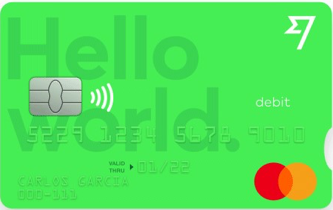
- Cross currency conversion fees are between 0.24–3.69%. AUD to USD, EUR or GBP was 0.42%, which is one of the lowest on the market
- Free cash withdrawals up to $350 every 30 days. However after that, Wise charge a fixed fee of $1.50 per transaction + 1.75%
- Daily ATM withdrawal is $2,700
- Issue up to 3 virtual cards for temporary usage
- It takes between 7 to 14 business days to receive your card
- Can be used wherever MasterCard is accepted
The Wise Travel Card is great for frequent travellers as it offers over 40 currencies at the inter-market exchange rate, which is the cheapest rate globally. In addition you can buy goods online from overseas with no transaction fee plus get the best exchange rate. However if you use ATMs frequently this is not the card to use due to the fees. Finally Wise Travel Card lets you transfer money to an overseas bank account with extremely low fees and the best exchange rate.
Our Wise Travel Card Review
Revolut - Low Fees
- 30+ currencies available
- One of the best exchange rates globally
- No annual or monthly fees for standard membership
- No initial card fee
- Instant access to a range of cryptocurrencies
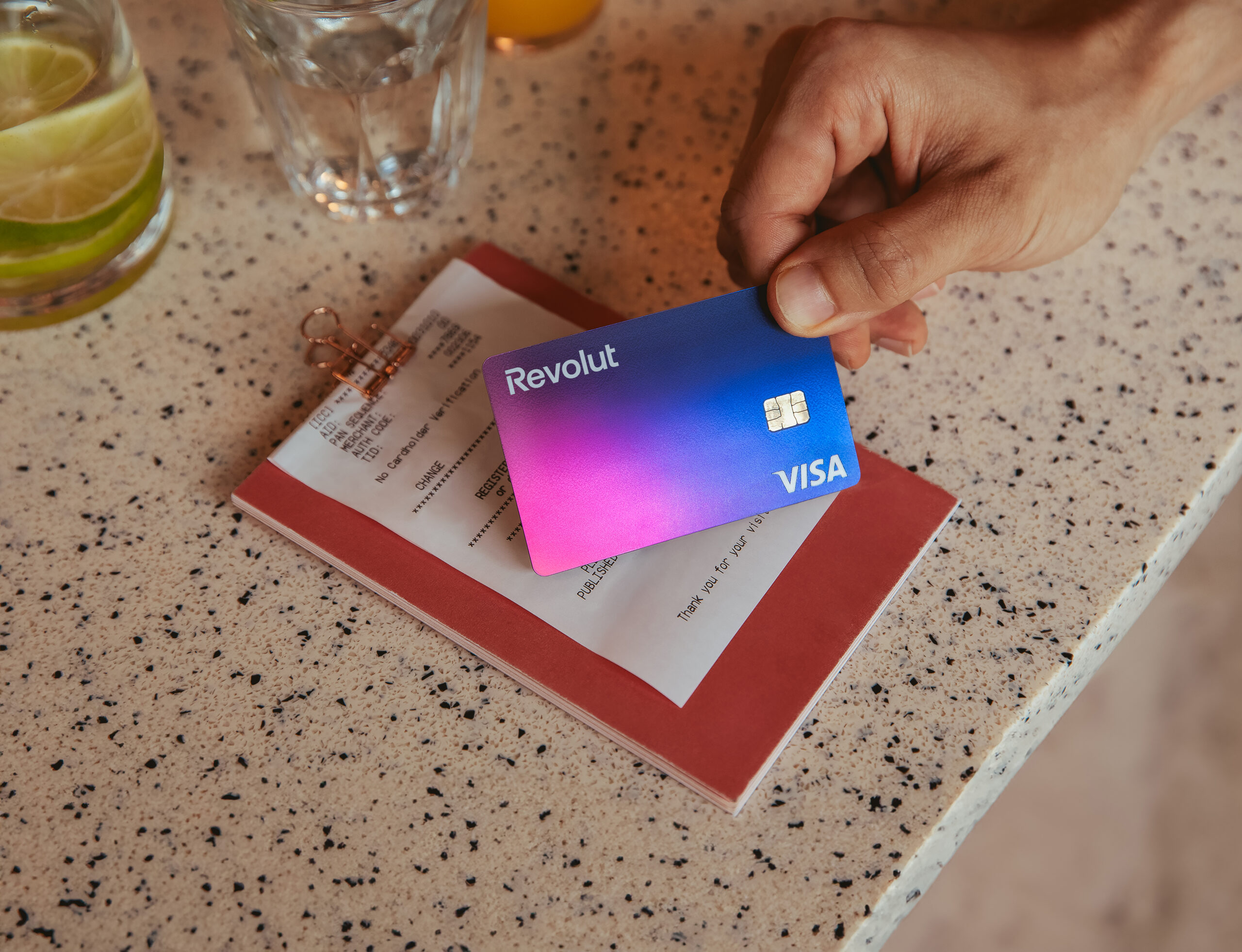
Read our Revolut Card Review
Revolut Travel Card
- No fee ATM withdrawals up to A$350, or 5 ATM withdrawals, whichever comes first, per rolling 30 day period and 2% of withdrawal amount (minimum charge of A$1.50) after that
- Exchanging currency on the weekend can incur a 1% mark-up fee
- Fees on international money transfers were introduced in April 2021.
- Can be used wherever Visa is accepted
The Revolut Travel Card is a decent option for those who travel a lot as it offers over 30 currencies at a great exchange rate, which is the cheapest rate globally. However if you exchange currency on the weekend you can incur a one-percent mark-up fee. In addition they have introduced fees for international transfers. Finally if you use ATMs frequently this is not the card to use due to the fees.
- No monthly fees
- No foreign transaction fee
- No ATM fees in Australia
- No ATM fees overseas
- Contactless limit with no PIN up to $200 per transaction
- Joint accounts available
- Discounts of up to 10% on eGift cards to use at over 50 leading retailers
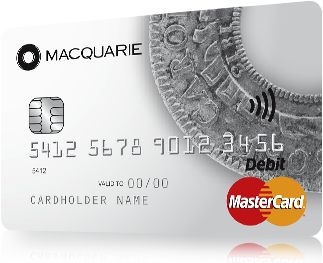
- Simple and easy to work out costs for account
- Can be used in Australia as an EFTPOS card
- Instant transfers can be made using PayID and OSKO
- Works with Apple Pay, Google Pay, Fitbit and Garmin
- Available to 14 year olds and older
- Easily lock and unlock your card in the app if your card is lost or stolen
- Multi award winning account including Mozo Best Everyday Savings for 2021
- $2,000 daily limit for ATM withdrawals
- Exchange rates are MasterCard exchange rates, which are normally 2% - 6%+ the market rate
- Added security with a mobile app that sends actionable push notifications for you to approve or deny online transactions and account activity
- Tools for spending each time you make a transaction, it’s automatically categorised into groups such as groceries, travel, leisure or technology. In addition you can see how you're spending at a glance and over time.
There's a lot to love about the Macquarie Bank Transaction account debit card starting with no fees, no foreign transaction fees, no ATM fees in Australia or overseas. In addition the only fee you will pay is the currency conversion charged by Mastercard.
The debit card works in Australia and the contactless limit is $200, which is super handy. It also works with Apple Pay, Google Pay, Fitbit and Garmin. Finally it has tools to help you track your spending, can be given to teenagers over 14 and is easy to lock or unlock your card through the app if lost or stolen.
HSBC Everyday Global Debit Card
- No initial card or closure fees
- No monthly or account fees
- No international ATM fees
- No cross currency conversion fees
- Lock in very competitive exchange rates before travel
- No maximum balance
- Earn 2% cashback
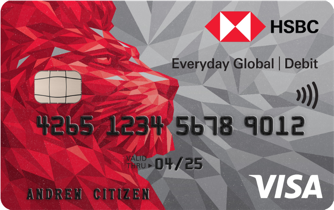
- 10 Currencies can be loaded are AUD, USD, GBP, EUR, HKD, CAD, JPY, NZD, SGD, CNY (currency restrictions apply to CNY)
- Awarded 5 gold stars by CANSTAR in 2021 for Outstanding Value
- Very competitive exchange rates on all currencies when you have currencies already loaded on your card
- ATMs within Australia need to be HSBC and overseas they need to display a VISA or VISA Plus logo, not be be charged fees
- Earn 2% cash back when you tap and pay with Visa pay wave, Apple Pay or Google Pay for purchases under $100. With a maximum of $50 cash back per month. In addition you need to deposit $2,000 or more into your Everyday Global Account each calendar month.
- Daily maximum ATM withdrawal is $2,000
- Fraud protection covered by Visa Zero Liability
The HSBC Everyday Global Debit Card is a good option to take travelling and to spend money in Australia with no international transaction fees, international ATM fees and monthly fees. In addition there is no maximum balance on currencies held and a 2% cash back incentive when you tap and pay under $100.
Finally it is one of the only travel cards that offers Chinese Yuan. To avoid ATM fees you need to find HSBC branches in Australia and only use ATMs overseas with a VISA or VISA Plus logo.
- No ATM fees
- No account keeping fees
- Can be used in Australia with no additional costs
- No fees for paying via bank transfer or Bpay
- Transfer limits can be set by user
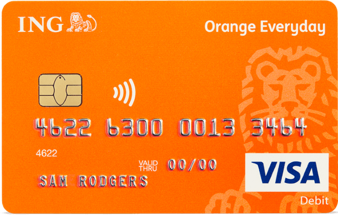
- As long as you you deposit at least $1000 and make at least 5 payments each month ING will waive international transaction fees and refund overseas ATM withdrawal fees
- Can be used in all countries
- Can be used in Australia to buy goods overseas and not pay international transaction fees
- Works with Apple Pay and Google Pay
- Visa currency conversion rates apply, which are normally 4% above market
The ING Orange Everyday Account Debit Card is a good card for most Australians travelling overseas for ATM access, with no fees. It also allows you to to buy goods online without an international transaction fee.
Furthermore you can use it in Australia for free and there are no fees to get your initial card, for account keeping or to top up your card. A word of caution however, if you travel overseas for longer than 1 month, you still need to deposit at least $1,000 and make at least 5 payments each month to get the rebates.
Learn more about the best travel money, credit and prepaid cards for travel

Prepaid Travel Card

Best Travel Card

Credit Card
The difference between a debit card and a travel card is that you preload a travel card with foreign currency before you leave. The exchange rate is set for your time overseas. Most preloaded currency cards have 10 different currencies on them for you to choose from.
A debit card only has Australian dollars in it. You pay a currency conversion fee every time you make an online overseas purchase or pay with your debit card overseas.
Using a debit card overseas is similar to how you use it in Australia and you wave your card over the charging device. You might be asked to key in your pin, which will be the same pin as you use in Australia. It is always advisable to let your bank know you are travelling overseas as they might block the transaction.
A travel card is better for currency exchange rates and a debit card is better for convenience. Both are equally good for security. A travel card has a cheaper currency exchange rate around 2% however a debit card is more expensive at around 4%. A debit card can be used in Australia once your travels are over and if you choose Macquarie , Up Bank , Citibank , HSBC or ING you will not pay for foreign transaction fees.
A good travel debit card will save you lots of money and does not charge monthly or account keeping fees. It does not charge a foreign transaction fee or fees to withdraw cash from ATMs in Australia or abroad. It has good security and is easy to transfer funds into when overseas.
You can use most Australian debit cards overseas, if you advise your bank you are travelling overseas in advance. In some cases you can not use your Australian debit card overseas, so it is best to check before you depart Australia.
The first thing to look for are no foreign transaction fees, these can be between 3-5%. Second, you need to look for a debit card that does not charge for overseas ATM withdrawals, as these can be $5 per transaction plus 3%. Therefore a cash withdrawal of $300 will withdraw $314 from your account.
Third, you need to look for a debit card with no monthly fees or account keeping fees. Finally you need to choose a debit card with good security and is easy to transfer money into while you are travelling overseas.
The pros of using a debit card overseas is that they are very convenient as you can use them when you return to Australia to pay for everyday items like groceries and fuel. They are generally accepted in most places around the world especially if they are linked to Visa or Mastercard.
The cons of using a debit card overseas is that they can get expensive if you choose one with foreign transaction fees, monthly fees and fees for withdrawing cash from ATMs.
Luckily the days of having to call an international number to report a stolen or lost card are gone. In most cases you should be able to notify your bank through the mobile app your debit card has been lost or stolen and they will deactivate your debit card immediately to stop unauthorised spending.
If you choose a Macquarie , Up Bank , Citibank , HSBC or ING debit card then you will not have any ongoing fees with an overseas debit card. If you choose the Commonwealth World, the NAB Platinum or Westpac Choice debit card you will have ongoing monthly fees.
It's simple. To move money to your debit card overseas, you login into the account you want to transfer money from and transfer your Australian dollars to the bank account that is linked to your debit card overseas. If your bank uses OSKO or Pay ID this should happen immediately, even if you are overseas at the time.
According to NerdWallet Mastercard gives the best currency conversion rates globally, giving better rates 70% of the time. This includes the major traded currencies such as the US dollar , Euro, Great British Pound , Australian dollar, Japanese yen , Hong Kong dollars, Canadian dollars , Singapore dollars , Swiss francs and New Zealand dollars . However Visa does give better currency conversion rate for Thai baht , Hungarian forint, Icelandic Krona and Tunisian dinar.
More Travel Card Guides
Learn more about the best travel money cards for your holiday destination.
ASIC regulated
Like all reputable money exchanges, we are registered with AUSTRAC and regulated by the Australian Securities and Investment Commission (ASIC).
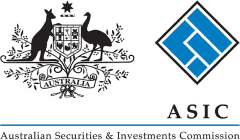
S Money complies with the relevant laws pertaining to privacy, anti-money laundering and counter-terrorism finance. This means you are required to provide I.D. when you place an order. It also means the order must be paid for by the same person ordering the currency and you must show your identification again when receiving your order.
Currency Experts
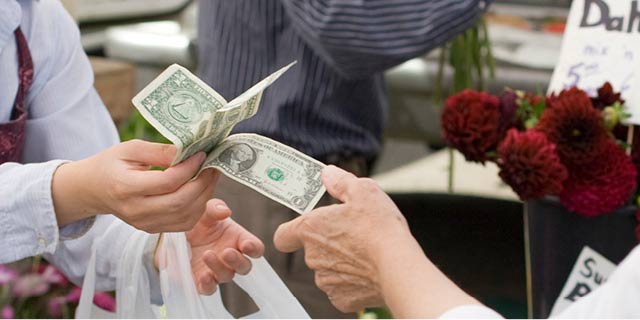
G - TMOZ - C&D Pizza Blog - Desktop Banner CTA (1).png


Why Travel Money

Best Travel Credit Cards of May 2024
14 best travel credit cards of 2024, best overall: chase sapphire preferred® card.
Why we chose it: The Chase Sapphire Preferred Card is an affordable option fit for beginners and experienced travelers. For a reasonable $95 annual fee, you get generous perks, including high bonus rewards, intro bonus, annual hotel credit and bonus anniversary points. Plus points can be redeemed for 25% more value toward travel through Chase Travel. Read our Chase Sapphire Preferred review .
- Earns flexible rewards that transfer to airline and hotel partners
- Get 25% more value when redeeming for travel booked through Chase Travel
- Generous welcome offer and bonus categories
- No intro APR
- No luxury travel perks like airport lounge access
Best for Travel Rewards: Chase Sapphire Reserve®
Why we chose it: The Chase Sapphire Reserve is one of the best premium travel cards thanks in large part to the generous rewards and outsized redemption value. On top of travel credits, lounge access and other airport perks, the card rakes in flexible Chase Ultimate Rewards points in a range of bonus categories. Plus cardholders get 50% more value when redeeming points for travel through Chase. Read our Chase Sapphire Reserve review .
- Comes with luxury travel benefits
- Generous welcome bonus and earning rates
- Get 50% more value for travel when redeeming points for travel through Chase Travel
- No intro APR offer
- $550 annual fee and $75 annual fee per authorized user
- Earns just 1X points on regular purchases
Best Premium Value: Capital One Venture X Rewards Credit Card
Capital one venture x rewards credit card.
Why we chose it: The Capital One Venture X Rewards Credit Card offers enhanced travel perks for a lower annual fee than other premium cards. For $395 per year, users get a $300 annual travel credit, a credit of up to $100 for Global Entry or TSA PreCheck membership, Priority Pass Select membership, access to Capital One airport lounges and more. Read our Capital One Venture X review .
- Comes with robust travel benefits
- Generous minimum earning rate of 2X miles on all other purchases
- Earns flexible miles that transfer to partners
- Transfer partners aren’t as good as some competing programs
- $300 annual travel credit must be used through Capital One Travel
- Fewer rewards bonus categories than some other premium cards
Best for Luxury Perks: The Platinum Card® from American Express
Why we chose it: The Platinum Card from American Express is best for luxury perks since, in our view, it comes with the most extensive list of credits and features. This includes the broadest airport lounge membership possible, airline fee credit for incidental fees and automatic Gold status with Hilton Honors and Marriott Bonvoy. Cardholders also earn a very generous welcome bonus and heightened rewards on eligible travel purchases. Read our Amex Platinum Card review .
- Comes with the best airport lounge membership available
- More than $1,500 in annual statement and merchant credits available
- Earns flexible Amex Membership Rewards points
- $695 annual fee and $195 annual fee for each additional Platinum Card ( see rates and fees )
- Earns just 1X points on other eligible non-category purchases
- Statement credits may be difficult to use
Best for Flat-Rate Rewards: Capital One Venture Rewards Credit Card
Capital one venture rewards credit card.
After spending $4,000 in first 3 months from account opening
Why we chose it: The Capital One Venture Rewards Credit Card comes with a promising flat rewards rate of unlimited 2X miles on all purchases and unlimited 5X miles on hotels and rental cars booked through Capital One Travel. This card also earns flexible miles that can be used for multiple purposes like travel statement credits, gift cards , travel bookings through Capital One or miles transfers to Capital One airline and hotel partners. Read our Capital One Venture Rewards card review .
- Earns impressive flat-rate rewards
- Miles come with flexible redemption options
Best With No Annual Fee: Wells Fargo Autograph℠ Card
Wells fargo autograph℠ card.
After spending $1,000 in purchases in the first 3 months
Why we chose it: For no annual fee, the Wells Fargo Autograph Card comes with a solid sign-up bonus and earns an unlimited 3X points on travel, gas, transit, restaurants, popular streaming services and phone plans, and 1X points on other eligible purchases. Read our Wells Fargo Autograph review .
- No annual fee required
- Earns 3X points in six popular categories
- Intro APR on purchases
- No transfer partners
- Few travel-specific benefits
Best Overall Hotel Card: World of Hyatt Credit Card
World of hyatt credit card.
Earn 30,000 bonus points after you spend $3,000 on purchases in your first 3 months from account opening. Plus, up to 30,000 more by earning 2 bonus points total per $1 spent in the first six months from account opening on purchases that normally earn 1 bonus point, on up to $15,000 spent.
Why we chose it: The World of Hyatt Credit Card is packed full of features. It offers an annual free night certificate each year after your cardmember anniversary, five elite qualifying nights per year just for having the card and a way to spend toward additional elite nights and an additional free night certificate each year.
- Category 1-4 free night certificate annually after your cardmember anniversary
- Earns two nights toward elite status for every $5,000 spent on the card
- Trip cancellation/interruption insurance, baggage delay insurance and lost luggage reimbursement
- Full welcome bonus requires costly spending
- Lackluster earnings outside of Hyatt stays
- Lower overall point value on hotel stays than some competing cards
Best for Budget-Friendly Delta Loyalists: Delta SkyMiles® Gold American Express Card
Why we chose it: The Delta SkyMiles® Gold American Express Card offers excellent value for its $150 ongoing annual fee. The card’s first free checked bag benefit applies to you and up to eight other people in your same reservation. When redeeming miles for Delta flights, you’ll receive a 15% off discount when using miles to book Award Travel on Delta flights through delta.com and the Fly Delta app. You’ll also get a $200 Delta flight credit when you spend $10,000 on the card in a calendar year. Finally, you can receive an annual statement credit of up to $100 when you use your card book hotel nights through Delta Stays bookings on delta.com. Read our Delta SkyMiles Gold review .
- Free first checked bag for you and up to eight other people on your reservation
- 15% off Award Travel when using miles on Delta flights (through delta.com and the Fly Delta app)
- $0 introductory annual fee for the first year (then $150)
- Earns only 2X miles on Delta purchases
- No ability to earn Medallion Qualifying Dollars (MQDs) using the card
- $200 Delta flight credit requires $10,000 in spending on the card in a calendar year
Best for Business Travel Rewards: Ink Business Preferred® Credit Card
Why we chose it: The Ink Business Preferred® Credit Card earns generous rewards on travel and in a range of popular business categories. Plus cardholders can earn 100,000 bonus points after spending $8,000 on purchases within three months of account opening. Read our Ink Business Preferred review .
- Earns flexible Chase Ultimate rewards points
- Get 25% more value when booking travel with points through Chase Travel
- Earns 3X points in popular eligible business categories (on the first $150,000 spent in combined purchases each account anniversary year, then 1X points)
- Bonus category spending caps limit rewards potential
- Earns just 1X points on all other regular purchases
Best for Business With No Annual Fee: The Blue Business® Plus Credit Card from American Express
Why we chose it: For no annual fee, the Blue Business Plus Credit Card offers 2X points on up to $50,000 spent in purchases each year, then 1X points on other purchases. Plus rewards earned fall within the flexible American Express Membership Rewards program. Read our Blue Business Plus card review .
- Earns Amex Membership Rewards points
- Get 2X points on the first $50,000 spent in purchases each year (then 1X points)
- Earns just 1X points after $50,000 in spending each year
- Small welcome bonus
- Limited travel-specific benefits
Best for Everyday Spending: Citi Premier® Card
Citi premier® card.
After spending $4,000 in the first 3 months of account opening, redeemable for $600 in gift cards or travel rewards at thankyou.com
Why we chose it: The Citi Premier Card offers a robust selection of bonus rewards categories. Not only do cardholders earn a generous sign-up bonus, but they also earn 3X points on restaurants, supermarkets, gas stations, air travel and hotels. All other purchases earn 1X points. Cardholders can also earn 10X points on hotels and car rentals booked through the Citi Travel portal (through June 30, 2024). Read our Citi Premier review .
- Earns flexible rewards for travel
- Generous 3X earning rate in five popular categories
- Elevated rate on eligible travel purchases via Citi Travel through June 2024
Best for Travel Rewards on Dining: American Express® Gold Card
Why We Chose It: The American Express Gold Card might be the ultimate dining card for travelers. It offers 4X Membership Rewards points at restaurants worldwide—that’s the most points you’re likely to earn without jumping through hoops like making dining purchases through a portal. Read our Amex Gold card review .
- 4X Membership Rewards points at restaurants worldwide (plus on takeout and delivery in the U.S.)
- 4X points at U.S. supermarkets on up to $25,000 per year in purchases (then 1X points)
- Up to $120 in Uber Cash annually
- Steep $250 annual fee
- Poor redemption value beyond airfare
- U.S. supermarket bonus rewards are capped at $25,000 in spending each year
Best for Travel and Transit: American Express® Green Card
American express® green card.
After spending $3,000 on purchases on your new Card in your first 6 months of Card Membership
Why We Chose It: The American Express Green Card offers 3X Membership Rewards points on almost every type of eligible travel and transit expense. If you prefer to earn travel rewards and want a single card to consolidate your expenses on, the Amex Green Card is likely your best choice.
- Earns 3X points on a wide variety of eligible travel and transit, plus at restaurants worldwide
- Earns transferable Membership Rewards points
- Offers trip delay insurance*, baggage insurance plan* and car rental loss and damage insurance*
- $150 annual fee
- Limited cash redemption options
- No introductory APR
Related Articles
- Best Rewards Credit Cards
- How To Choose a Credit Card
- How Many Credit Cards Should I Have?
A Closer Look at the Best Travel Cards
Best overall: chase sapphire preferred card.
Why we love this card: The Chase Sapphire Preferred earns Chase Ultimate Rewards points that transfer to airline and hotel partners like British Airways, Southwest Rapid Rewards and World of Hyatt, yet cardholders can also get 25% more value when redeeming points for travel through Chase.
Other reasons to love this card include its exceptional welcome offer (earn 60,000 bonus points after you spend $4,000 on purchases in the first three months from account opening, worth $750 redeemed through Chase Travel) and earning rates: 5X points on travel purchased through Chase Travel; 5X points on Lyft rides (through March 31, 2025); 3X points on dining, online groceries (excluding Target, Walmart and wholesale clubs) and select streaming services; 2X points on general travel; and 1X points on all other purchases.
Who should have this in their wallet: The Chase Sapphire Preferred Card is ideal for consumers who want to earn flexible travel rewards they can redeem in more than one way without having to pay hundreds of dollars toward an annual fee each year. That said, the fact you can redeem points for cash back, statement credits, gift cards and merchandise means the Sapphire Preferred can also work as a cash back credit card.
Other cards to consider: If you want a travel credit card with perks like airport lounge access or annual travel credits, you’ll have to be willing to pay a higher annual fee. In that case, you can consider cards like the Chase Sapphire Reserve and the Capital One Venture X Rewards Credit Card.
Read our review of the Chase Sapphire Preferred
Best for Travel Rewards: Chase Sapphire Reserve
Why we love this card: The Chase Sapphire Reserve starts new customers off with a welcome offer to earn 60,000 bonus points when they spend $4,000 within three months of account opening, and they also earn 10X points on hotels and rental cars booked through Chase; 10X points on Chase Dining purchases with Ultimate Rewards; 5X points on flights booked through Chase Travel; 5X points on Lyft rides (through March 31, 2025); 3X points on dining and general travel purchases (not purchased through Chase); and 1X points on everything else. Rewards on travel are after the $300 travel credit is spent each year.
Premium perks that come with the card include a $300 annual travel credit, an application fee credit for Global Entry, NEXUS or TSA PreCheck membership, Priority Pass Select airport lounge membership and a suite of premium travel insurance benefits.
Who should have this in their wallet: The Sapphire Reserve is for frequent travelers who want to earn flexible rewards they can use for direct travel bookings through Chase or point transfers to airlines and hotels. The ideal cardholder also wants luxury travel benefits like airport lounge access and annual travel credits.
Other cards to consider: For a more affordable premium travel card, consider the Capital One Venture X Rewards Credit Card. But for more extensive lounge access and the chance to earn more credits, look into the Amex Platinum Card.
Read our review of the Chase Sapphire Reserve
Best for Premium Value: Capital One Venture X Rewards Credit Card
Why we love this card: Despite the fact this card charges just $395 per year, it comes with a $300 annual travel credit, a fee credit for Global Entry or TSA PreCheck membership, Priority Pass Select membership, access to Capital One airport lounges and more. Users also earn flexible Capital One miles that can be redeemed for travel through Capital One Travel, used for gift cards, merchandise and travel statement credits or transferred to Capital One airline or hotel partners. Rewards include 10X miles on hotels and rental cars booked through Capital One Travel, 5X miles on flights booked through Capital One Travel and 2X miles on all other purchases.
Who should have this in their wallet: The Capital One Venture X Rewards Credit Card is for people who can utilize its airline and hotel partners or want to use their miles to book travel directly through Capital One. Individuals who want a card with airport lounge access at the lowest possible cost can also consider this premium travel credit card.
Other cards to consider: If you research Capital One airline and hotel partners and like what you see but want to pay a lower annual fee each year, you should also consider the Capital One Venture Rewards Credit Card ($95 annual fee). If you want airport lounge access and other premium benefits, however, you should check out the Amex Platinum and Chase Sapphire Reserve .
Read our review of the Capital One Venture X
Best for Luxury Perks: The Platinum Card from American Express
Why we love this card: The Platinum Card from American Express has so many perks and statement credits it’s hard to keep track. For example, cardholders get more than $1,500 in statement and merchant credit offers with the card, plus the broadest airport lounge membership possible (Global Lounge Collection), Gold status with Hilton Honors and Marriott Bonvoy with enrollment, access to Amex Fine Hotels + Resorts and plenty of other luxury travel perks.
Cardholders also earn a generous welcome bonus (earn 80,000 Membership Rewards points after you spend $8,000 on purchases on your new card in the first six months of card membership), plus 5X points on up to $500,000 spent each calendar year on flights booked directly with airlines or with American Express Travel, 5X points on eligible prepaid hotels booked via American Express Travel and 1X points on all other purchases.
Who should have this in their wallet: The Platinum Card from American Express is best for frequent travelers who can use most of its statement credit offers and benefits each year. Individuals who fly a lot and want access to the most airport lounges worldwide will also love the fact they can enter Priority Pass lounges, Amex Centurion lounges and even Delta Sky Clubs when they fly with Delta Air Lines. This card also works best for people who want to earn flexible points for travel that can be redeemed for airfare, hotel stays, car rentals and other travel in more than one way. After all, points earned with the card fall within the popular American Express Membership Rewards program.
Other cards to consider: If you want airport lounge access, consider premium travel credit cards like the Chase Sapphire Reserve or the Capital One Venture X, which charge annual fees of $550 and $395, respectively. You can pay an even lower annual fee if you give up some luxury travel benefits and pick a card like the Chase Sapphire Preferred or the Citi Premier.
Read our review of the Amex Platinum
Why we love this card: The Capital One Venture Rewards Credit Card earns a nice flat rewards rate of 2X unlimited miles on all purchases and 5X unlimited miles on hotels and rental cars booked through Capital One Travel. Plus, miles can be redeemed for options like statement credits to offset travel, gift cards, travel through Capital One or transfers to airlines and hotels. While the annual fee is just $95, cardholders get perks like a fee credit for Global Entry or TSA PreCheck membership every four years.
Who should have this in their wallet: The Capital One Venture Rewards Credit Card is ideal for frequent travelers who want some upgraded perks without paying more than $100 per year for their travel credit card. The card’s flat rewards rate also makes it a good choice for consumers who don’t want to keep track of confusing earning rates or bonus categories. Finally, this card works well for people who want to use their miles for travel but also want some flexibility in how they redeem them.
Other cards to consider: Several other flexible travel credit cards let users transfer rewards to airlines and hotels without paying more than $100 in annual fees each year. For example, you could consider the Citi Premier or the Chase Sapphire Preferred, which earn points in the Citi ThankYou Rewards and Chase Ultimate Rewards programs, respectively.
Read our Capital One Venture Rewards Credit Card review
Best for No Annual Fee: Wells Fargo Autograph Card
Why we love this card: The Wells Fargo Autograph Card earns 3X points in so many bonus categories with no annual fee required. The welcome offer is also higher than other travel and cash back credit cards with no annual fee (30,000 bonus points when you spend $1,500 in purchases in the first three months), and rewards are fairly flexible. For example, you can redeem rewards with this card for travel, gift cards, statement credits or PayPal purchases. The card also has more benefits than one would think, including cellphone protection, auto rental coverage, travel and emergency assistance services and roadside dispatch.
Who should have this in their wallet: The Wells Fargo Autograph Card is best for people who want to earn rewards with no annual fee required, as well as those who want some flexibility when it comes to cashing in their rewards. The intro APR offer on purchases also makes this card a good option for people who want to earn rewards on a large purchase and then pay it down interest-free for the first year.
Other cards to consider: If you want to earn travel rewards with no annual fee required, several top cards can fit the bill. For example, you could also look at the Amex EveryDay® Credit Card, the Discover it® Miles and the Capital One VentureOne Rewards Credit Card.
Read our Wells Fargo Autograph Card review
Why we love this card: The World of Hyatt Credit Card offers 4X points on Hyatt hotels, an annual free night certificate and a second free night certificate once you spend $15,000 in a calendar year. The card also helps you earn elite status with Hyatt. You start out with World of Hyatt Discoverist status and five elite-qualifying night credits just for having the card, plus you earn two bonus elite night credits for every $5,000 you spend on the card. That’s plenty of value for a $95/year card.
Who should have this in their wallet: The World of Hyatt Credit Card is a great choice for anyone who stays at Hyatt hotels at least a few times a year. If you stay at Hyatt hotels occasionally and can make use of the annual category 1-4 free night, you’re likely to get value in excess of the card’s $95 annual fee. Those who stay at Hyatt hotels often enough to pursue Hyatt status will find that the card both helps boost their status and offers the best rewards value on Hyatt stays of any card.
Other cards to consider: If you want a credit card that offers a free night certificate, the IHG One Rewards Premier Credit Card and the Marriott Bonvoy Boundless® Credit Card also offer a free night annually each account anniversary just for having the cards.
Why we love this card: The Delta SkyMiles® Gold American Express Card comes with plenty of features and benefits. The card’s first checked bag free benefit applies to everyone in your reservation—up to eight companions—making it a great value for family travelers. The $100 Delta Stays credit offers easy value when you book a hotel stay through Delta Stays on delta.com and the $200 Delta Flight credit you’ll receive after spending $10,000 in a calendar year should be easy to use for loyal Delta flyers.
Who should have this in their wallet: Anyone who regularly checks bags on Delta and doesn’t already have Delta elite status should get the Delta SkyMiles® Gold American Express Card. The card will pay for itself in saved checked bag fees after just three round trips each year by our estimation.
Other cards to consider: If you’re pursuing Delta elite status, consider holding one of the airline’s more premium cards. The Delta SkyMiles® Platinum American Express Card and the Delta SkyMiles® Reserve American Express Card both earn the Medallion Qualifying Dollars you’ll need to earn frequent flyer status with Delta.
Best for Business Travel Rewards: Ink Business Preferred Credit Card
Why we love this card: The Ink Business Preferred Credit Card earns 3X points on up to $150,000 in spending each anniversary year in the following categories (then 1X points): shipping purchases; advertising purchases made with social media sites and search engines; internet, cable and phone services; and travel. You earn 1X points on all other purchases.
Rewards fall within the Chase Ultimate Rewards program, so points can be redeemed for cash back, gift cards, merchandise, travel through Chase Travel (for 25% more value) or 1:1 point transfers to Chase airline and hotel partners. Benefits for business owners include free employee cards, primary auto rental coverage when renting a car for business purchases, cell phone protection, trip cancellation and interruption insurance, purchase protection, extended warranty protection and more.
Who should have this in their wallet: The Ink Business Preferred is for business owners who spend a lot in its bonus categories and want to earn travel rewards points they can use in more than one way. Many business owners also pair this card with the Chase Sapphire Preferred or Chase Sapphire Reserve as their personal card since Chase lets users pool rewards in one account for convenience (and premium redemptions).
Other cards to consider: If the bonus categories don’t fit your spending, the no-annual-fee Amex Blue Business Plus offers a flat rate of 2X points on up to $50,000 in purchases each year, followed by 1X points.
Read our review of the Ink Business Preferred
Best for Business With No Annual Fee: Blue Business Plus Credit Card
Why we love this card: The Blue Business Plus Credit Card earns Amex Membership Rewards points with no annual fee required. While the welcome bonus is on the small side (earn 15,000 Membership Rewards points after you spend $3,000 in purchases with the card in the first three months), cardholders can earn 2X points on up to $50,000 spent on purchases each year, then 1X points on other purchases.
Who should have this in their wallet: This business credit card is ideal for business owners who want to earn Amex points without paying an annual fee each year. Many consumers pair this card with a Membership Rewards card for consumers such as the Amex EveryDay, the American Express® Gold Card, and the American Express® Green Card.
Other cards to consider: There are few other business credit cards to consider if you want a card for travel with no annual fee that’s specifically for small businesses and entrepreneurs. However, you can consider consumer credit cards for travel with no annual fee required, including the Discover it® Miles and the Capital One VentureOne.
Read our review of the Amex Blue Business Plus
Best for Everyday Spending: Citi Premier Card
Why we love this card: The Citi Premier Card is a solid choice as a top-of-wallet card due to its bonus category potential. The card earns 3X points on restaurants, supermarkets, gas stations, air travel and hotels; 10X points on hotels and car rentals booked through the Citi travel portal (through June 30, 2024); and 1X points on other purchases. While a $95 annual fee applies, benefits like a $100 annual hotel savings on a $500+ hotel stay booked with Citi Travel help make up for it. Also note that this card earns Citi ThankYou points that can be redeemed for gift cards, merchandise, travel through Citi or transfers to Citi ThankYou airline and hotel partners.
Who should have this in their wallet: The Citi Premier Card is best for people who want to earn 3X points in as many categories as possible, as well as those who want some flexibility in how they redeem their rewards. This card also works well for people who have a cash back credit card from Citi that they use for points pooling.
Other cards to consider: The Wells Fargo Autograph is another flexible credit card for travel that earns 3X points in a bunch of different categories, yet with no annual fee. If you want points that transfer to partners with an annual fee below $100 each year, consider the Chase Sapphire Preferred or even the Amex EveryDay.
Read our review of the Citi Premier Card
Best for Travel Rewards on Dining: American Express Gold Card
Why we love this card: Almost every rewards card that earns extra points for dining at any restaurant worldwide will give you at most three points per dollar. The Amex Gold Card gives you 4X points. If restaurants worldwide (plus takeout and delivery in the U.S.) is one of your biggest spending categories, this bonus to the amount of rewards you earn can really add up. Plus, the card offers respectable rewards of 4X points on up to $25,000 a calendar year at U.S. supermarkets (then 1X) and 3X points on flights booked directly with airlines or on amextravel.com.
Who should have this card in their wallet: If you are invested in the Membership Rewards ecosystem and know how to use the points for high-value redemptions, the Amex Gold Card is a rewards powerhouse. The Gold card can earn you a great return on your worldwide restaurant spending and up to $25,000 of charges you make at U.S. supermarkets a calender year (4X points before cap, then 1X).
Other cards to consider: If you prefer earning travel rewards that are easier to use, the Chase Sapphire Preferred or Chase Sapphire Reserve might be a better bet. Both cards earn 3X points on dining at restaurants—rewards that can be easily redeemed for cash back, travel or transferred to travel partners.
Best for Business Travel Expenses: American Express Green Card
Why we love this card: With the Amex Green Card, you’ll earn 3X Membership Rewards on core travel expenses like eligible airfare and hotels, but you’ll also earn increased rewards on most other eligible travel expenses like tours, cruises, travel purchases on third party websites, rideshare, tolls and dining at restaurants worldwide. If you’re after travel rewards, you can do pretty well carrying only the Amex Green Card when you travel.
Who should have this card in their wallet: The frequent traveler who wants a single card that offers a good rate of rewards on all of their travel purchases should carry the Amex Green Card. The card not only offers 3X Membership Rewards on almost every eligible purchase you’ll make on the road, but it also provides essential travel insurance protections.
Other cards to consider: If cash-like rewards on your travel is your preference, you can earn rewards on most of your travel and transit expenses with the Wells Fargo Autograph Card. You won’t get the travel protections that you will with the Green Card, but you will pay no annual fee for the card.
What Is a Travel Credit Card?
A travel credit card is a type of rewards credit card that offers points that can be redeemed for travel and other options. Many travel credit cards also offer travel-specific benefits that can apply in certain situations, such as free checked bags when flying with an airline or late checkout when staying with specific hotel brands.
While some travel credit cards earn airline miles for a specific airline or hotel points that work within a specific hotel loyalty program, other cards earn flexible travel rewards points that can be redeemed for several flexible options. Additional travel credit card benefits can also be included, such as trip cancellation and interruption insurance, auto rental coverage, roadside dispatch, automatic elite status, annual travel credits, airport lounge access and more.
How Do Travel Credit Cards Work?
How travel credit cards work depends on the type of card and the program its rewards fall in. However, all travel credit cards have certain things in common. For example:
- Travel credit cards tend to offer welcome bonuses when you meet a minimum spending requirement within a few months of account opening.
- You can earn travel rewards points (or miles) based on spending and the card’s earning structure.
- Some cards offer bonus points or miles in certain categories, while others do not.
- Travel credit card benefits (e.g. travel insurance, annual travel credits, airport lounge access, free checked bags, etc.) can apply, although these perks vary widely by card.
- Travel credit card annual fees range from $0 all the way up $695, and there are cards for consumers as well as businesses.
Other than the card amenities that apply specifically to travel, cards in this niche work like other types of credit cards. All travel credit cards give consumers a line of credit they can borrow against, and they can avoid credit card interest if they pay their statement balance in full by their payment due date. When consumers don’t pay their balance in full, they get charged interest based on the average daily balance and the card’s annual percentage rate (APR).
Types of Travel Credit Cards
As you decide on a travel credit card for your wallet, you should know about the types of cards that are out there. This can help you figure out which travel credit card is best for you based on the type of rewards you want to earn and the benefits you desire.
- General travel credit cards: Some cards are considered general travel credit cards because they earn bonus points or miles in multiple categories and let you redeem rewards for travel without offering a lot of travel-specific perks or benefits. Cards in this category do not let you transfer points to airline and hotel programs like flexible travel credit cards do.
- Flexible travel credit cards: Flexible travel credit cards fall within programs like Amex Membership Rewards, Capital One miles, Chase Ultimate Rewards and Citi ThankYou Rewards, and they let you redeem rewards for travel through a portal or rewards transfers to airlines and hotels affiliated with the program. Premium cards in this category may also come with benefits like airport lounge access, annual travel credits and robust travel insurance protections.
- Co-branded airline cards: Co-branded airline credit cards are offered by card issuers alongside frequent flyer programs like American Airlines AAdvantage and Delta SkyMiles. Cards in this category earn miles that are redeemable for flights with the airline itself or its partners, and they can come with perks like free checked bags, priority boarding, airport lounge access and more.
- Co-branded hotel cards: Hotel brands like Hilton Honors and World of Hyatt also offer co-branded credit cards alongside major card issuers . Cards in this category earn hotel points that can be used for free award stays, suite upgrades and other on-site benefits, and they tend to come with perks like automatic elite status, early check-in and late checkout. Some premium hotel credit cards also come with annual travel credits and airport lounge membership.
How To Choose the Best Travel Credit Card
The best travel credit card for one person can be totally different for another, mostly because there are so many variables to keep in mind. Not only are there different types of travel rewards you can earn, but earning rates and cardholder perks and fees vary widely by product.
As you look for the right travel credit card for what you’re hoping to get in return, keep the following factors in mind.
Type of Rewards
First off, you’ll want to think over the type of travel rewards you want to earn, whether that’s flexible points, airline miles or hotel points. If you fly with a specific airline or stay with a specific brand of hotels often, you’ll have to weigh the pros and cons of earning rewards that are specific to that program versus earning flexible rewards that may or may not transfer to your favorite travel brands.
Redemption Options
Speaking of that, make sure you have a general idea of the redemption options available for the rewards you earn, and keep in mind that airline miles and hotel points tend to be more limited overall. If you want rewards that are as flexible as they can be, consider picking up a flexible travel credit card that lets you redeem rewards through a portal or transfer to a range of airline and hotel partners.
Cardholder Benefits
Also consider the perks you want to get with your credit card for travel, keeping in mind that some cards offer general benefits and others offer more specific perks. For example, airline credit cards tend to offer benefits like free checked bags and priority boarding, whereas hotel credit cards offer hotel-specific perks like entry-level elite status, early check-in and late checkout. Meanwhile, flexible travel credit cards tend to offer more general benefits like fee credits as reimbursement for Global Entry or TSA PreCheck membership or Priority Pass Select airport lounge membership.
Learn more about the benefits found with some of the best travel rewards cards:
- New Amex Delta SkyMiles benefits (and fees)
- Amex Platinum benefits
- Amex Gold Card benefits
- American Express® Business Gold Card benefits
- Chase Sapphire Reserve benefits
- Chase Sapphire Preferred benefits
Earning Rates
Also look at the earning rates travel credit cards offer and compare them to see which cards would net you the most in rewards over time. If you spend a lot of money in specific categories each month like gas, groceries or travel, it can help to look for cards that offer bonus points in these categories.
Welcome Offers
Consider travel credit card welcome bonuses and see which ones entice you the most. If a card has a high minimum spending requirement to earn a welcome bonus, make sure you can easily meet it with regular, organic spending and bills within the timeline required.
If you have to spend $4,000 on purchases within three months of account opening, for example, that breaks down to spending at least $1,334 on purchases each month for the first three consecutive months in a row after becoming a cardholder.
Travel Protections
Although you might be tempted to book your travel with your card that earns the greatest amount of rewards, you should also consider what travel protections your card provides. Many travel credit cards offer a suite of travel protections that can be far more valuable than a few marginal points if things go wrong. Here are a few of the essential travel protections that many travel cards offer.
- Trip delay insurance can cover incidental expenses and even an overnight stay if travel you book with your card is delayed significantly or overnight. Booking a trip with a card that offers this benefit can mean that you’re not out hundreds of dollars if you suddenly need to check into a hotel for an overnight flight delay.
- Auto rental collision damage waiver insurance can cover damage to or theft of a rental car you book using your card. Ideally, you’d rent a car using a card that offers primary insurance, which can provide protection without requiring you to make a claim to your personal auto insurance. Keep in mind that this benefit doesn’t cover liability and often doesn’t cover car-sharing services like Turo.
- Trip cancellation and interruption insurance may cover reimbursement of non-refundable prepaid travel expenses in the event that your trip gets interrupted or canceled for a covered reason. Which expenses this benefit covers vary widely by card—some cards only cover prepaid travel by common carrier, while others will cover expenses like tours and lodging booked through travel providers.
Finally, compare travel credit cards based on their annual fees, and make sure you feel comfortable with the annual fee you’re planning to pay. If a credit card for travel you’re considering charges an annual fee, look closely at its benefits and rewards to make sure you’re getting more value out of the card than its annual fee the first year. Also check for other fees like foreign transaction fees, but note that credit cards geared to travel usually don’t charge them.
You can also look at cards based on their variable interest rates and intro APR offers. That said, you’ll typically only want to get a travel credit card if you plan to pay off your purchases in full each month. If you carry a balance on your card or end up in long-term debt, the variable rates you pay will more than wipe out the rewards you earn.
What Are Your Points and Miles Worth?
How much points and miles are worth may not seem like a big consideration, but this is one of the most important factors to keep in mind as you compare card earning rates and redemption options. After all, some rewards points are worth considerably more than others, and some cards have different redemption rates depending on how you use your points.
Knowing how much your points are worth can help you decide if a travel credit card is the right fit for you. For example, Amex Membership Rewards points are worth an average of 1.19 cents per point according to Newsweek valuations. For maximum value, you’ll need to transfer your points to an airline partner.
Other Amex redemption options aren’t as valuable. You can redeem Amex points for airfare through AmexTravel.com at 1 cent per point. But points are only worth 0.6 cents per point if you redeem for statement credits and 0.7 cents per point for many travel redemptions through Amex Travel.
If cash back is your preferred redemption option, a cash back credit card is likely a better fit over an Amex travel card. And if you’re not booking flights through Amex travel or transferring to a high-value transfer partner, a different travel rewards card could give you better value when redeeming your rewards.
Also note that similar points from different programs can be worth varying amounts, and this can skew how generous the earning rates and welcome bonuses appear with different cards. For example, Hilton Honors points are worth an average of 0.41 cents each, whereas World of Hyatt points are worth 2.11 cents each based on our internal valuations.
*Eligibility and Benefit level varies by Card. Terms, Conditions, and Limitations Apply. Please visit americanexpress.com/benefitsguide for more details. Underwritten by Amex Assurance Company.
Frequently Asked Questions
What credit score do you need for the best travel credit cards.
Minimum credit score recommendations vary by card product and card issuer. But the best travel credit cards are geared toward individuals with good to excellent credit (or a FICO Score of 670 and up).
What Is the Best Credit Card for Travel Points?
The best credit card for travel rewards can vary based on the type of rewards, fees charged and perks included. However, some of the best travel credit cards on the market today include the Chase Sapphire Preferred, Chase Sapphire Reserve and Capital One Venture X.
Do I Have To Pay Interest on a Credit Card?
Avoid interest completely on credit cards by paying your card’s statement balance in full by your card’s payment due date each month. Some cards also come with introductory APRs for purchases, balance transfers or both, yet this isn’t a common feature among credit cards for travel rewards.
The post Best Travel Credit Cards of May 2024 first appeared on Newsweek Vault .
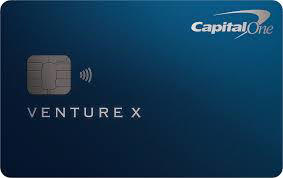
Macquarie Bank to go completely cashless this month
An Australian bank will go completely cashless from later this month as it switches to a fully digital offering.

ASX lifts after Fed rates news
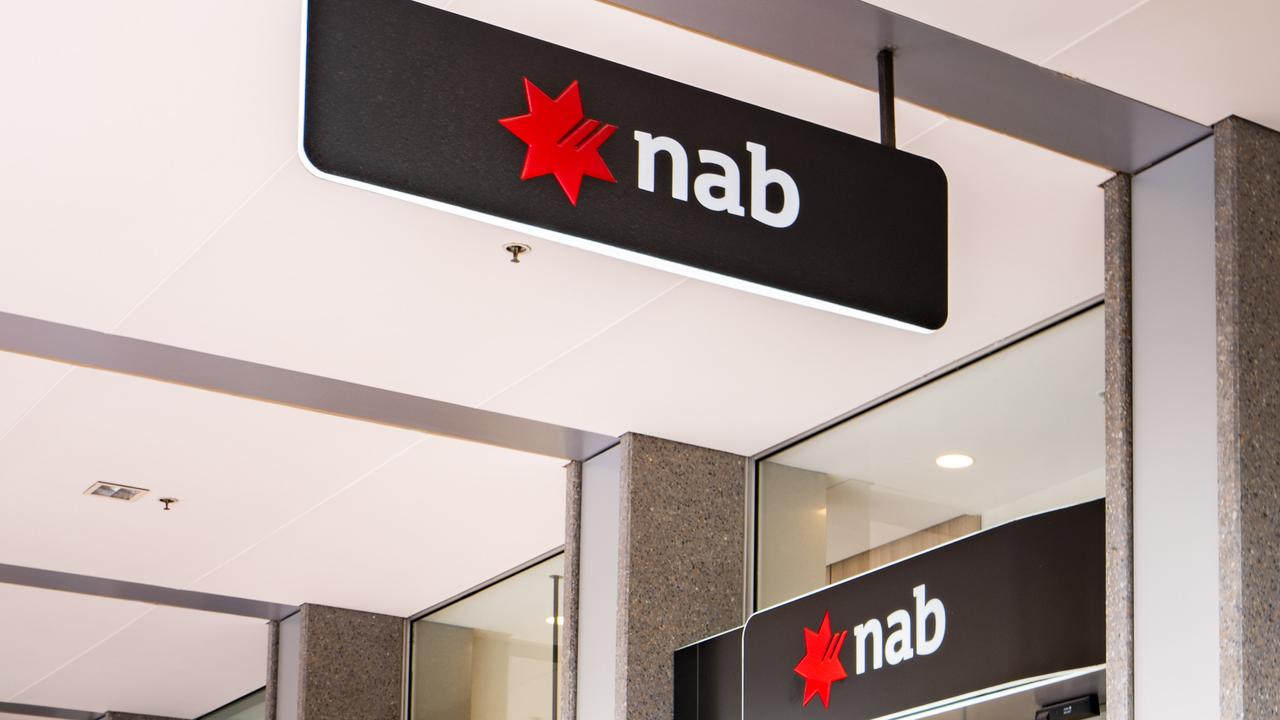
NAB earnings miss amid profit squeeze

ASX sinks on Wall St sell-off, Fed fears
Macquarie Bank customers will no longer be able to use cash at its branches from later this month as part of its transition to a fully digital model.
The bank first announced in September last year that it would phase out cash and cheque services across all its banking and wealth management products from January to November 2024.
“Cash and cheque services (deposits and withdrawals) may not be available at Macquarie offices from May 20, 2024,” the bank said at the time.
From May 20 customers will also be unable to order a new cheque or deposit book.
Phone banking services were ended at the start of March.
“Instead, you’ll be able to make payments digitally — a safer, quicker, and more convenient way to bank,” Macquarie said.
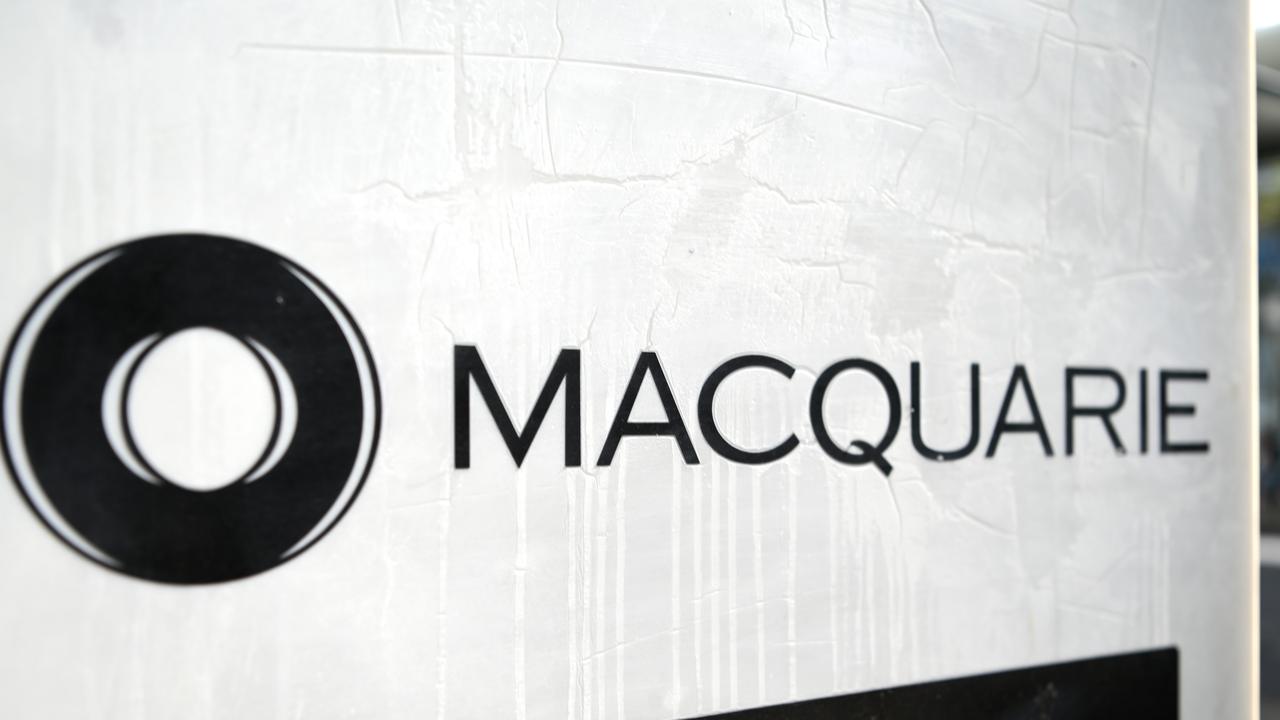
Macquarie is also ending its partnership with NAB branches, meaning cash and cheque deposits and withdrawals won’t be available for Macquarie customers at NAB branches from November 1.
Following Macquarie’s announcement last year, the big four banks rushed to reassure customers that they would maintain in-branch cash services.
However Commonwealth Bank, NAB and ANZ have stopped handling cash in a few branches, and banks’ efforts to make it more difficult for customers to transact in cash have sparked backlash.
According to the Australian Banking Association (ABA), just under 99 per cent of all customer interactions with banks now occur digitally, while more than 1600 Australian bank branches closed between 2017 and 2022.
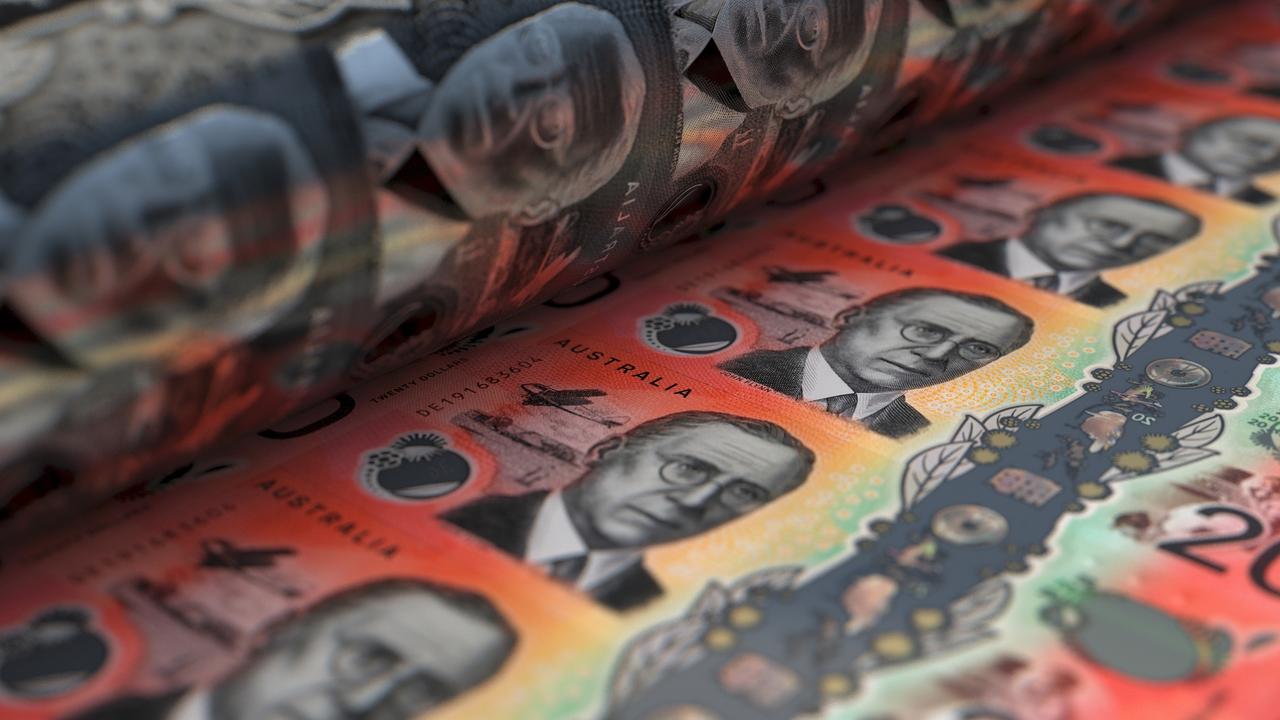
The Reserve Bank says the Covid pandemic accelerated the decline in cash use.
Only around 13 per cent of payments were made using cash in 2022, according to the RBA’s consumer payments survey, down from 70 per cent in 2007.
Meanwhile Australian Bureau of Statistics (ABS) data reveals a dramatic drop in ATM use in recent years, down from 78 million withdrawals in December 2008 to only 30 million in June 2023.
The pandemic also saw more businesses refusing cash altogether, although cash acceptance remains high overall at 94 per cent in June 2022, from 99 per cent in February 2020, according to the RBA.
“I’d say we’ll be functionally cashless by the end of 2025 — it’ll just be a complete rarity,” Richard Holden , professor of economics at UNSW Business School, told news.com.au last year.
“But unless the government gets involved to accelerate the process I think we’ll be actually cashless by 2030.”
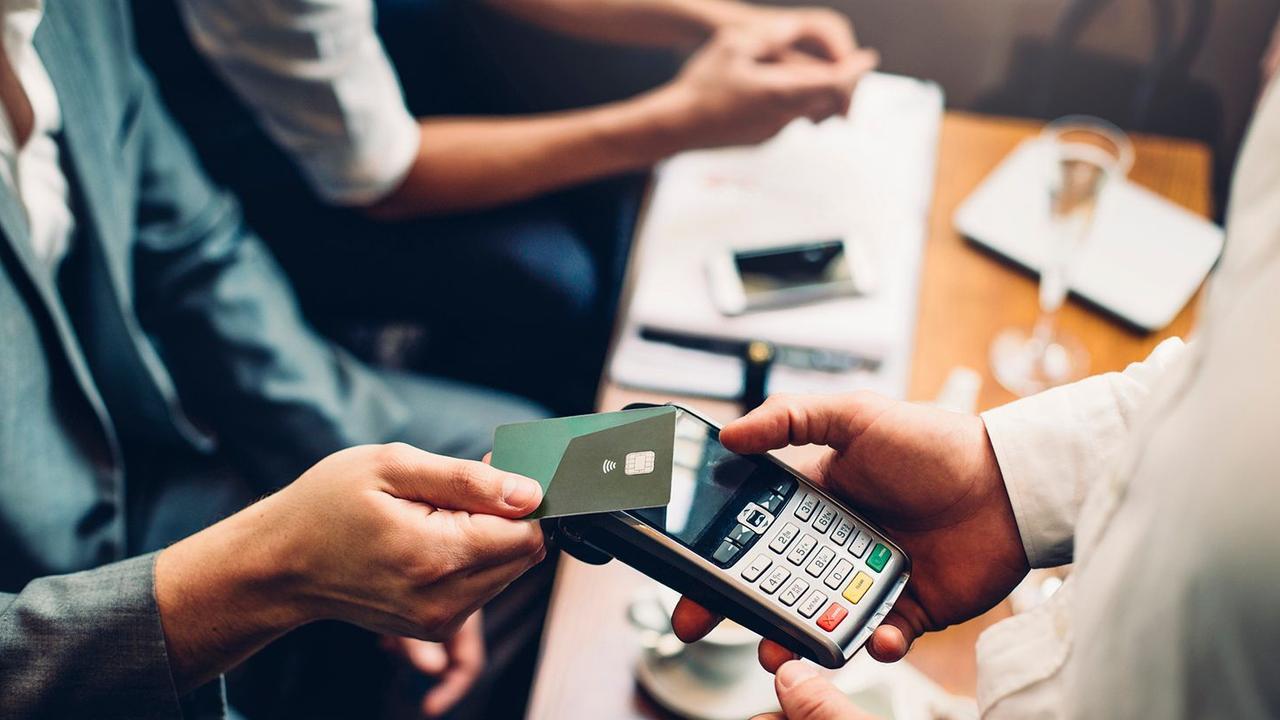
Prof Holden argued there were very few genuine use cases for cash “other than illicit acts or people who want to use cash to hide things from people”.
But Chris Vasantkumar, a lecturer at Macquarie University whose research includes the “anthropology of cash and cashlessness”, argued cash was “unlikely to go away completely”.
“On a personal level, some folks (indeed some societies) have serious concerns about lack of privacy — this is the flip side of a popular argument for moving to cashless transactions — decreased crime as a result of increased transparency,” he said.
“But one person’s transparency is another person’s surveillance. How much information about our economic behaviour are we comfortable giving up?”
More Coverage

Dr Angel Zhong, an associate professor of finance at RMIT , predicted a cashless society where digital payments would be over 90 per cent but “it does not mean that cash as a legal tender will lose value or disappear from society”.
“People who don’t use cash might still be concerned about the security of their digital transactions and the safety of their financial information,“ she said.
“Even though they don’t use cash, people might still be wary of becoming too dependent on digital technology for everyday transactions.”
Australian shares notched a tepid bounce on Thursday following some dovish rhetoric from the US Fed and positive sentiment around half-year results from NAB.
Despite the decline in earnings, freshly minted NAB boss Andrew Irvine hinted that the competitive home loan market was easing.
Aussie shares slumped on the first day of the new month as anxieties mount about US inflation and interest rates.
Australia's Macquarie Posts 32% Fall in Full-Year Profit
Australia's Macquarie Posts 32% Fall in Full-Year Profit

FILE PHOTO: Macquarie Group's corporate logo is pictured on the wall of the Sydney headquarters after the Australian bank's full year results were announced, May 6, 2016. REUTERS/Jason Reed/File Photo
(Reuters) -Australia's Macquarie Group posted a 32% drop in its full-year profit on Friday due to weaker performance across its commodities, global markets and asset management businesses.
A normalisation in commodity prices compared with last year and weakness in mergers and acquisitions activity in Australia at a time of high interest rates and lower asset realisations in green investments impacted Macquarie's bottomline in fiscal 2024.
Its commodities and global markets business, its top profit-generating arm that offers financing and lending services to clients dealing in commodity and financial markets, recorded an annual profit of A$3.21 billion, 47% lower than last year.
The financial conglomerate's profit attributable for the year ended March 31 came in at A$3.52 billion ($2.31 billion), compared with A$5.18 billion a year ago.
That was largely in line with a Visible Alpha consensus of A$3.51 billion, according to UBS.
The company declared a final dividend of A$3.85 per share, down from A$4.50 per share last year.
($1 = 1.5228 Australian dollars)
(Reporting by Sameer Manekar and John Biju in Bengaluru; Editing by Pooja Desai)
Copyright 2024 Thomson Reuters .
Tags: Australia
The Best Financial Tools for You
Credit Cards

Personal Loans

Comparative assessments and other editorial opinions are those of U.S. News and have not been previously reviewed, approved or endorsed by any other entities, such as banks, credit card issuers or travel companies. The content on this page is accurate as of the posting date; however, some of our partner offers may have expired.

Subscribe to our daily newsletter to get investing advice, rankings and stock market news.
See a newsletter example .
You May Also Like
Best blue-chip dividend stocks to.
Glenn Fydenkevez May 2, 2024

9 of the Best REITs to Buy for 2024
Wayne Duggan May 2, 2024

Pros and Cons of Buy and Hold
Kate Stalter May 2, 2024

10 ETFs to Build a Diversified Portfolio
Tony Dong May 2, 2024

Best Green Cryptocurrencies
Jeff Reeves May 1, 2024

5 of the Best Stocks to Buy Now
Ian Bezek May 1, 2024

The National Debt and Your Investments
Coryanne Hicks May 1, 2024

5 Best Vanguard Money Market Funds
Marc Guberti May 1, 2024

8 Best Income ETFs to Buy in 2024
Marc Guberti April 30, 2024

10 of the Best Stocks to Buy for 2024
John Divine April 30, 2024

Inside the New DOL Fiduciary Rule Change
Julie Pinkerton April 30, 2024

6 Risky Stocks for Aggressive Investors
Ian Bezek April 30, 2024

7 Best Cryptocurrency ETFs to Buy
Tony Dong April 30, 2024

Pros and Cons of Fee-Only Advisors
Kate Stalter April 29, 2024

Pharmaceutical Stocks to Buy for Income
Wayne Duggan April 29, 2024

10 Best Low-Cost Index Funds to Buy
Tony Dong April 29, 2024

5 Sectors Where Inflation Is Highest

10 Best Growth Stocks to Buy for 2024
Wayne Duggan April 26, 2024

7 High-Risk, High-Reward Stocks to Buy
Jeff Reeves April 26, 2024

5 Best Gold ETFs for 2024
Coryanne Hicks April 26, 2024

Stock Market Today: Dow ends over 300 points higher as traders eye Apple earnings
Follow all the latest u.s. market action for thursday here..

COMMENTS
Everything you need to know before you travel overseas and use your accounts abroad such as fees, exchange rates, notifying us and travel insurance. ... Credit card travel insurance; Notify us about overseas travel; ... none of the Macquarie Group entities referred to are authorised deposit-taking institutions for the purposes of the Banking ...
Cash Passport™ Platinum Mastercard®. Simply outsmart travel money. Load up to 11 currencies and use it at millions of locations worldwide everywhere Mastercard is accepted. Load, spend and top up your card on the go, so you're always in control. Manage your account. Track spend, reload, or move money between currencies online, anywhere ...
The Cash Passport Platinum card is made from 100% recycled PVC. You'll know your helping to reduce the environmental impact of your wallet when you see the Card Eco Certification imprint on your Cash Passport card. Mastercard established its sustainability efforts more than a decade ago, and continues to develop programs that help consumers ...
Macquarie Credit Union is here to help with your travel needs and has partnered with Cash Passport TM to ensure we have you covered whilst home and away. Cash Passport TM is your new best friend whilst you travel the world. With the option to load 11 currencies and use it at millions of locations worldwide (everywhere Mastercard is accepted), you can't leave the country without it.
Australia Post Travel Platinum Mastercard. Available online or at post offices. Currencies: AUD, USD, NZD, EUR, GBP, SGD, THB, JPY, HKD, CAD, AED. Fees: Fee to reload the card via BPay, debit card or instore, but free via online bank transfer. Closure fee. Fees for ATM withdrawals in Australia and overseas.
The same withdrawal via a Citibank, ING and Macquarie Bank debit card, whose transaction accounts don't charge for currency conversion and international ATM withdrawals, would cost you $798 ...
The Macquarie Platinum credit card can save you money with 0% foreign transaction fees on overseas and online purchases made in a foreign currency. Macquarie Rewards program. This card offers 1.25 ...
Macquarie debit cards offer a range of features for different needs - from everyday use in Australia to your next overseas holiday. Macquarie were even recognised in the 2023 Mozo Experts Choice Awards for Travel Money Cards, taking out multiple awards in four categories. Check out our range of debit cards for an overview of interest rates ...
Macquarie Bank - Transaction Account. No monthly fee, transaction fees or deposit conditions; No international purchase fees; ... A travel money card may be preferable to a travel debit card in certain situations. For example, you can lock in your exchange rate ahead of time. You can also avoid being charged international transaction fees ...
In this guide, we have compared travel money cards to help you make the best selection for your next trip. Best Travel Money Cards: Wise Travel Card Best Exchange Rates; ... Macquarie Travel Card. $2,000 daily limit for ATM withdrawals; Simple and easy to work out costs for account;
Withdrawing €500 From An ATM. Our Picks: Best Travel Debit Cards In 2024. Up Debit Card. Ubank Debit Card. Revolut Australia. Macquarie Transaction Account. HSBC Everyday Global Account. Wise Multi-Currency Account. Honourable Mentions - Best Travel Debit Card.
Wise Travel Card. Cross currency conversion fees are between 0.24-3.69%. AUD to USD, EUR or GBP was 0.42%, which is one of the lowest on the market. Free cash withdrawals up to $350 every 30 days. However after that, Wise charge a fixed fee of $1.50 per transaction + 1.75%. Daily ATM withdrawal is $2,700.
Online. No card issue fee. Get card in 5-10 business days. Your name on your card. Select. In branch. No card issue fee. Get card instantly. Select.
Since it's a fee free card you can just have multiple cards that do the job for different occasions. I only really use the HSBC card in places like south East Asia etc when taking out money to save on fees. Can transfer just before you take money out. Normally I would use an international fee free credit card to pay overseas for stuff.
Canstar considers travel money cards from a range of providers. Our expert researchers use a sophisticated methodology to rank travel money cards based on their fees and features. We give the top-performing cards a 5-Star Rating. Some of the factors Canstar considers are:
Use our currency calculator to work out how much you need in cash, or loaded on one of our travel money cards, for your overseas trip. When you're ready, order online or head to any of our 130+ stores Australia wide. Quick Contact . Call us. instant response. 1300 426 997 . Visit us. for a face-to-face chat ...
Limousine travel can only be used within Australia and subject to availability. 2. ... The insurance on Macquarie Cards is underwritten by Chubb Insurance Australia Limited (ABN 23 001 642 020, AFSL No. 239687) (Chubb) and are subject to the terms, conditions, excesses and exclusions contained in the Macquarie Bank Platinum Card group policy of ...
Why we chose it: The Capital One Venture X Rewards Credit Card offers enhanced travel perks for a lower annual fee than other premium cards. For $395 per year, users get a $300 annual travel ...
The Reserve Bank says the Covid pandemic accelerated the decline in cash use. Only around 13 per cent of payments were made using cash in 2022, according to the RBA's consumer payments survey ...
(Reuters) -Australia's Macquarie Group posted a 32% drop in its full-year profit on Friday due to weaker performance across its commodities, global markets and asset management businesses.
Many or all of the products here are from our partners that compensate us. It's how we make money. But our editorial integrity ensures our experts' opinions aren't influenced by compensation ...
The new Chase Sapphire credit card bonus offers could get you over $1,000 in travel, but they won't be around forever. Learn more about what the Chase Sapphire Reserve and Sapphire Preferred ...
Overseas Emergency - Call Chubb Assist on +61 2 8907 5666. Non-emergency - Make a claim online via the Chubb Claim Centre where you'll need to provide: Policy number: 01PN529935 (Macquarie Black Credit Card) 01PN529928 (Macquarie Platinum Credit Card) Email address. Supporting documents.
Just because Fed Chairman Jerome Powell says something is unlikely, doesn't mean it won't happen, as DataTrek's Nicholas Colas pointed out earlier (see earlier post). With this in mind, several ...